Frequently Asked Questions Regarding Family Law Matters
Our FAQ section offers detailed information about a full range of important questions that affect divorce cases. The responses address key subjects including business valuation, child custody, spousal support, modification of orders and more. Click on the dropdown menu for a full list of topics, then choose the specific questions applicable to your situation.
×
Are Parties Required to Voluntarily Provide Each Other with All Material Information About the Assets and Debts?
Parties to a divorce have fiduciary duties to one another. Fiduciary duties are wide ranging, but include the duty to voluntarily share information and documents, and to voluntarily share material facts and information related to community assets, separate assets, debts, investment opportunities, and amounts, and sources of income with the other party (IRMO Feldman). The duties continue until the divorce is finalized, and the property is divided. A breach of fiduciary duties can result in substantial financial sanctions, a 100% penalty equal to the value of the undisclosed asset, and/or attorney fees.
What Does It Mean to Breach a Fiduciary Duty to a Spouse?
Parties to a divorce have fiduciary duties to one another. Fiduciary duties are wide ranging but include the duty to voluntarily share information and documents and to voluntarily share material facts and information relative to community assets, separate assets, debts, investment opportunities, and amounts and sources of income with the other party (IRMO Feldman). The duties continue until the divorce is finalized and the property is divided. A breach of fiduciary duties can result in substantial financial sanctions, a 100% penalty equal to the value of the undisclosed asset, and/or attorney fees.
What Are Examples of a Breach of a Fiduciary Duty?
An undisclosed and unauthorized transfer of community property to a separate investment account that results in a loss of community property is a breach of fiduciary duty and warrants a financial sanction (IRMO Kamgar).
A speculative and unauthorized loan of money by a party after the date of separation may be a breach of the fiduciary duty that may result in a financial sanction (IRMO Quay).
A breach of fiduciary duty does not occur because one party receives a huge windfall relative to an asset they are awarded in the divorce, unless there has been a fraud, misrepresentation, concealment, or a failure to provide the relevant material facts and information (IRMO Georgiou & Leslie).
Are There Any Situations Where a Party Is Not Required to Serve the Other Party the Final Declaration of Disclosure?
Although a party is required to serve the other with the final declaration of disclosure, this rule may not be required if the judgment or agreement is executed before the petition for divorce is filed with the court (IRMO Evans).
Even if a final declaration of disclosure is not required, or is waived, the same fiduciary duty disclosures of material facts and information exists.
Does Representing a Party in a Divorce That Involves the Valuation of a Business Require Specialized Skills and Training?
The State Bar of California recognizes Family Law as a specialized practice area. Representing clients in divorce matters that involve the valuation of business interests is even more specialized. Handling these matters requires a working knowledge of valuation principles, taxation, compensation issues, accounting principles, general foundational business knowledge, the complex and conflicting divorce valuation statutes, relevant case law and divorce litigation skills.
Is It Always Necessary to Hire a Valuation Expert if There is an Issue Relative to the Valuation of a Business in a Divorce?

The potential Family Law Team

Experts
Representing clients in divorce matters involving a business interest usually requires the retention of a number of experts, including a valuation expert, who assists in the negotiations and in reaching a settlement. In many cases, the divorce court will order the accountants to meet and confer long before the divorce trial to attempt to resolve or narrow their differences.
What Role Does a Valuation Expert Play in a Divorce?
The expertise and competence of an expert will often have a significant impact on final settlement or trial results. The importance of the role played by an expert in a divorce cannot be over-emphasized. In some divorces, the value of an expert can exceed that of the divorce lawyer. Experts should be retained at the commencement of a divorce, and not after a potential settlement has fallen apart. The expert’s input should be sought before any offers are made or responded to. Early retention of a divorce valuation expert can be critical in the crafting and development of settlement offers, case strategy, and the game plan.
As with Orange County divorce lawyers, all valuation experts are not created equal. It is difficult to quantify the value of the right experts in a divorce. The reputation of an expert is critical to the weight given to an expert by the judge. An unqualified expert may not qualify as an expert in a divorce trial, which would prevent them from testifying. Such a result could be devastating to the outcome of the divorce, as the lawyer would not be able to present evidence of the valuation of the business interest to the divorce court.
Can You Use Your Personal Accountant in the Divorce to Value Your Business?
It is not prudent to attempt to utilize your personal accountant to perform the valuation, even if they are experienced and qualified in the field of family law valuation. It is essential that the expert knows the divorce valuation nuances, as opposed to general valuation principles. It is also critical for the expert to have credibility with the divorce courts and be seen as unbiased and objective by the judge.
What Measure of Value Does a Family Law Court Use in Valuing a Business?
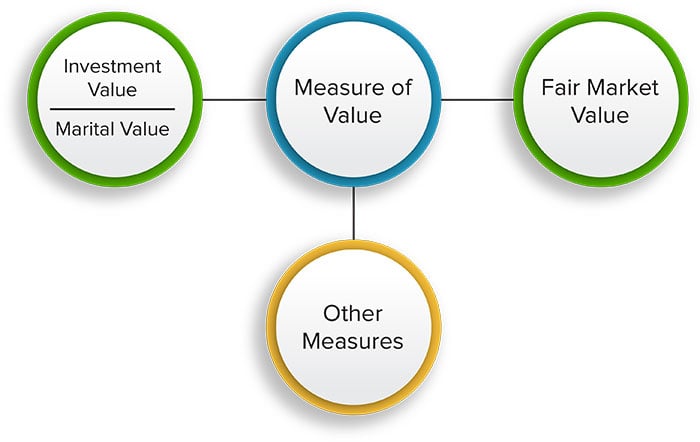
Measure of Value

Methods of Valuation
The measure of value can also be a significant issue in a divorce. The divorce court may use going concern value or investment value. The basis for a divorce court using investment value is based on the idea that the business is not being sold, and the value is that of an investment held by the owner himself (IRMO Hewitson). In other words, what is the value of the business to the operator-spouse.
What Formula or Methodology is Used by a Family Law Court to Value a Business?

Valuation Method: Capitalization of Excess Earnings (Asset Based Approach)

Valuation Method: Capitalization of Earnings (Income Based Approach)
The value may be determined by a number of different formulas, so long as they do not involve speculation, and don’t violate any family law principles. Capitalization of earnings, and capitalization of excess earnings, are the two approaches most often used in Orange County family law matters. A divorce court may also use the market approach for valuation, but the use of this approach presents a number of very significant challenges, including using truly comparable companies for comparison. Rules of thumb approaches are generally not accepted by the Orange County divorce courts, because it is difficult to prove the underlying basis for the rule of thumb formulas (IRMO Honer and IRMO Hewitson). Valuations in Orange County family law cases are quite different than business valuations for other purposes.
A divorce court may also consider prior sales or purchases of interests in the business being valued. This approach can have its own problems, including, that prior sale may utilize the discounted future cash flow method.
In family law, a business cannot be valued using the operating-spouses’ expected future earnings (IRMO Fortier). The widely recognized valuation method referred to as the ‘discounted future cash flow’ method (DCF) is not used in California divorces. The divorce court cannot value a business based on speculation relative to the business’s future success or failure.
Generally, a valuation in a divorce requires an analysis of the business’s financial performance during the past five years. An expert may omit from the average, years or events if they are non-recurring, and if the omission will result in a more accurate view of the normalized financial performance of the business. The five year average may be weighted, depending on the facts and the trends.
How is Goodwill Defined in a Divorce?
Goodwill is defined as the expectation of future patronage. In other words, goodwill is defined as the likelihood that the business will continue to attract customers.
The value of a business is a combination of the net value of the assets of the business (assets minus liabilities) plus the value of goodwill.
Goodwill cannot be based on post-marital efforts of a spouse (IRMO Foster). Goodwill must be calculated using the historical financial performance of a business over a representative period of time, which is generally five years (IRMO Rosen and IRMO Aufmuth).
It is not fair to say that all businesses have goodwill, but goodwill must be addressed and allocated on the marital balance if it exists (IRMO Golden). Business goodwill must be valued and allocated, but at least one repeated case says that individuals do not have goodwill (IRMO McTiernan and Dubrow). A licensed financial advisor’s client list has a value akin to goodwill (IRMO Finby). The divorce court may average valuation methods in arriving at the value of a business (IRMO Webb). Publicly traded companies are valued differently than privately held companies, and divorce courts are not allowed to use publicly traded price earnings ratio in valuing a privately held company (IRMO Lotz).
The terms of a partnership agreement may limit the community’s interest in entity goodwill, under certain circumstances (IRMO Iredale and Cates).
The divorce court may make a non-competition order to protect a spouse’s value in the business that they is buying from the community in a divorce (IRMO Greaux and Mermin).
A potential speculative non-competition agreement cannot be considered in the valuation of a business (IRMO Czapar). A business valuation cannot be adjusted by the hypothetical value of a potential future employment contact (IRMO Duncan).
Is a Business Valued on the Date of Separation?
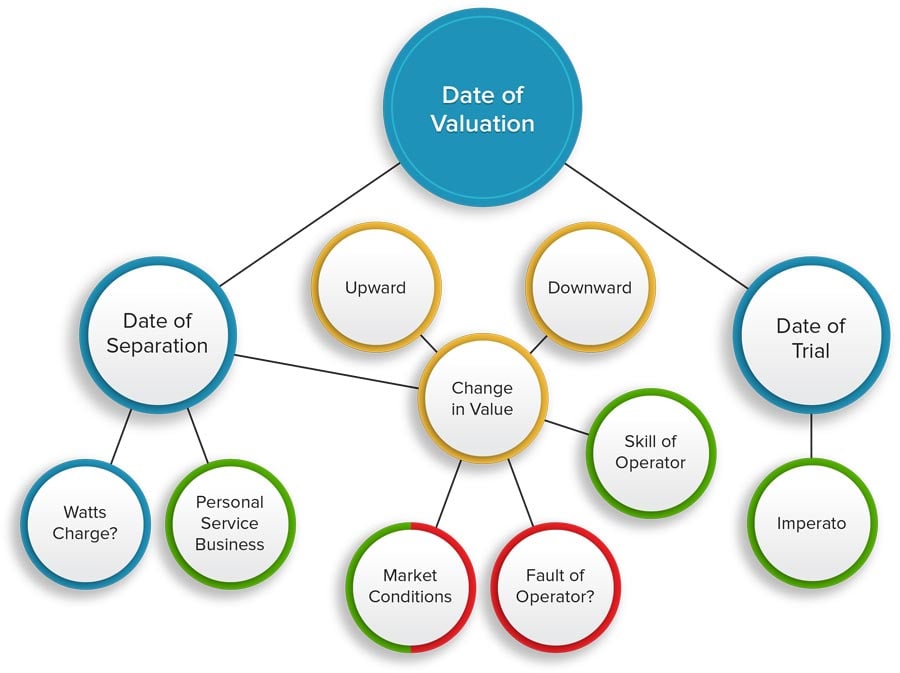
Date of Valuation
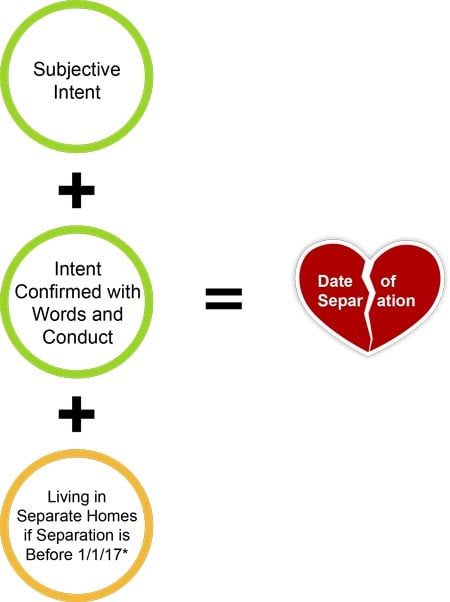
Impacted Issues
The valuation date of a business in a divorce can have a very significant impact on the valuation itself. There is a specific family code section and extensive case law that address the valuation date but generally a business is valued as close to the date of settlement or trial as is reasonably practical. Of course, there are exceptions to this rule. Under some circumstances, a business may be valued on the date of separation. There are, also very specific rules relative to being allowed to present evidence in trial of a valuation date other than the date of trial (IRMO Green, IRMO Duncan and IRMO Stevenson).
Do the Assets of a Business Need to be Valued by an Expert?
It is generally necessary to value the assets of a business. For example, if the business owns real estate, machinery, computers, intellectual property or other tangible or intangible property, experts may be needed to value these assets in that, typically, the valuation expert is not qualified to value the capital assets of the business. Depending on which valuation method is being used, the valuation may also need to address operating vs. non-operating assets. Which are assets that are not needed for the continued performance of the business.
How is Controllable Cash Flow Determined?

Compensation
In family law matters, valuation experts render opinions as to the operating-spouse’s total controllable cash flow. Determining cash flow is not simply looking at the income or tax returns of the operating-spouse.
Income generally does not equal cash flow. A business may recognize significant income but have little or no cash flow in a particular year. On the other hand, a business may make substantial distributions in a year and have little or no income.
The amount of the controllable cash flow can be a significant source of conflict between the experts. Cash flow can be based on the income approach or the distribution approach. Cash flow generally includes the compensation of the operating-spouse, various perks and in certain situations the profits of the business. In divorces there can be an issue as to what portion of the profits could be distributed to the owner without adversely impacting the business operations which relates to the working capital needs of the business. Obviously, profits should not be added to cash flow if it would jeopardize the business’s ability to remain current on its debts and remain solvent.
Economic depreciation (vs. non-economic depreciation) should generally be added back to cash flow.
How is Reasonable Compensation Determined?

Compensation
There are two distinct approaches to determining the reasonable compensation of the operating-spouse. Differences of opinion in this area can lead to very significant differences in the values assigned to goodwill. One approach looks to the annual salary of a typical salaried employee who has similar experience to that of the owner-spouse. The other approach looks to the ‘similarly situated professional’ which is an approach that was addressed in the Orange County divorce case IRMO Ackerman. Using this approach, the divorce court looks at the cost of hiring a non-owner outsider to perform the exact duties as does the owner-spouse. This approach would assume that the individual had the same skill set, same contacts, same work ethic, etc. as the owner-operator. This approach generates a lower goodwill value than does the other approach.
Do Opposing Experts Generally Agree on the Value of Goodwill?
Often times, the opinions of opposing experts are relatively close regarding the adjusted book value of a business but they rarely agree on the value of goodwill. The specific issues that experts generally disagree on are:
- Controllable cash flow;
- Reasonable compensation; and
- Multiplier/CAP rate
How Does a Rate of Return on Tangible Assets Impact the Valuation Methodology?
Calculating a rate of return on tangible assets is a component of the capitalization of excess earnings valuation method. The rate of return varies depending on the expert, the general economic conditions and prevailing interest rates. The rate can be described as the “industry rate,” the “rate of return” that one would expect to earn on the specific assets utilized in the type of business in question or the rate that the owner would have to pay to borrow money at his or her bank. The rate of return is multiplied by the value of the tangible assets and the resulting sum represents the portion of the total earnings of the business attributable to the tangible assets. The remaining portion of the earnings are then theoretically generated by the goodwill of the business itself.
| Total Earnings of Business |
$$$$$$ |
| Industry Rate of Return x Tangible Assets |
< $ > |
| Reasonable Compensation of Owner-Operator |
< $$ > |
| Excess Earnings of Business |
$$$ |
Multiplier / Capitalization Rate Conversion Table
| Multiplier | Capitalization Rate |
| 1 | 1.00 |
| 2 | .50 |
| 3 | .333 |
| 4 | .25 |
| 5 | .20 |
What is a "Multiplier" or "Cap Rate?"
If a capitalization approach is utilized, the excess earnings are multiplied by a ‘multiplier’ or divided by the capitalization rate.
The multiplier/capitalization rate relates directly to the risk of the investment. The riskier the business/industry the lower the multiplier. Consider the case of two businesses, one risky and one secure, each with $50,000 of excess earnings. An investor may only be willing to pay one times earning for the goodwill of the riskier business ($50,000) because the business is less likely to continually return the excess earnings to the investor. Alternatively, an investor may be willing to pay three times earnings for the goodwill of the more secure business ($150,000), because the business is more likely to return those excess earnings to the buyer for an extended period.
Other Factors
As in valuations that are performed in other contexts, collectability of accounts receivable, barriers to entry, management team depth, pending legislation, toxic waste, new competitors, minority discounts, bank covenants and many other issues may be relevant.
Is a Family Law Court Bound by the Terms of a Shareholder Agreement Relative to the Value of a Business in a Divorce?
In determining the value of a business in a divorce, the court may consider the value of a business that was agreed to in a partnership agreement, but are not bound to value the business interest using that value. The value set forth in such an agreement is not controlling on the divorce court (IRMO Slater).
There are a number of issues that a divorce court looks to in resolving this issue. If a spousal consent was executed, the court will determine whether the agreement was executed by the non-operating spouse with the knowledge that the value being agreed to, would establish a value for the business interest in a future divorce. Whether the non-operating spouse was represented by a lawyer at the time of the execution of the agreement can be critical in the analysis. The terms of the agreement may be binding on the partners/shareholders, but not be binding on the non-operating spouse.
Is the Community Entitled to Reimbursement of a Portion of the Increase in the Value of a Separate Property Business?
There is a presumption that an asset acquired during the marriage is community property. This idea generally applies to the acquisition of a business. However, if a business is acquired prior to the date of the marriage it is the separate property of the owner-spouse.
If the business increases in value during the marriage, the community may be entitled to reimbursement of a portion of that increase. It is clear that the rents, issues, and profits of a separate property asset are the separate property of the owner-spouse. The natural improvement of separate property during the marriage retains its separate property status (IRMO Ney). A change in the form of a business (sole proprietorship to a corporation) does not cause a business to lose its separate property status (IRMO Koester). But, if the increase in value is due, in part, to the effort of a spouse, the community may need reimbursement from the business.
Any reimbursement to the community is based upon the equitable principle that a separate property business is required to repay the community for any uncompensated community effort expended on the separate property business during the marriage. Reimbursement is determined by using one of several different theories or approaches.
What is the Pereira Approach?
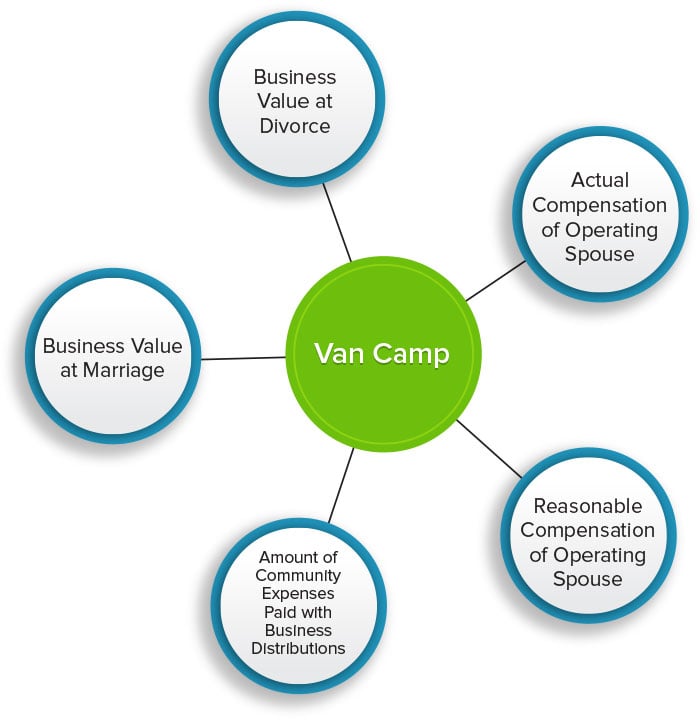
Equitable Allocation Approach
One of the theories, Pereira (IRMO Pereira), assigns to the separate property business a reasonable rate of return on the value of the business as it existed on the date of the marriage, and credits the community with the remaining portion of the increase in value. For example, under Pereira, if a business was valued at $1,000,000 on the date of the marriage, and was valued at $2,000,000 ten years later, the community would need to be reimbursed $1,000,000 minus the interest on $1,000,000 for the ten years. Under this approach, there may exist a conflict over what interest rate is applied to the value of the separate property business between the date of marriage and the date of separation, and whether the interest is simple or compound.
What is the Van Camp Approach?
Another approach, Van Camp (IRMO Van Camp), gives the community a right to reimbursement equal to any under-compensation of the owner-spouse during the marriage, and assigns the remainder of any increase in value to the separate property of the owner-spouse.
Any sums paid, during the marriage, by the separate property business to or for the benefit of the community may be deducted from the reimbursement owed by the separate property business to the community for under-compensation under the Van Camp approach. For example, if the separate property business had contributed $1,000,000 to the community during the marriage, over and above the sums paid to the operator-spouse as compensation, and the amount of under-compensation was $1,100,000, the separate property business would be required to reimburse the community $100,000.
The amount owed to the community under either theory is a right to reimbursement and not an interest in the business itself (Patrick v. Alacer Corp. (Patrick I) and Patrick v. Alacer Corp. (Patrick II)).
Application of either of these theories requires a determination of the value of the business on the date of marriage, and on the date of separation.
Can the Court Use Other Approaches or Theories to Equitably Apportion, Between Separate Property and Community Property, Any Increase in Value of a Separate Property Business?
The family law court may use one theory during a portion of the marriage, and another theory during a different portion of the marriage (IRMO Brandes). The family law court may also use a compromise formula (Todd v. C.I.R.).
Generally, if a separate property company increases in value during the marriage, and the increase is not due primarily to the effort of the owner-spouse, the community is only entitled to reasonable compensation for the work performed by the owner-spouse.
Can a Court Tax Impact the Accounts Receivable?
Should the excess earnings and/or accounts receivable be tax impacted? The impact can be significant to business valuation. Tax impacting relates to attempting to compare apples to apples when valuing C-corporations and S-corporations which are taxed differently. A C-corporation pays tax, while the profits of an S-corporation pays no tax and passes the income on to the owners, who pay the tax. The multiplier and the income stream should both be pre-tax or both be after-tax.
How is a Business Generally Disposed of in a Divorce?
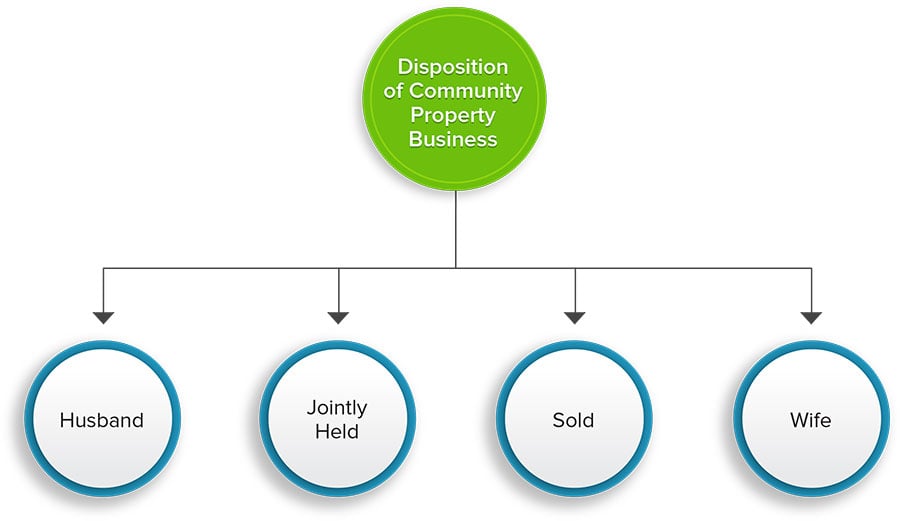
Disposition of the Business
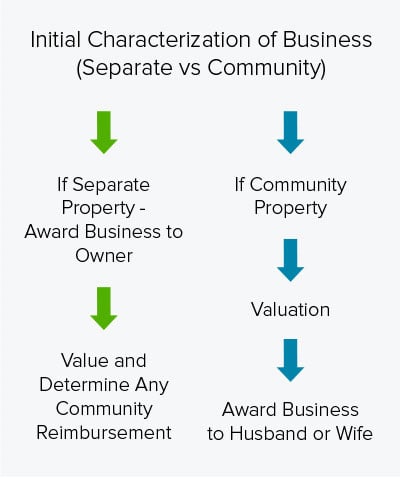
Initial Characterization of Business
It is rare that a business is sold as a result of the divorce. Unless there are very unique circumstances, a business is awarded to the operating-spouse. If the parties operate a business together and both seek an award of the business, it is generally awarded to the party that is most critical to its continued success. It would be rare for a divorce judge to award a business jointly to the parties. Continued joint ownership would most likely occur only if the parties were to agree.
On occassion, the operating-spouse of the business opposes having the business awarded to him. Rarely does a court order a business sold and even more rarely is a business awarded to the non-operating spouse. The operating-spouse often believes that there would be no business without him or her and he or she may be correct. However, to joint ownership in a divorce, that fact is not a determinative factor in the award of a business or the value of the business. Generally, the operating-spouse does not have the option to ‘shut down’ the business without the likelihood of being charged with the value of business as it existed before its closure.
A court may award a business to a party who opposes receiving the business as a part of his or her share of the community property (IRMO Rives).
Do All Divorces with Complex Issues End Up in Trial?
A divorce may involve little to no community property, and cases of this type may be resolved very quickly, inexpensively, and possibly without the services of a divorce lawyer. Other times a divorce may involve extremely complex issues that practically require the involvement of a divorce lawyer and other experts. Cases of this type often resemble business litigation between partners. However, complexity itself does not mean that the matter will involve a trial. Many complex matters are resolved amiably, without the involvement of a judge or a trial.
What is Separate Property?
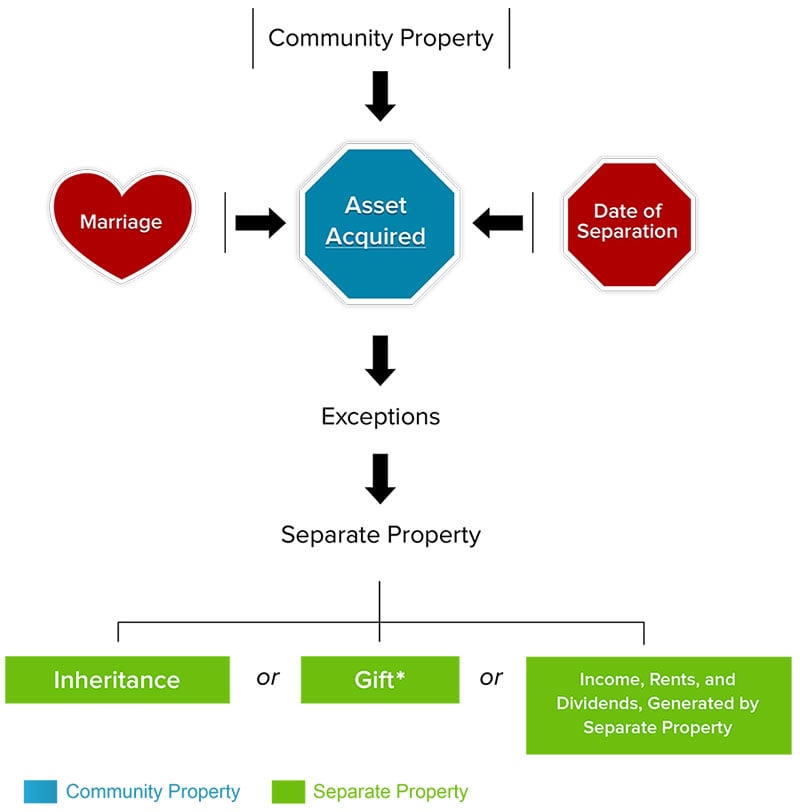
Community Property
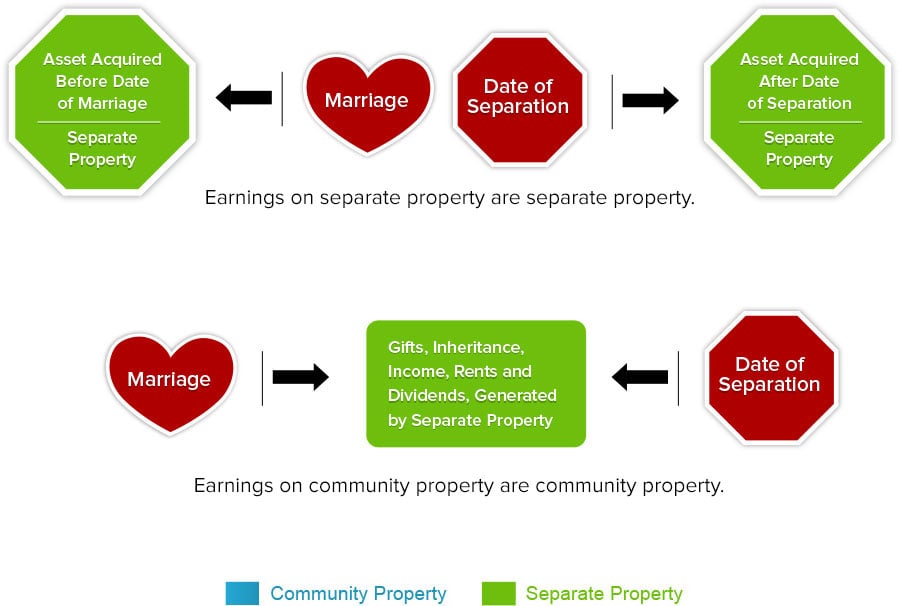
Separate Property
Although defining community property and separate property seems very straight forward, often the issues are extraordinarily complex. Separate property, as defined in California, is an asset owned prior to the date of marriage, acquired after the date of separation, or acquired after the date of marriage and prior to the date of separation by way of inheritance or gift as it is defined by the California Family Law Code. Community property is defined as an asset acquired after the date of marriage and prior to the date of separation, unless the asset was acquired by way of inheritance or gift as it is defined by California law. Income, rents, and dividends generated by separate property are separate property.
Is Tax Relevant to a Divorce Case?
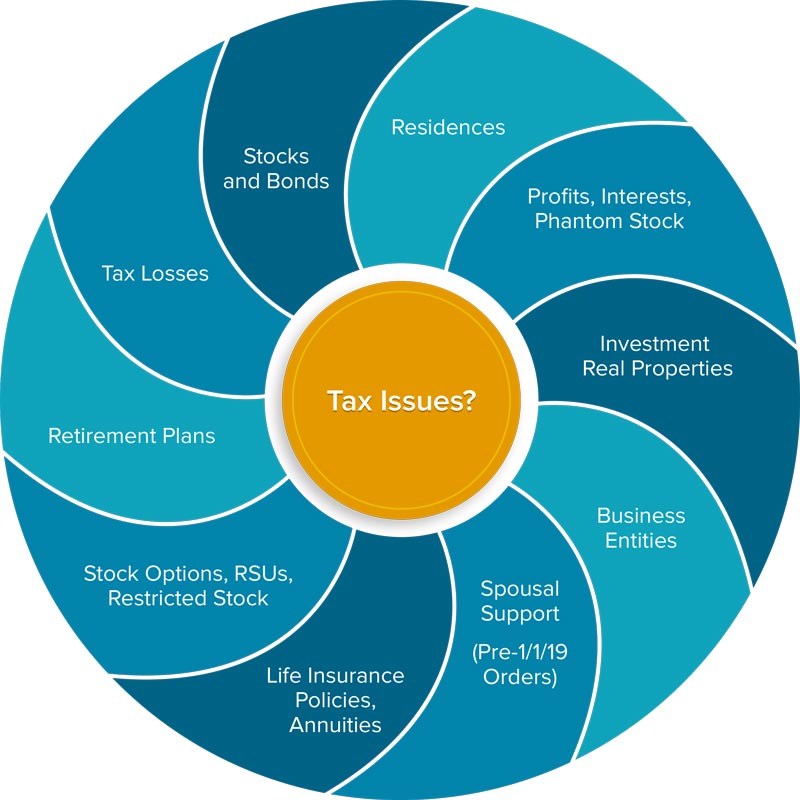
Tax Issues

Tax Issues in Family Law
Tax issues cannot be ignored. Often, tax issues are not identified until it is too late to manage or structure around them. Tax is yet another area of sophistication that must be addressed in a divorce. Tax plays a role in many, if not most, divorce cases. Divorces involve income and assets that frequently have tax related issues.
Tax issues may impact the actual values of many asset categories and decisions as to whether an asset is desirable to a party. The following issues and assets should be analyzed early in the divorce.
Tax rules and regulations must be strictly adhered to in order to avoid additional tax, penalties, and interest. The Internal Revenue Code (IRC) is a minefield in enemy territory, but the IRC provides a map detailing the exact location of the explosives. Unless you are familiar with the IRC, you run the risk of unexpected and costly surprises.
Can a Family Law Court Deduct Embedded Taxes in an Asset When Dividing Community Property?
Embedded capital gains tax relative to an asset are not deducted from the fair market value of the asset in a divorce. The deduction of the tax from the value of an asset in a divorce is limited to situations where the tax is immediate, specific, and arising out of the divorce itself. If an asset is being awarded to a party in a divorce, and that asset is not being sold pursuant to the divorce judgment, there is no deduction from fair market value relative to the tax. Speculative, future tax consequences are irrelevant to the valuation of assets, if the value is determined by the divorce court in a trial. The one exception is tax related to stock options. This exception is due relates to the fact that stock options have no intrinsic value unless and until they are exercised, as opposed to other assets whose value is not dependent on a sale. There is also an issue as to whether the divorce court should tax impact earnings in the valuation of a business.
What Factors Do the Courts Analyze in Characterizing and Valuing Retirement Plans?

Two Basic Types of Retirement Plans
California divorce courts characterize and value retirement plans in a divorce based upon these and other factors depending on the details of each specific plan:
- Type of plan;
- Increase in plan value during the marriage;
- Contributions to the plan during the marriage;
- Specific contractual terms of the plan;
- Performance of plan assets;
- Age of the employee;
- Years of employment before and after the marriage;
- First possible retirement date; and
- Survivorship options
California divorce courts generally allocate retirement plan benefits between separate property and community property according to when the benefits were earned. Benefits “earned” during the marriage (after the date of marriage and before the date of separation) are generally characterized by divorce courts as community property. Benefits “earned” before the date of marriage or after the date of separation are generally characterized as separate property. Complications may occur relative to dividing the earnings of the plan assets, when records are missing, when valuing a defined benefit plan and when drafting a Qualified Domestic Relations Order.
How Are Stock Options Divided?
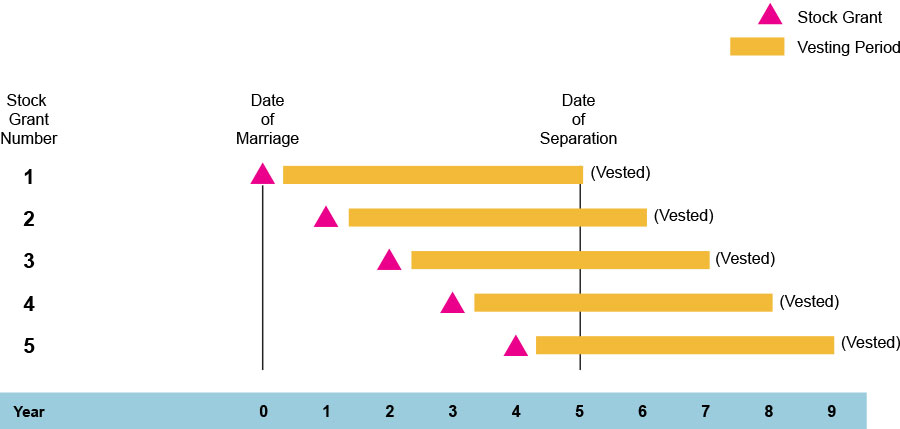
Cliff Vesting
In a California divorce, stock options and similar assets granted during the marriage and/or partially vested during the marriage may have a community property component. Stock options that are earned partially during the marriage are allocated between community property and separate property. The foundation for the allocation is the community property presumption that provides that “earnings” during the marriage are community property. If a spouse is compensated during the marriage, in part, with a grant of stock options that partially vest during the marriage, the stock options will most likely be partially community property. If a spouse’s employment during the marriage results in partial vesting of stock options granted before the date of the marriage, the options will also most likely have a community property component. The number of options allocated between separate property and community property can vary depending upon which formula is used.
What Factors Does a Family Law Court Analyze in Determining the Characterization of Equity and Reimbursements Relative to Real Property?
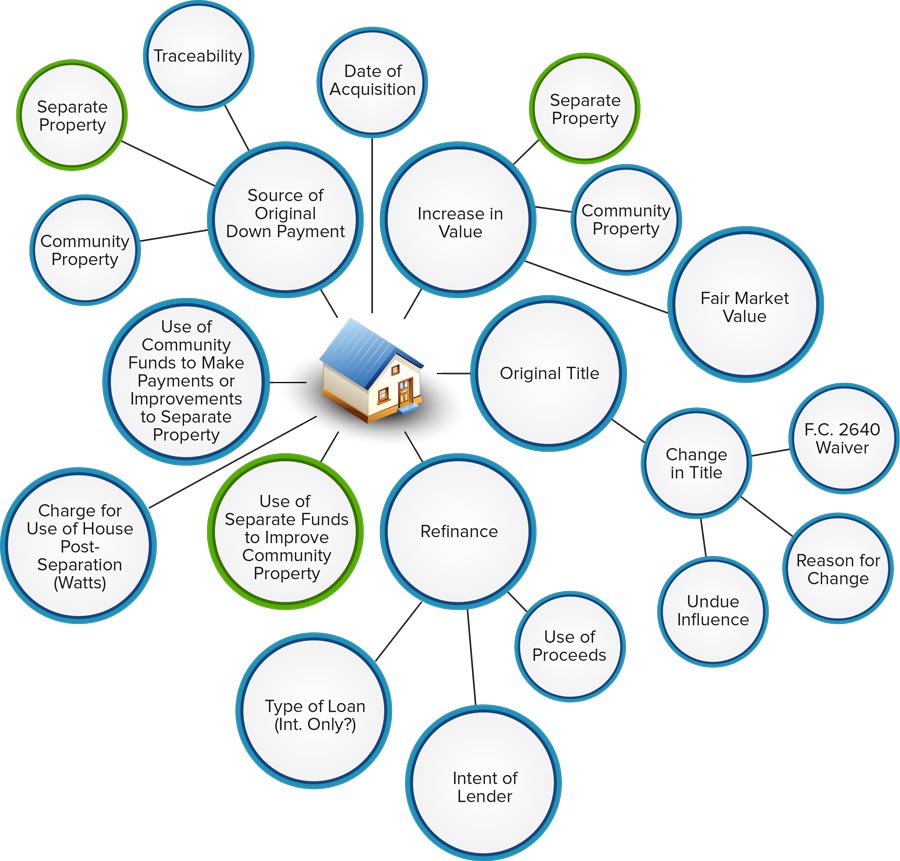
Real Property Issues and Factors
California family law courts allocate the increase in equity in real property during the marriage to the community and/or the separate property of the parties based on a number of factors:
- Changes in title
- Date of acquisition
- Source of funds used for acquisition, improvements and/or principal payments on a loan
- Increase in value
- Refinancing
Can the Community Acquire an Interest in the Separate Property House of One Spouse?
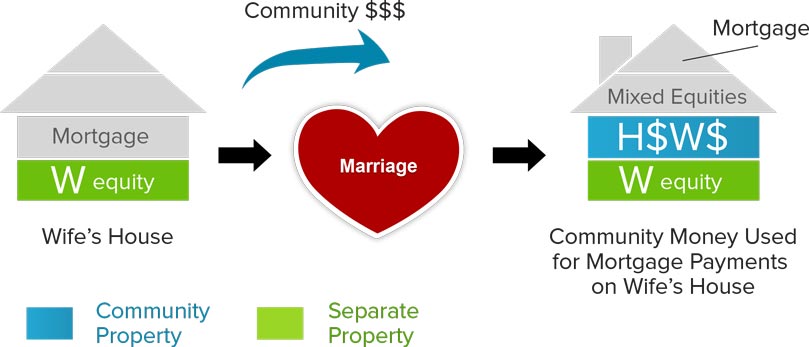
Community Money Used For Separate House
California family law dictates that the community may acquire an interest in real property if community funds are used to make principal payments on a mortgage secured by a residence owned solely by one spouse (IRMO Moore/IRMO Marsden). Payments on an interest only loan do not create a right to reimbursement or an ownership interest in the property.
If community money is used to improve a separate property property, there may be a right to reimbursement.
Does Placing the Other Party's Name on the Title of a Separate Property Home Constitute a Gift of One-Half of the Equity in the Home?
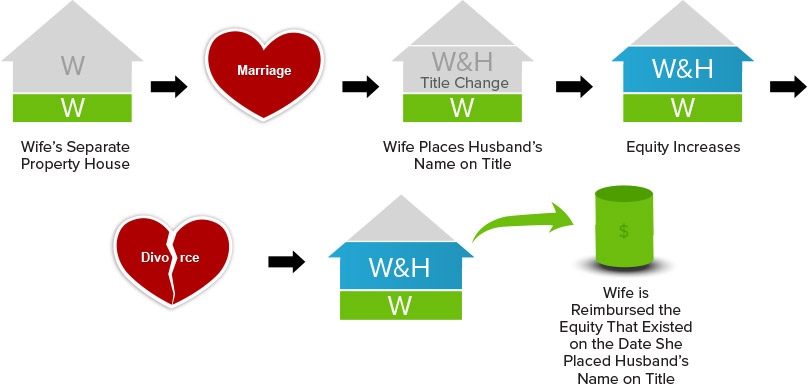
Title Changed
The amount of equity that exists on the date the owner-spouse places the other spouse’s name on title to his or her separate real property will generally remain his or her separate property (without any appreciation or interest) unless a specific waiver of Family Code Section 2640 is made. In other words, if, on the date the property is transferred into joint names, the equity equalled $500,000, the party who originally owned the property would receive the first $500,00 of equity in the property upon divorce unless that party executes a Family Code Section 2640 waiver.
If One Party Uses His or Her Separate Funds for the Down Payment on a Jointly Titled Home Is That Party Reimbursed?
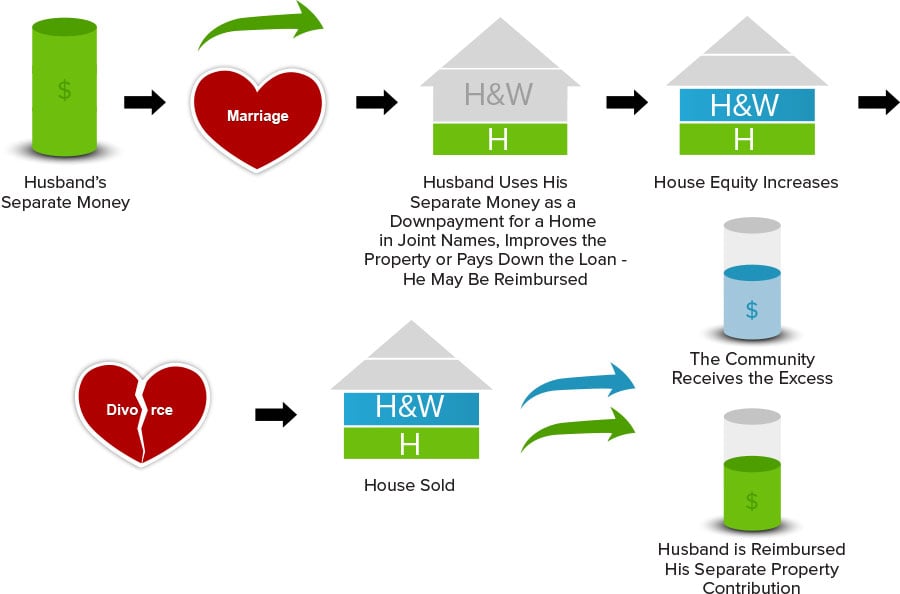
Separate Money Used Re: Joint House
If a party uses his or her separate funds to acquire real property in joint names, or pay down the loan on jointly owned real property, he or she may be reimbursed if that party can trace the separate funds back to a separate property bank account or prove the facts in some other way. Reimbursement of separate funds used to improve real property in joint names is generally limited to the increase in value resulting from the improvement to the property paid for with separate funds.
Can Reimbursement Rights Apply to Separate Property That is Traced Into the Purchase of Multiple Properties?
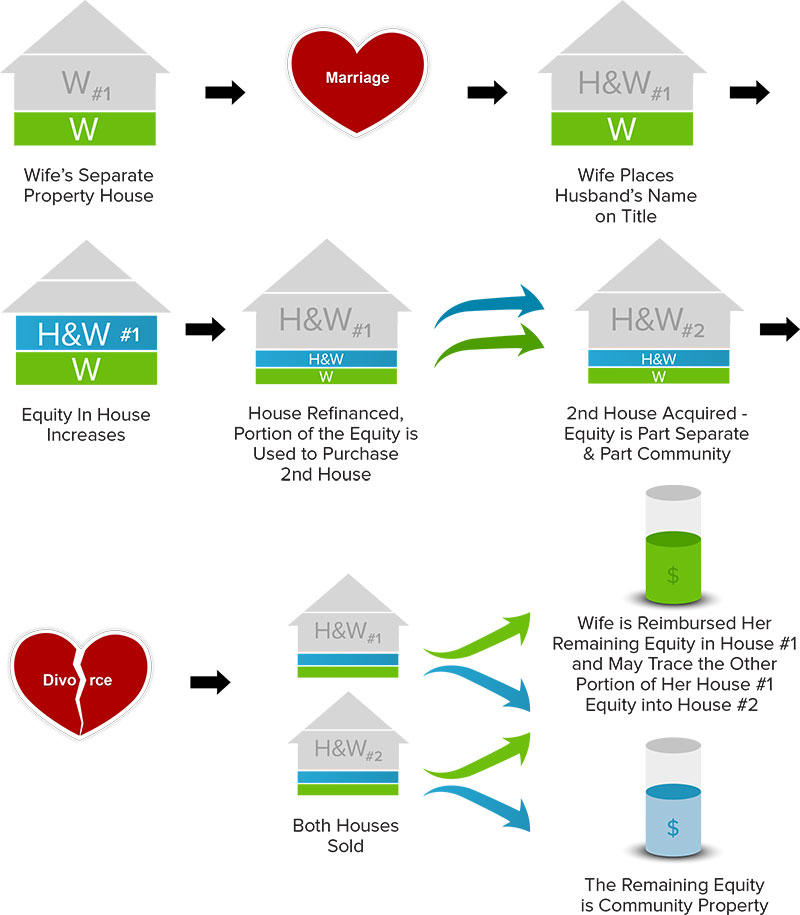
Refinance
If an asset is purchased with funds obtained through the refinance of a jointly owned house that was originally the separate property of one spouse, upon divorce, that spouse may be reimbursed the equity that existed on the day the house was transmuted into joint names. If the spouse who originally owned the first house as separate property can trace the equity that they had in the first house that was accessed through a refinance and used to buy a second house, that party may be entitled to reimbursement (IRMO Walrath).
In other words, if a wife owned a home before the date of marriage and added the husband’s name on the title at a time when the equity in the home equaled $1,000,000, she could be reimbursed the portion of that $1,000,000 obtained from a refinance, if it was used to buy another home and she could trace the transaction.
What is Tracing?
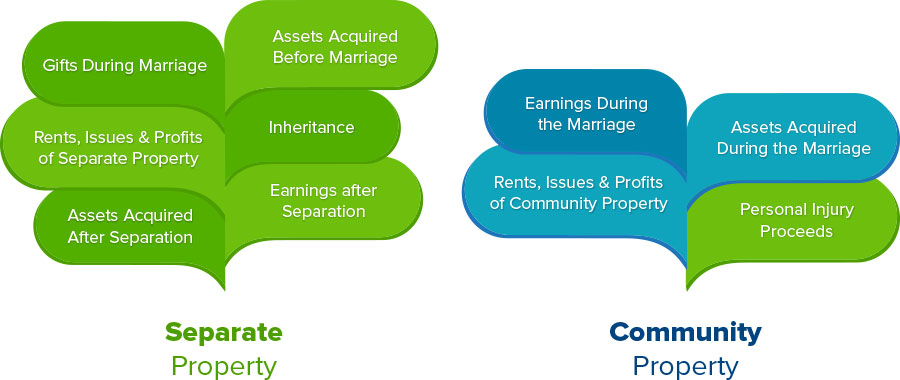
Direct Tracing
Tracing may be used to uncommingle bank or brokerage accounts and to trace separate funds used to purchase an asset that is titled in joint names. Tracing is also used relative to certain reimbursements to the separate property of one spouse or to the community.
Is There More Than One Type of Tracing?
There are two basic types of tracing:
- Direct Tracing Method (mechanical tracing)
- Family Expense (Recapitulation) Method
Tracing can be used to benefit either the separate property of one spouse or the community. Tracing can be very expensive and a party generally will not know if the tracing will be successful until after it is complete.
The court has the authority to allow tracing that does not totally comply with the traditional tracing rules so long as it does not rely on speculation and does not violate any other family law principles.
What is Direct Tracing?
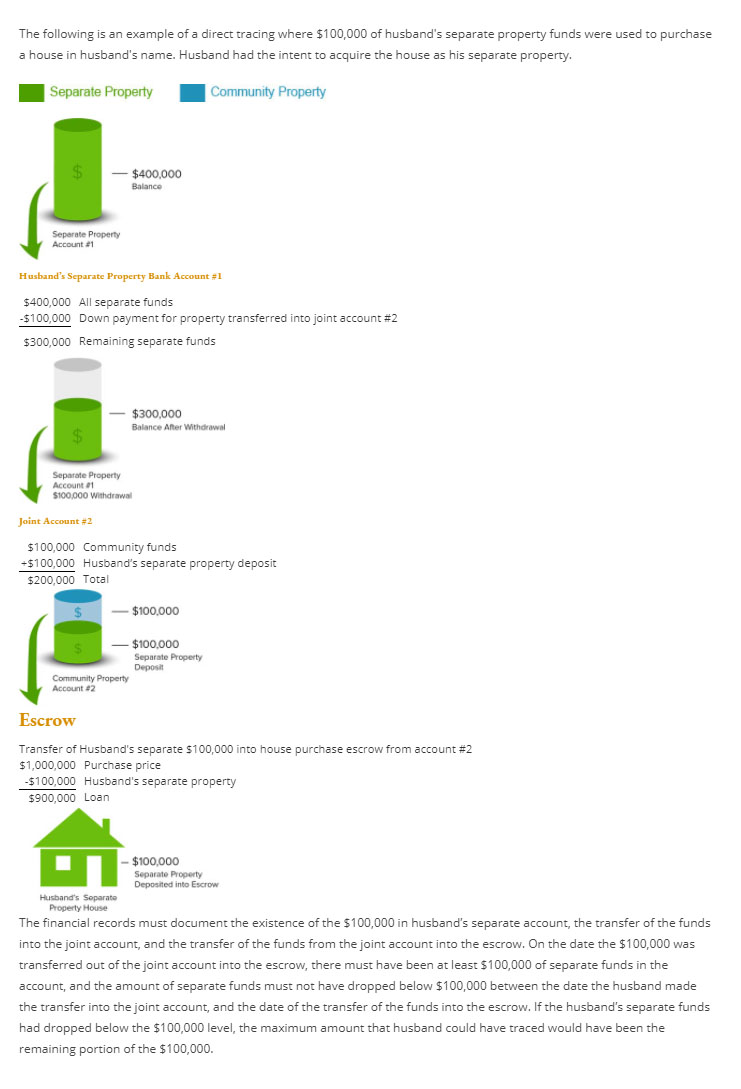
Direct Tracing Example
The Direct Tracing Method is the favored method of tracing. Direct tracing requires the transaction by transaction tracing of funds from a separate bank account or source into the purchase transaction. The separate funds must be shown to have been present in the bank account on the date when the purchase transaction occurred. There may be additional factors that come into play for the tracing to be successful. If separate funds were transferred into a community account prior to the purchase transaction, each transaction occurring between the deposit and the subject transaction must be analyzed. Specific detailed tracing requirements must be met.
For example, if a husband was attempting to trace $100,000 into a real estate purchase escrow account the tracing exercise could look like the steps set fourth below. The documents must show the existence of the $100,000 in husband’s separate account, the transfer of the funds into the joint account, and the transfer of the funds from the joint account into the escrow. On the date the $100,000 was transferred out of the joint account into the escrow, there must have been at least $100,000 of separate funds in the account, and the amount of separate funds must not have dropped below $100,000 between the date the husband made the transfer into the joint account, and the date of the transfer of the funds into the escrow. If the husband’s separate funds had dropped below the $100,000 level, the maximum amount that the husband could have traced would have been the remaining portion of the $100,000.
What is Family Expense Tracing?
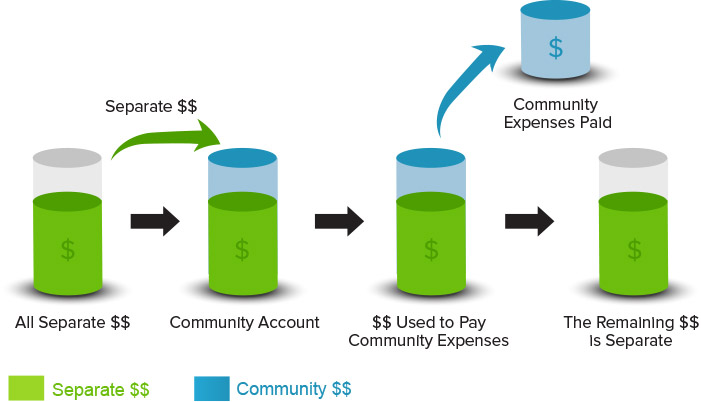
Family Expense (Recapitulation) Tracing
The second method of tracing is referred to as the Family Expense or Recapitulation method. This method may be used when the records that would prove the tracing do not exist to complete a direct tracing and the unavailability of the records is not the fault of the party seeking to trace his or her separate property.
The divorce court may conclude that the asset in question was purchased with separate funds, if the party can prove that at the time of the purchase transaction, there were no community funds available to make the purchase. This may be proven by demonstrating that the community expenses at the time of the transaction equaled or exceeded the community income, thus showing that there could not be community funds in existence.
Community expenses paid with funds from a commingled (containing community and separate funds) account are presumed to be paid with the community funds contained in the account, as opposed to one spouse’s separate funds contained in the same account. This rule is referred to as the “community expense presumption.” In other words, the community funds in a commingled account are used first, if the expenditure is for community expenses.
Is a Trial in a Divorce Case Similar to a Trial in Other Areas of Law?

Evidence, Presumptions and Privileges
Family law is made more complex than is generally thought because the courts follow the Evidence Code and the Code of Civil Procedure.
A trial in a divorce case is not dissimilar to a trial in other civil or business litigation with the exception that divorce cases do not involve a jury. The California Code of Civil Procedure and the Evidence Code must be followed. Trials may be very complex proceedings that are often lost due to a lack of understanding of procedural rules or the rules of evidence.
Do Divorcing Parties Owe Each Other the Same Duties That Partners Owe Each Other?

Fiduciary Duties
Fiduciary duties owed by each party to the other require full disclosure of all relevant material facts, and information regarding both community and separate property assets and debts. There may be harsh penalties for breaching these duties.
Parties to a divorce should be prepared to make voluntary, full and immediate financial disclosures to their spouses, as required by their fiduciary duties. The fiduciary duties require each party to act with the utmost good faith toward the other. Both spouses are bound by fiduciary duties to one another during marriage, until the divorce has been finalized and the property is divided. Sections 721(b), 1100(e), and 2100(e) of the California Family Code set forth the rules and requirements. Essentially, these are the same fiduciary duties that are set forth in the California Corporations Code. Divorcing spouses are treated like business partners in this respect.
What is Involved in the Valuation of a Business in a Divorce Case?

Initial Characterization of Business
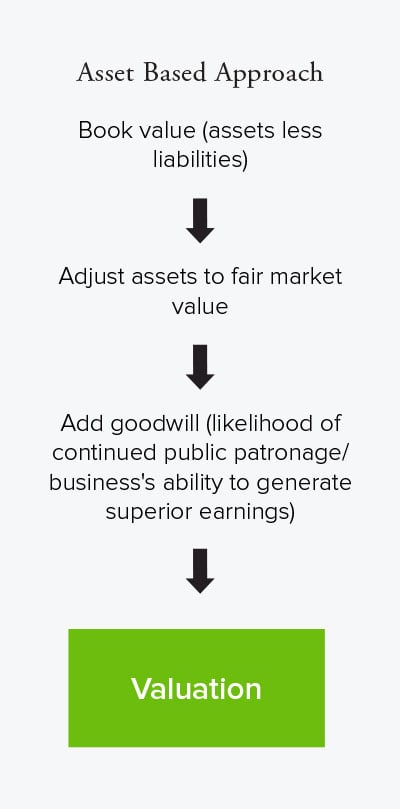
Asset Based Approach
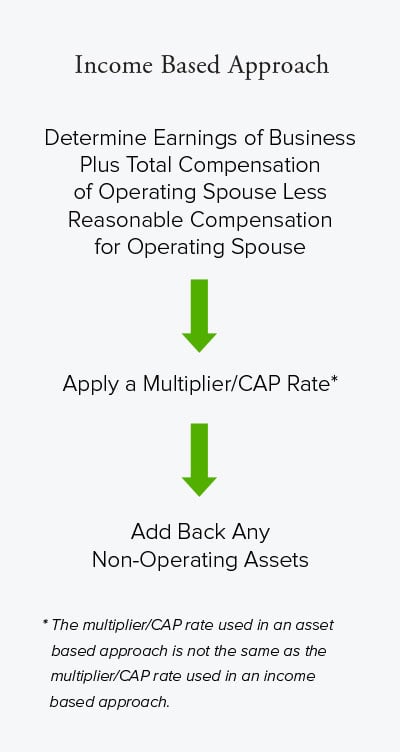
Income Based Approach
The State Bar of California recognizes divorce as a specialized practice area. Representing clients in divorces that involve the valuation of business interests is even more specialized. Handling these matters requires a working knowledge of family law valuation principles, taxation, compensation issues, accounting principles, general foundational business knowledge, and the complex and conflicting divorce valuation, case law, and divorce litigation practicalities.
Representing a party in a divorce involving a business interest requires the retention of a divorce business valuation expert. They can be invaluable in negotiation and reaching a settlement, as experts often collaborate to reconcile differences in their findings and opinions. In many cases the divorce court will actually order the accountants to meet and confer long before the trial to attempt to resolve their differences.
How is Goodwill Calculated in a Family Law Matter?
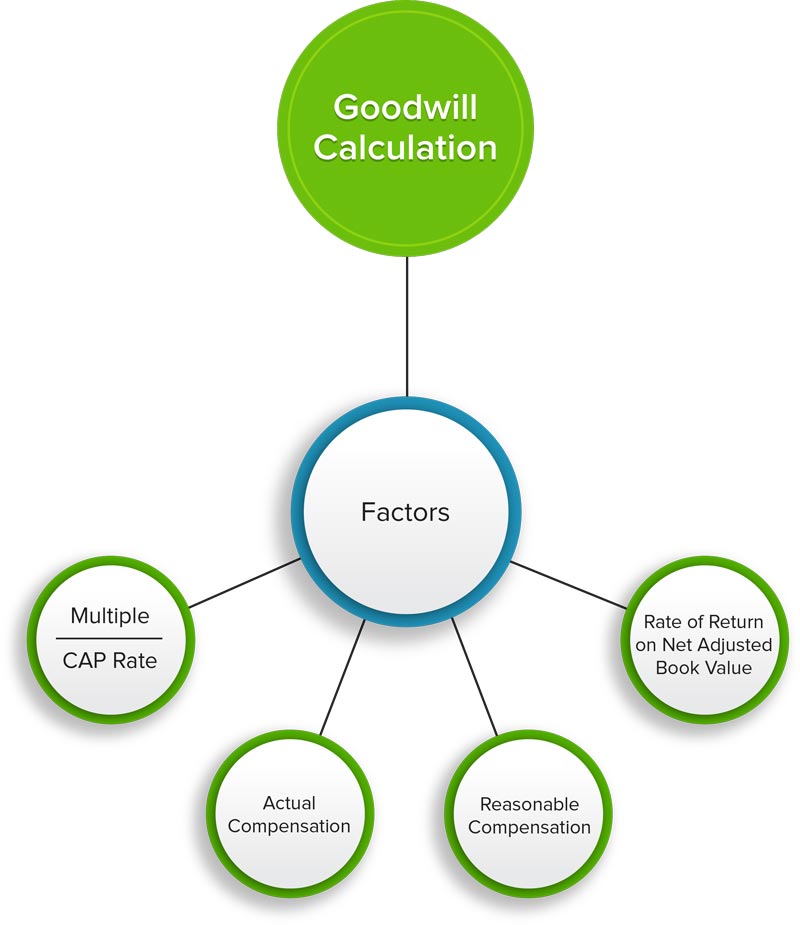
Goodwill
In arriving at a goodwill value, the following factors, are considered: total compensation of operator-owner, reasonable compensation, rate of return on tangible assets, and multiplier/ capitalization rate.
Are There Situations Where the Community is Credited With or Reimbursed a Portion of the Other Party's Separate Property?
When community and separate property, money and/or services are commingled, there may exist an issue as to whether the asset is separate, community or mixed. A family law court may be asked to apportion an increase in the value of an asset between community property and the separate property of one party in an equitable manner. There may also exist an issue as to whether there is a right to reimbursement relative to the separate or community estate. The determination of these issues is fact driven. Gray areas are often decided in the divorce courts in favor of the community. These issues are often determined based on which party has the “burden of proof.” There are presumptions that favor the community estate and there are presumptions that favor the separate estate. Some presumptions may be overcome with evidence. Family law courts may be required to rule on characterization and apportionment issues relative to bank accounts, brokerage accounts, stock options, businesses, real estate and many other assets.
An example of equitable apportionment may exist when, during the marriage, when a spouse works in his or her separate property business that increase in value during the marriage. The community may be entitled to a portion of the increase in value of the business during the marriage.
How Do Parties Resolve Custody Disputes if They Cannot Reach an Agreement?
If the parties cannot arrive at an agreement resolving all custody and visitation matters, the family law court will make the necessary decisions, including physical custody and legal custody. These orders are made after a hearing or trial, at which the parties’ other witnesses may testify. The court may make orders regarding a variety of other related matters, like education or the relocation of a child’s residence.
Does a Divorce Lawyer Need Specialized Skill and Training to Competently Handle Child Custody Matters?
Competently handling child custody disputes requires an Orange County divorce lawyer with a number of different and distinct lawyering skills. Handling child custody matters is very different than handling a business valuation issue. To be effective in child custody matters, a divorce lawyer must be a skilled trial lawyer and be knowledgeable about the nuances of child custody law. A divorce lawyer must be intimately familiar with the statutes and case law related to child custody and move away matters. It is critical that a divorce lawyer stay current on the statutes and cases, as they change frequently and often without notice. Changes may be minor, but any change can impact the outcome of a child custody case dramatically. An Orange County divorce lawyer must also be conversant with the many issues that relate to Evidence Code Section 730/Family Code Section 3111 child custody evaluations, and the psychological testing that is utilized in the evaluation process.
Do All Courts Handle Child Custody Matters the Same Way?

Evidence, Presumptions and Privileges
A divorce lawyer must be acutely aware of the way the judges view child custody issues. Judges are people and different people, have different philosophies about child custody, move away issues, Evidence Code Section 730/Family Code Section 3111 evaluations, parenting, etc. The various branches of the Superior Court in the State of California are not uniform in the area of child custody litigation. There are distinct differences between the counties as to how child custody and child visitation matters are determined.
Do the Minyard Morris Divorce Lawyers Handle Cases in Other Counties?
Our Orange County divorce lawyers believe that it is in a client’s best interests to be represented by a divorce lawyer whose practice is located in the county where the child custody case is filed. In other words, we do not believe it is in a client’s best interest for an Orange County divorce lawyer to accept a child custody case filed in Los Angeles, or vice versa. There is significant value in having a lawyer who is familiar with the local court’s practices, philosophies, and rules. Logically speaking, would a parent in a child custody dispute rather be represented by a lawyer who spends 100% of his time in the Orange County courts, or in several different counties?
Does a Child Custody Lawyer Need to Be a Skilled Trial Lawyer?
A divorce lawyer must also be an experienced and proficient litigator. It is essential for the divorce lawyer to be intimately familiar with the rules of evidence, burdens of proof, and privileges that relate to child custody litigation, in order to avoid potentially disastrous results in trial. A child custody trial is a trial, not a conversation with a judge. If a divorce lawyer is not competent in the area of evidence, they may be unable to present crucial facts to the divorce court. If the court sustains an evidentiary objection, that means the answer to the question will not be heard by the court. A skilled divorce lawyer may be able to prevent the other party from testifying on the most important parts of the case. In other words, a divorce court may not ever hear the story that needs to be told. The divorce court will not have the opportunity to make an informed decision regarding child custody if it does not hear all of the facts.
Is There a Value to a Client Being Represented by a Large Family Law Firm?
It is a significant advantage to our clients that our Orange County divorce lawyers collaborate as a team on unique child custody and visitation matters. Generally, we meet as a team three times each week to brainstorm and strategize our clients’ unique cases. These meetings are not informal chats, they are formal meetings with specific agendas. Our clients do not hire one lawyer, they hire the entire firm. Our firm has over 200 years of combined Orange County legal experience that is leveraged for the benefit of our clients. It would be difficult, for a team of experienced divorce lawyers who limit their practice to Orange County family law matters not to create a better approach and strategic plan for child custody negotiations or litigation than would result from a one-man band or its equivalent.
When Should a Client Expect to Hear a Divorce Lawyer's Detailed Analysis of Their Child Custody Matter?
A client should expect their divorce lawyer to be beyond candid, and explain to them the strengths and weaknesses of the case, and the probable outcome of litigation at the first attorney-client meeting and at every stage during the process, as new facts unfold. A client should have the opportunity to make informed and timely decisions about their children. Our Orange County divorce lawyers are known for telling our clients the good, the bad, and the ugly about child custody matters – early and often. Clients deserve to hear the truth, not a sales pitch.
Should Clients Attempt to Settle Their Child Custody Disputes?
Child custody litigation is not the preferred way to resolve child custody disputes. The parties should take all actions reasonably appropriate to resolve child custody conflicts between themselves. Litigation is expensive, time consuming, unpredictable, and often results in long term conflict with the other party. Continued conflict is never in the best interests of a child. Before engaging in child custody litigation, one should carefully evaluate whether the likely level of emotional damage caused to a child and oneself in litigation will be significantly less than the emotional damage resulting from a compromised settlement. Before a party engages in child custody litigation, they should be carefully analyze the likelihood of prevailing. The definition of a win should be carefully analyzed, as well. For example, is it a win for a party to receive one additional custodial day every two weeks? Significant time should be spent doing a cost benefit analysis. Parties should only elect to fight a child custody battle, if they believe there is no realistic alternative.
Are All Child Custody Lawyers Created Equal?
If a party elects to engage in child custody litigation, the selection of the Orange County divorce lawyer should be made very carefully. The selection of the right divorce lawyer can often be the difference between a victory and a loss. Use common sense in determining who to hire. Study a lawyer’s website, evaluate their reviews to assess their credibility, and most importantly, interview the specific lawyer who will try your case, if your matter goes to trial.
What Are the Different Phases of Child Custody Litigation?

Potential Sequence of Procedural Events in Child Custody Litigation
Child custody litigation may involve many different events, steps and stages. Temporary child custody orders are made at the Request For Orders (RFO) stage. Significant written discovery and depositions may be necessary, and experts may be retained before permanent orders are made at the divorce trial.
Can Child Custody Impact Other Parts of a Divorce?
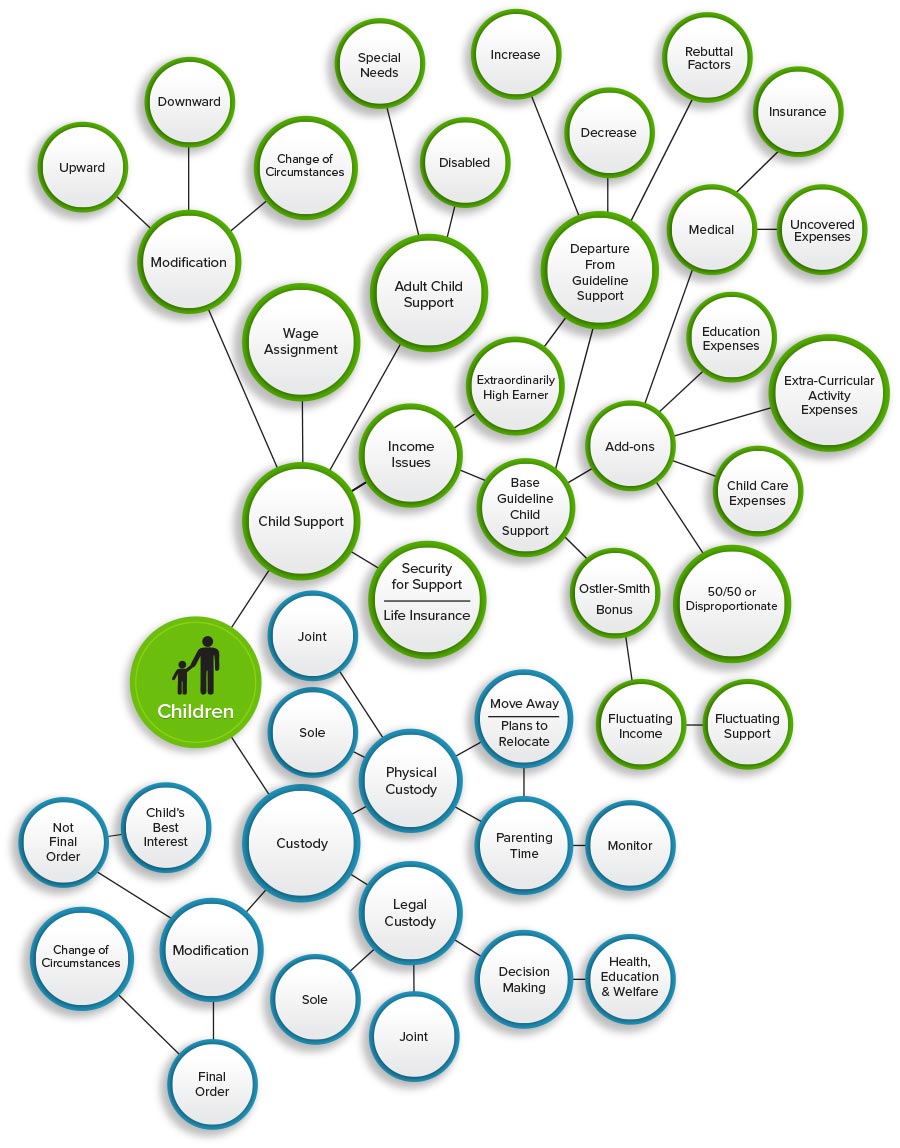
Family Law Interconnectivity Overview – Children
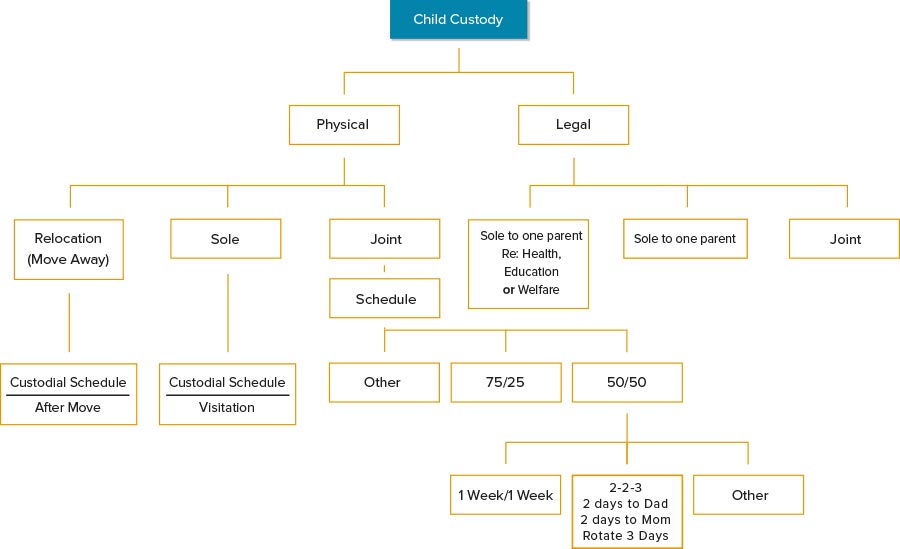
Child Custody Decision Tree
A child custody case is not simply establishing a time-sharing schedule. Child custody issues and orders may impact whether a parent can relocate to obtain a better job. Child custody orders relate directly to the amount of child support ordered, and other related issues. As the time share percentage of the payor decreases – child support may increase. As income of the payor increases – child support increases. The terms of a child custody order, and the amount of child support, may impact decisions as to whether to retain the family residence. Retaining a family residence may impact decisions about seeking an award of other assets.
There are many decisions that must be made relative to child custody matters. A person should have all of the relevant facts before making decisions about the children. The analysis should be made with a person’s divorce lawyer, therapist, and advisors. Many decisions relative to child custody impact other decisions related to child support, property division, etc. Careful consideration should be given to personal preferences, every day practicalities, and the children’s short term and long term best interests.
How Does Legal Custody Differ From Physical Custody?

Physical and Legal Custody
Legal child custody addresses the right and responsibility to make decisions regarding a child’s health, education, and welfare. Parties are generally awarded joint legal child custody in Orange County Superior Court.
In unique situations, a family law court may award legal child custody to one parent in a designated area: education, extra-curricular activities, or medical issues. This type of child custody order may be made when the parties have a history of high conflict in one of these specific areas, and have demonstrated an inability to co-parent.
Most courts in Orange County are reluctant to make orders designating which school a child should attend, and courts will often award legal child custody to one parent on educational issues and authorize that parent to make the school selection decisions.
Physical child custody addresses where a child resides.
Parties may have joint or sole legal child custody and physical child custody.
What is Legal Child Custody?

Physical and Legal Custody
Legal child custody addresses the right and responsibility to make decisions regarding a child’s health, education and welfare. Parties are generally awarded joint legal child custody in Orange County Superior Court.
In unique situations, a family law court may award legal child custody to one parent in a designated area: education, extra-curricular activities or medical issues. This type of child custody order may be made when the parties have a history of high conflict in one of these specific areas and have demonstrated an inability to co-parent.
Most courts in Orange County are reluctant to make orders designating which school a child should attend and courts will often award legal child custody to one parent relative to educational issues and authorize that parent to make the school selection decisions.
What is Physical Child Custody?
Physical child custody addresses where a child physically resides, and the parenting time of each parent. A physical child custody order determines which parent has supervision rights and responsibilities for the child during designated periods. The parties may be awarded joint physical child custody, or physical child custody may be awarded to just one party. Joint physical child custody does not necessarily mean equal time sharing. A 70/30 time share could be labelled joint child custody. The parties may be awarded joint physical child custody, with one parent being designated as the primarily custodial parent.
Divorce courts in Orange County rarely split sibling’s between the parents. It is generally believed that it is in the sibling’s best interests to live together.
Is Child Custody Mediation Required in Contested Orange County Family Law Matters?
Before any contested child custody matter may be presented in a divorce court, the parties must attend court mandated child custody mediation. If one of the parties fails to attend the child custody mediation, the custody consequences may be sanctions and/or a delay in the proceedings. In Orange County, child custody mediation is confidential and the results of the child custody mediation are not reported to the judge unless a child custody agreement is reached. The rules are different in other counties.
Divorce lawyers do not accompany the parties in the child custody mediation sessions.
It is important to speak with an Orange County divorce lawyer prior to the child custody mediation in order to understand the process, purpose, goals and most likely result in court if an agreement is not reached in mediation.
It is critical to understand that an agreement is reached in mediation, that agreement will likely be the order that will control custody for years to come. Although child custody orders can be modified, it is not always easy to do so. The child custody mediator will report any agreements to the Orange County family law Judge assigned to the case.
If a party cannot attend the mediation, he or she must telephone the mediation office and reschedule the appointment.
What is Child Custody Mediation?
Before any contested child custody matter may be presented in a divorce court, the parties must attend court mandated child custody mediation. If one of the parties fails to attend the child custody mediation, the custody consequences may be sanctions and/or a delay in the proceedings. In Orange County, child custody mediation is confidential and the results of the child custody mediation are not reported to the judge unless a child custody agreement is reached. The rules are different in other counties.
Divorce lawyers do not accompany the parties in the child custody mediation sessions.
It is important to speak with an Orange County divorce lawyer prior to the child custody mediation in order to understand the process, purpose, goals and most likely result in court if an agreement is not reached in mediation.
It is critical to understand that an agreement is reached in mediation, that agreement will likely be the order that will control custody for years to come. Although child custody orders can be modified, it is not always easy to do so. The child custody mediator will report any agreements to the Orange County family law Judge assigned to the case.
If a party cannot attend the mediation, he or she must telephone the mediation office and reschedule the appointment.
Will the Divorce Courts Allow Parents to Design Their Own Custody Schedules?
The parties may agree to resolve their differences in child custody and child visitation matters. If the parties reach an agreement, they are not required to attend a court mandated child custody mediation. The Orange County divorce court will sign a child custody stipulation, and rarely questions the parents’ decisions in these matters.
Can Parents Agree to Non-Modifiable Child Custody Orders?
The divorce court will not honor an agreement between the parties that designates a child custody agreement as non-modifiable. The divorce court always retains jurisdiction to modify all aspects of child custody orders.
In other words, the parties cannot prevent the divorce court from making orders in the future that modify the terms of their child custody agreement (IRMO Goodarzirad).
The parties cannot deprive the court of its ability to allow one party to relocate with a child (IRMO Abrams)
Do Parents Have Discretion in Developing a Parenting Plan?

Child Custody / Parenting Plan Models
The parties may agree to a child custody parenting plan that is appropriate for their circumstances. If they do not agree, the divorce court will set the parenting plan that they believe is in the child’s best interest.
The objective in designing the custodial schedule is to meet the needs of the child and the parties. The practicalities of a child’s schedule and work schedules of both parties can make creating a mutually acceptable child custody time share schedule problematic. It is critical to understand that although each party’s work schedule and needs may change, once an agreement is reached, it is not easy to modify.
What Factors Do Family Law Courts Evaluate When Making Child Custody Orders?
Divorce courts look at many different factors relative to making its child custody orders including the factors set for the below:
- Age and maturity of child
- Child’s preference
- Health, education, and welfare of the child
- Relocation of child’s residence
- Mental/emotional disorders of a parent or child
- Special needs of the child
- Cooperation or lack of cooperation between the parents
- Domestic Violence
- Work schedules of the parents;
- Parenting skills
- Relationship between the child and each parent
- Educational needs of the child
- Cultural factors
- Criminal activity
- Parental support systems
- Parent’s willingness to promote continuous and frequent contact with the other parent
- Drug use
Can a Family Law Court Base a Child Custody Order on Economic Circumstances?
A child custody order may not be made based on the comparative economic circumstances of the parents (Burchard v. Garay).
What is a 730 Child Custody Evaluation?
In some contested child custody cases, the divorce court may order the parties to participate in an Evidence Code Section 730/Family Law Code Section 3111 child custody evaluation, performed by a mental health professional who makes recommendations to the divorce court about a child custody and related matters.
An Orange County family law court is not required to approve the parties agreement to retain an Evidence Code Section 730/Family Law Code Section 3111 expert to conduct a child custody evaluation. Most Orange County divorce courts do not automatically grant requests for child custody evaluations for a variety of reasons.
Evidence Code Section 730/Family Law Code Section 3111 child custody evaluations delay the resolution of a contested child custody case by four months or more and child custody evaluations can cost tens of thousands of dollars.
The child custody evaluator interviews the parties, the children, and may interview neighbors, friends, doctors, therapists, relatives, teachers, or other individuals that have relevant information. The evaluator may visit the home of each parent to perform a “home visit.”
Typically, the child custody evaluator will meet with the parties alone, the parties together, each party with the children, and the parties and the children together. The divorce lawyer does not accompany a client in the sessions.
The appointment of a child custody evaluator can increase the attorneys fees on both sides, as a counter expert may be retained, deposing the individuals interviewed by the child custody evaluator, lengthening the trial itself due to the additional witnesses and potentially expanded issues.
What Experts May a Family Law Court Appoint in a Child Custody Matter?

The Potential Family Law Team
The divorce court may, on its own motion, or at the request of a divorce lawyer, order an Evidence Code Section 730/Family Code Section 5111 child custody evaluation, a “child custody investigation” (CCI), or appoint an Orange County divorce lawyer to represent a child (minor’s counsel). The divorce court may also order the parties to participate in therapy relative to child custody for a limited period of time.
Are Experts Always Retained in Child Custody Matters?
Frequently, child custody matters often do not involve experts and on occasion, more than one expert is retained by each side of a case. Whether or not to involve an expert in a child custody case is a critical strategic decision that should be carefully evaluated with the divorce lawyer. It is critical to retain the “right” expert as, with divorce lawyers, all experts are not created equal.
Is Domestic Violence Considered by Orange County Family Law Courts When Making Child Custody Orders?

Domestic Violence
Documented domestic violence may significantly impact a divorce court’s child custody orders.
Divorce courts are directed, by statute, to take domestic violence into consideration in making child custody orders. An award of joint legal child custody, or physical child custody, to a parent who has been found to have committed domestic violence in the last five years is presumed to be detrimental to a child’s best interest (Christina L. v. Chauncey B., IRMO Fajota, and Celia S. v. Hugo H.).
The consequences of committing domestic violence can be serious and long term. Many actions constitute domestic violence, including stalking, blocking passage, taking possession of another’s cell phone, implied threats. Obviously, each event is fact driven, must be taken in context, and may be interpreted differently by different family courts.
Child custody, visitation, and child support orders survive the end of or termination of a DVPA protective order (Moore v. Bedard).
When Does a Family Law Court Use the Best Interests of a Child Standard as Opposed to Change of Circumstances Standard in Making Child Custody Orders?

Best Interests of Child
If the divorce court is asked to make orders relative to child custody, it will make the determination based on the best interests of the child unless the hearing is the modification of a “final” order (Montenegro v. Diaz) and in that case, the test will be whether there has been a “substantial change of circumstances.” (Burchard v. Garay)
The divorce court considers many different factors in determining “best interests” or “change of circumstances.” These two concepts are somewhat vague and subject to interpretation. Results of child custody litigation are not overly predictable by divorce lawyers. Different Judges may rule different ways on the same set of facts. Divorce courts have wide discretion in child custody litigation and reversing a divorce court’s child custody order on appeal is rare given the high degree of discretion.
The parties may not contract with each other or stipulate as to a particular standard of review relative to future child custody orders and the divorce court would not be bound by such stipulations. In Marriage of Cohen, the court ruled that parties could not bind the court relative to child support orders and the same rule would apply to child custody orders. (IRMO Cohen)
Does a Custodial Parent Have the Right to Change the Residence of a Child?
Even a parent with sole legal and physical child custody does not have the absolute power to relocate a child’s residence. (Brown and Yana).
How Does a Family Law Court Analyze a Relocation or "Move Away" Issue?
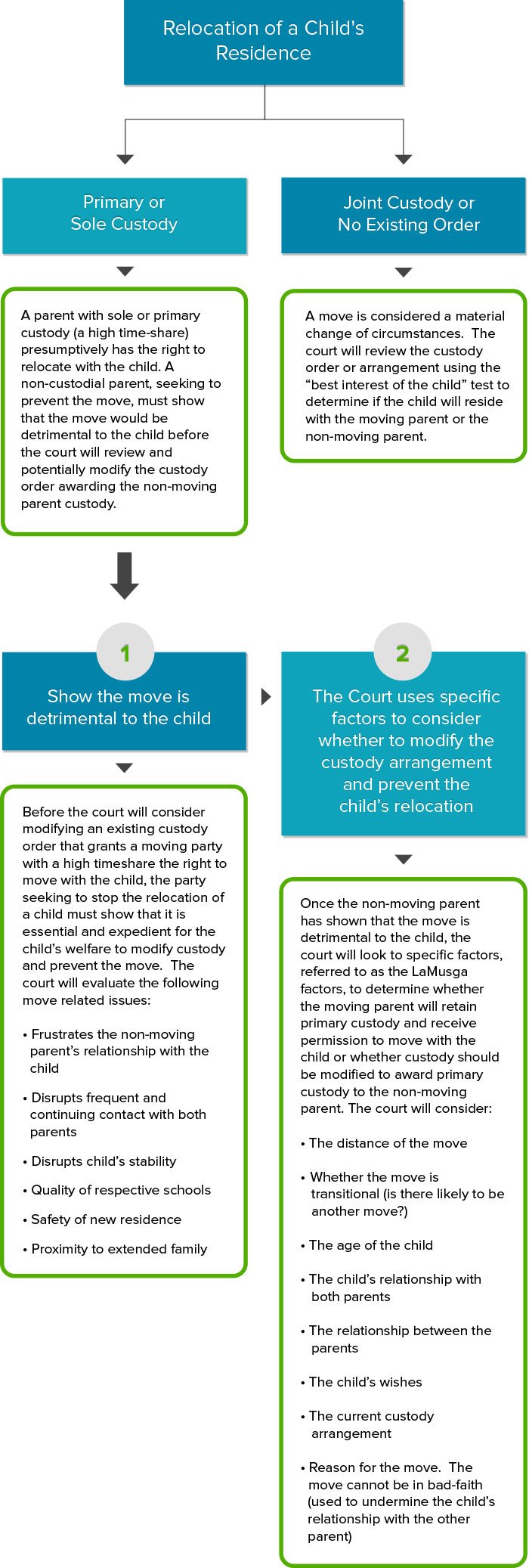
“Move Away” Case
If one parent makes the decision to attempt to relocate the child’s residence, a child custody order must be modified, in one way or another. A party will, of course, be able to relocate their own residence, but that parent will not necessarily be allowed to change the residence of the child. When a divorce court is making a determination as to whether a parent may relocate a child’s residence, the divorce court must assume that the parent will actually move, regardless of whether the court allows the party to relocate the child’s residence. A divorce court cannot create two separate orders, one if the parent decides to move, and another if they do not. In other words, a divorce court must make an order that the child will live primarily with the moving parent, or primarily with the non-moving parent.
There is a great burden on a non-custodial parent who is attempting to modify custody and relocate a child’s residence. (Jane J. v. Superior Court).
Does a Parent with Physical Child Custody Need to Prove That the Move is "Necessary?"
If a child custody order has previously designed one parent as the primary custodial parent, the moving parent does not need to prove that the move is necessary. (IRMO Burgess) A parent opposing the move must show that the move would be detrimental to the child. (IRMO LaMusga). If detriment is proven by the non-moving parent, then a divorce court must evaluate all of the relevant factors to determine whether relocation or a change of child custody to the non-moving parent is in the child’s best interests.
What Factors Does a Family Law Court Look to In Determining Whether to Allow a Parent to Relocate a Child's Residence?
A divorce court will look to a number of factors in making the determination in the relocation of a child’s residence including, but not limited to: the extent of shared custody, willingness to place the children’s best interests first, reasons for the move, relationship of the child with each parent, distance of the move, age of the child, ability of the parents to cooperate and communicate, stability and continuity, relationship of the parents, and the child’s wishes.
Is a Hearing Generally Required for a Move Away Determination?
Where parents have a working shared child custody arrangement, a divorce court must conduct a hearing to determine whether a relocation of the child’s residence is the child’s best interests. (IRMO Cohen).
If a child custody order has not been made, or if the child custody order is not a “final” order, the divorce court will use the ‘best interests of the child’ test in making the decision on the relocation, versus the “change of circumstances test,” which is a heavier burden.
The parties cannot contract with each other to prevent the divorce court from allowing one parent to relocate a child’s residence. (IRMO Abrams).
A divorce court cannot require a parent with lower financial resources to relocate (IRMO Fingert) to live near the child.
Can Child Custody Orders be Changed?
Child custody orders are always modifiable. The parties cannot validly contract with each other to not seek to modify or change the child custody arrangement in the future. The divorce court always retains jurisdiction to change child custody orders. (IRMO Goodarzirad).
Generally, the divorce court will only modify “final” child custody orders if there is a showing of a substantial change in circumstances between the date of the existing order and the hearing. (Montenegro v. Diaz). If the order is not “final”, the divorce court will base its decision for modification on the “best interests” of the child. Additionally, the parties cannot bind the family law court to follow a specific standard of review at future custody hearings.
What Are Examples of a Change of Circumstances in the Context of a Modification of a Child Custody Order?
Examples of possible circumstances that may warrant a modification of child custody order:
- Child’s preference and age;
- Work schedule;
- Move away (relocation);
- Poor parenting/negligence;
- Child abuse;
- False allegations of abuse;
- Domestic violence;
- Interference with parent/child relationship (alienation); and
- School related issues.
Are There Situations Where a Change of Circumstances is Not Required for a Court to Modify the Child Custody Order?
Divorce courts will not modify temporary child custody orders unless there is a substantial change of circumstances since the last order. In fact, divorce courts are reluctant to make changes in temporary custody orders under any circumstances, unless a child’s safety is involved. Divorce courts seek to have only one child custody trial.
In some situations, the simple changing of the residential arrangements (timeshare) may not constitute a change in child custody. In this situation, a showing of a substantial change of circumstances may not be required (IRMO Birnbaum). Some minor changes in a schedule may not be a change in custody, and may not require a substantial change in circumstances.
What is Guideline Child Support?
What is Guideline Child Support?
California family law states that parents must contribute to the support of a child, according to a detailed formula utilized in the software programs “X-Spouse” and “Dissomaster.” These programs generate “guideline” child support.
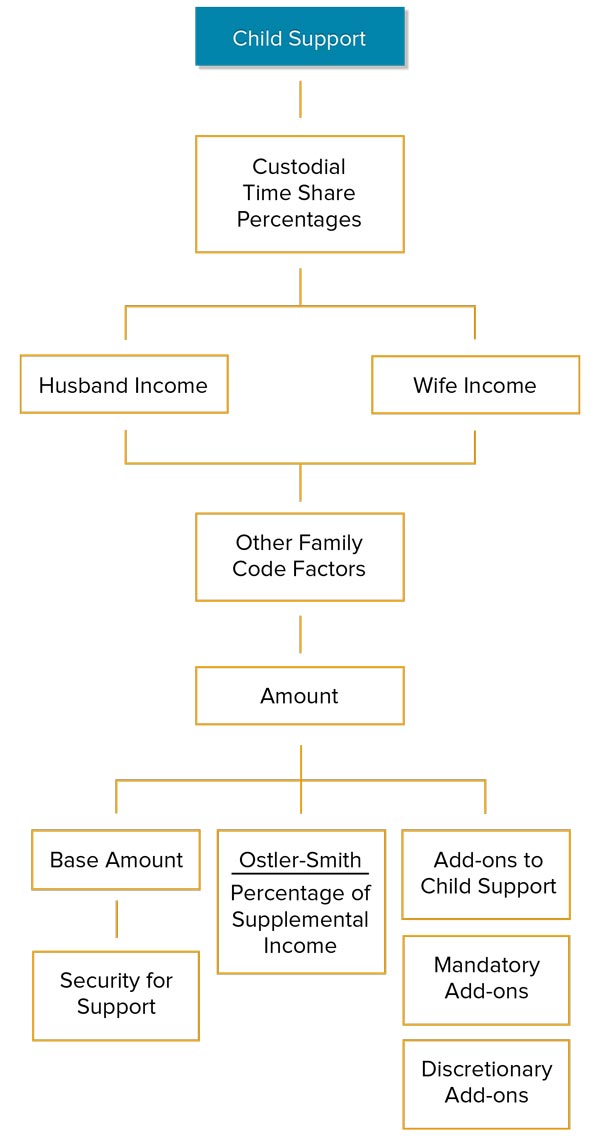
Child Support Decision Tree

Family Law Interconnectivity Overview – Children
Child support is more involved than simply inputting the incomes of the parties into a computer program and pressing enter. The computer program generates the guideline child support amount. A family court may order a party to pay for additional expenses, referred to as “add-ons,” in addition to the base child support. Add-ons may include such things as child care, activity costs, schools costs, travel costs, health insurance premiums, and medical costs not paid by insurance. Other issues that may need to be addressed include imputation of income, determining the representative period of past earnings to determine the most probable future income, how to treat fluctuating income, determining whether money received is income, etc.
A family court may order “add-on” costs be paid in full by one party, or divided between the parties in equal or unequal shares.
A family court may order a base level of child support, and a supplemental payment of any additional income received over the base salary. This supplemental child payment is referred to as an “Ostler-Smith” payment.
Isn't Child Support Determined by Simply Using a Computer Program?

“Child Support Decision Tree

Family Law Interconnectivity Overview – Children
Child support is a complex area of family law and is more involved than simply inputting the incomes of the parties into a computer program and pressing enter. The computer program generates the guideline child support amount. A family court may order a party to pay for additional expenses referred to as “add-ons” in addition to the base child support. Add-ons may include such things as child care, activity costs, schools costs, travel costs, health insurance premiums and medical costs not paid by insurance. Other issues that may need to be addressed include issues like imputation of income, determining the representative period of past earnings to determine the most probable future income, how to treat fluctuating income, determining whether money received is income, etc.
A family court may order “add-on” costs be paid in full by one party or divided between the parties in equal or unequal shares.
A family court may order a base level of child support and a supplemental payment of any additional income received over the base salary. This supplemental child payment is referred to as and “Ostler-Smith” payment.
Can Parties Agree to a Non-Modifiable Child Support Order?
The parties cannot contract with each other to deprive the family law court of jurisdiction to order or modify child support for a minor child or disabled adult child. Such a contract would be void and against public policy (IRMO Lambe & Meehan).
Is the Amount of Custodial Time That Each Parent Has Relevant to the Amount of Child Support?

“Child Support
Conflicts may exist relative to the methodology of calculating custodial time sharing. Generally, hours of parental responsibility are counted towards the time share percentages. This means that when a child sleeps at one parent’s home, that parent is credited with the sleep hours in the time share calculation. Likewise, if one parent is responsible for issues that arise during the school day, that parent is credited with the school hours. One of the significant factors that determines guideline child support is the child custody time share percentages. A higher child custody time share for the payor decreases child support, and a lower child custody time share for the payor increases child support.
Is Guideline Child Support Determined by a Computer Program?
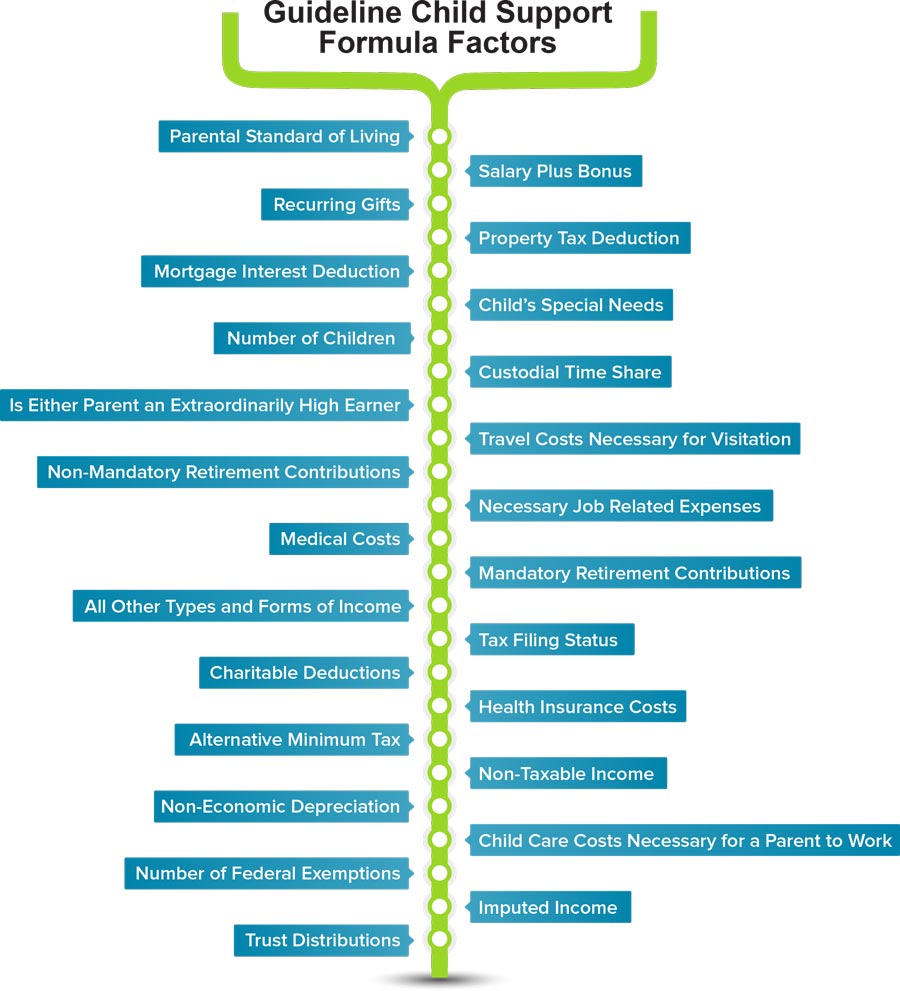
“Child Support
The amount of child support is determined by state mandated guidelines using a formula that factors in each party’s income, and the percentage of time that a child spends in the custody of each parent. Family law courts use one of the computer programs (Dissomaster, XSpouse, etc.) certified by the state to arrive at “guideline” child support.
Is There a Difference in the Determination of Guideline Child Support at the Temporary Stage vs. the Post-Judgment Stage?

Potential Sequence of Steps and Procedural Events in a Divorce
Temporary child support is ordered at the Request For Order (RFO) stage of the case. Post-judgment child support, is ordered at the trial. Guideline child support ordered at both stages of a case, is determined by the same formula.
Is the Court Required to Order the Computer Generated Child Support Amount?
A family law court may depart or deviate from guideline child support, even though the amount of guideline child support is presumed to be the correct amount. A family law court has the discretion to determine whether or not to depart from guideline child support but must make specific findings to justify the departure (IRMO Hall).
The following circumstances may justify departure from guideline child support:
- Special needs of a child (IRMO Cryer);
- Exceptionally high earner;
- Deferred home award to payee party;
- A party is not contributing to the needs of the children at a level commensurate with their time share;
- Unjustness of the guideline formula in the particular circumstance;
- Payment of significant amount of community consumer debt incurred for basic living needs (County of Lake v. Antoni); and
- Mortgage free housing. (IRMO Schlafly).
A client should expect their divorce lawyer to be beyond candid, and explain to them the strengths and weaknesses of the case, and the probable outcome of litigation at the first attorney-client meeting and at every stage during the process, as new facts unfold. A client should have the opportunity to make informed and timely decisions about their children. Our Orange County divorce lawyers are known for telling our clients the good, the bad, and the ugly about child custody matters – early and often. Clients deserve to hear the truth, not a sales pitch.
How is Time Share Calculated in Setting Guideline Child Support?
The custodial time awarded to each party impacts the amount of child support calculated by the guideline formula.
A divorce court has the discretion to use approximate percentages in setting the custodial time share (IRMO Rosen and IRMO DaSilva). Alternatively, a court may literally count the hours and calculate the exact actual time share.
A divorce court may attribute timeshare credit to a party while a child is actually attending school (IRMO Whealon and IRMO Katzberg) or sleeping, if the party is responsible for the child during those hours.
Are a Child's Special Needs Relevant to a Child Support Order?
Child support is paid to address a child’s needs. A divorce court may take into consideration the special needs of a child when determining the amount of child support. The court may also consider the history of private school attendance and the reasons for private school. A child support order that merely pays for a child’s necessities may not be sufficient, if the parents can afford to pay for more.
When Does Child Support End?
Child support is payable until a child completes high school, but not after a child attains the age of 19.
Child support does not automatically end on the death of the payor parent, even if the primary parent had child custody. (IRMO McCann).
Child support may be payable to adult children who are unable to support themselves.
What Sources of Revenue are Included in the Guideline Child Support Calculation?
Child support is based upon the gross (not net) income of the parties, including the following types of income and benefits:
- Salary;
- Bonuses;
- Royalties;
- Rents;
- Workers compensation;
- Unemployment benefits;
- Disability benefits;
- Social Security benefits;
- Employment benefits;
- Deferred income;
- Perquisites;
- Military allowances;
- Meal allowances;
- Recurring Gifts;
- Most annuity payments; and
- Vested stock options/RSUs/Profits Interests.
The following items are not income available for child support:
- One time inheritances;
- Unallocated lump-sum personal injury recoveries;
- Loans of all types including student loans;
- Life Insurance proceeds; and
- Proceeds of the sale of stock in a business that are reinvested.
What Other Issues Does a Court Look to in Determining Income Available for the Payment of Child Support?
A family law court may look to the parents income and assets in determining the amount of child support.
Structured annuity payments paid relative to a personal injury do not constitute income for the purposes of determining child support.
Spousal support is not income to be included in the calculation of guideline child support. (IRMO Corman).
A wealthy party may avoid extensive discovery if a stipulation is reached providing that the party has the ability to pay any reasonable child support. (Estevez v. Superior Court and IRMO Aylesworth).
When there is a dispute as to the income of a party, the divorce court may look to a party’s loan application as presumptive evidence of income. (IRMO Calcaterra & Badakhsh). The representations on the loan application can be received by the divorce court as admissions of the income earned.
A party may not reduce his or her income by voluntarily making payments to reduce debt that is not currently due to a third person or entity. For example, a party prepaying a mortgage cannot claim a reduction in income. (IRMO Kirk).
Voluntarily deferring income is not a proper basis for a reduction of spousal or child support. (IRMO Berger).
Proceeds from the sale of a business that are reinvested are not income available for child support. (IRMO Pearlstein).
The increase in the amount of equity in a home is not income for purposes of calculating child support. (IRMO Henry).
Are Monetary Gifts From Third Parties Considered to be Income Available for Child Support?
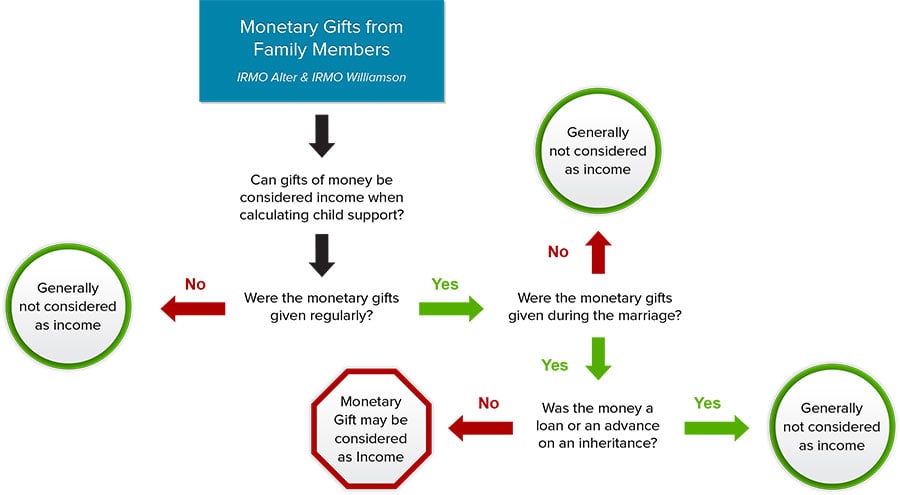
Are Monetary Gifts from Family Members Income
Payments made by family members to a party may or may not be characterized as income. If the payments are loans or advances on an inheritance they may not be income. If they are recurring gifts, a divorce court may characterize them as income. (IRMO Alter). If payments have been recurring but have ceased, they will generally not be considered income. (IRMO Williamson). The family law court has discretion to consider whether to consider gifts to be income. A family law court may rule that recurring gifts from a “good samaritan” are not income for purposes of calculating guideline child support. (Anna M. v. Jeffrey E.).
How Does a Court Deal with Fluctuating Income in Setting Child Support?
In determining guideline child support, the family law court must consider future bonuses, overtime and other periodic and fluctuating payments. The divorce court will frequently order the payor to pay a percentage of the fluctuating income to the custodial party as supplemental child support payments. (IRMO Ostler and Smith).
Vested but unexercised stock options may also be considered as income for child support purposes. (IRMO Kerr and IRMO Macilwaine).
Although a divorce court has discretion in deciding which time period of prior earnings to use in fashioning a child support order, the divorce court must use a representative sample period that reflects a realistic level of income that likely reflects future earnings. (IRMO Riddle).
Physical child custody addresses where a child physically resides, and the parenting time of each parent. A physical child custody order determines which parent has supervision rights and responsibilities for the child during designated periods. The parties may be awarded joint physical child custody, or physical child custody may be awarded to just one party. Joint physical child custody does not necessarily mean equal time sharing. A 70/30 time share could be labelled joint child custody. The parties may be awarded joint physical child custody, with one parent being designated as the primarily custodial parent.
Divorce courts in Orange County rarely split sibling’s between the parents. It is generally believed that it is in the sibling’s best interests to live together.
Does the Family Law Court Always Use a Person's Actual Earnings in Calculating Guideline Child Support?
If a party is deliberately suppressing his or her income, a family law court may base the child support order on a party’s ability to earn an income as opposed to his or her actual income. (IRMO Labass & Munsee). However, a divorce lawyer alleging the suppression of income must prove the earning capacity of the other party. Before a court will impute income to a party it must be shown that the party has the ability to earn and that a job is available.
Can the Court Force a Party to Continue to Work Excessive Hours?
The payor’s ability to earn is measured by the reasonable work regimen of a person in the same industry. A family law court cannot base the child support order on excessive overtime, if overtime is not actually being worked. However, if a person continues to work overtime or excessive hours, the court may base child support on the extra earnings.
Can a Court Impute Earnings to a Party Who Reduces His Income or Quits His Job for Good Faith Reasons, When it is Calculating a Child Support Order?
If a party voluntarily terminates his or her employment, a family law court may impute income to that person at the previous level of earnings in calculating guideline child support. (IRMO McHugh). The family law court need not find bad faith on the part of the payor to impute income to that party. (IRMO Padilla). A spouse’s motivation for reducing available income is irrelevant to the divorce court’s ability to consider a payor’s earning capacity in determining the amount of child support. (IRMO Hinman).
Can a Court Impute Earnings on Assets When Calculating Guideline Child Support?
A family law court may impute income on the assets of both parties in calculating a child support order. (IRMO Dacamus, IRMO Destein and IRMO Sorge). The increased and unrealized equity in a payor’s residence is not income.
Can a Court Consider a Previous Pattern and History of Using Separate Property Assets to Pay Community Expenses When Setting Child Support?
If a payor has a history of using their separate property assets (capital) to create and maintain a standard of living, the divorce court may fashion a child support order requiring their to continue that practice. (IRMO Deguigne).
Does a Reduction in the Income of the Payor Parent Always Result in a Reduction in Child Support?
The reduction in employment income alone may not constitute a change in circumstances sufficient enough to warrant a reduction in support, if the parent has other income producing assets or if other changes have occurred like, for instance, a significant time share change. A child support order is based on income from all sources.
Does a Family Law Court Consider a Child's Best Interests When Determining Whether to Impute Income to a Custodial Parent?
A family law court may impute income to the custodial parent, so long as the imputation is consistent with a child’s best interests. (IRMO Ficke). In other words, a family law court may not impute income to a mother who is the primary custodial parent, if it believes that doing so would force her to work, and working would not be in a child’s best interests relative to supervision and parenting.
Can the Family Law Court Order the Primary Custodial Parent to Pay Child Support to the Secondary Custodial Party?
Child support may be ordered payable by the primary custodial party to the secondary custodial party. If the primary custodial parent earns substantially more than the other parent, the formula may generate a guideline child support payment payable to the secondary custodial parent. However, a court could deviate from the guideline child support amount and decrease or eliminate future support.
How Does the Family Law Court Address Health Insurance Issues?
A divorce court must order one or both parties to maintain health insurance for the children, if available through employment at no or nominal cost.
A divorce court will generally order each party to pay all, or a portion, of a child’s medical expenses not paid by insurance. The court can order the parties to pay disproportionate shares of health costs.
Can a Family Law Court Require That a Portion of the Guideline Child Support be Set Aside for the Child's College Expenses?
A family law court may not order that a portion of the guideline child support be paid into a trust for a child’s future expenses or college. In the Orange County family law case IRMO Chandler the Court of Appeal made it clear that a family law court does not have the discretion to designate a portion of guideline child support be saved for college expenses, regardless of how large the child support is, and regardless of how small the contribution to an educational trust is.
Is Child Support Modifiable?
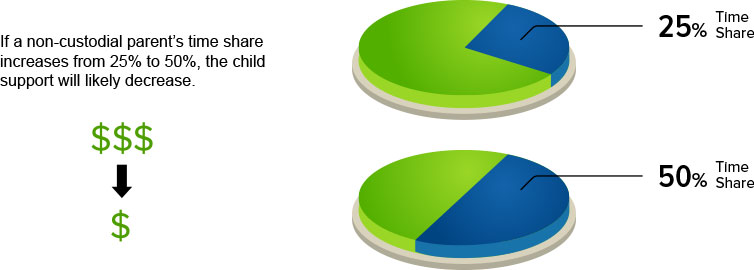
Time Share Factor
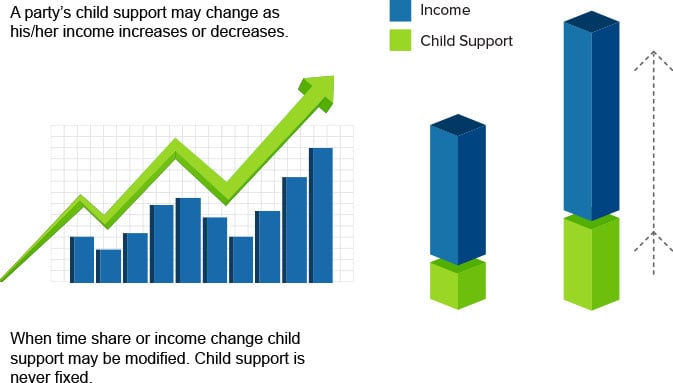
Income Factor
Child support is always modifiable. However, it may only be modified retroactively to the date of the filing of a Request For Order (RFO) seeking the modification.
Child support is modifiable if there has been a material change in circumstances since the date of the last order. A change in income or a change in the child custody timeshare may be a material change in circumstances. However, a substantial reduction in income from employment may not justify a reduction in child support, if the payor has substantial income from investments.
The parties may not bind the family law court to a specific standard of review to modify a child support order. (IRMO Cohen).
Common examples of circumstances that may warrant a modification of child support include: a change in income of either party, decrease in the income of either party or change in custodial time share.
Can the Community be Reimbursed if One Spouse Works in Their Business During the Marriage?
California family law provides for a reimbursement to the community of a portion of the increase in the value of a business owned by one spouse before the date of the marriage in certain situations.
Can a Separate Property Business Become a Community Property Business During a Long Marriage?

Initial Characterization of Business
If a business is acquired prior to the date of the marriage, it will be characterized as the owner’s separate property.
If a business is acquired during the marriage, it will generally be characterized as community property. The characterization of a business will not change during the marriage, unless there is a transmutation by written agreement of the business itself from separate to community.
To Whom Does a Family Law Court Generally Award a Business?
If a business is characterized as community property, the business will be awarded to one of the parties, to the parties jointly, or sold. Generally, it is awarded to the operating spouse.
How is the Increase in Value of a Separate Property Business Allocated Between the Community and the Separate Property of One Spouse?
If the value of a separate property business increases in value during the marriage, and the increase itself results from the natural enhancement of the asset, the increase will be allocated to the separate property of the owner-operator separate property. (Estate of Ney). However, if the increase results primarily from the work, effort, and industry of the owner-operator spouse, the community may be entitled to receive reimbursement of a portion of that increase. (Cozzi v. Cozzi). The right, if it exists, is not an ownership interest in the business – it is a right to reimbursement. (Patrick v. Alacor Corp. (Patrick I) and Patrick v. Alacer Corp. (Patrick II)).
Is There More Than One Way to Allocate the Increase in Value of a Separate Property Business That Occurred During the Marriage?

Reimbursement to the Community
If the community is entitled to a right of reimbursement, the amount of the reimbursement will be determined in such a manner so as to achieve substantial justice. The divorce court will, generally, use the Pereira approach or the Van Camp approach. However, the divorce court may apply Pereira in certain years, and Van Camp in other years. The divorce court may also utilize a different approach, if it achieves substantial justice.
When is the Van Camp Approach Used to Determine Reimbursement?

Equitable Allocation Approach
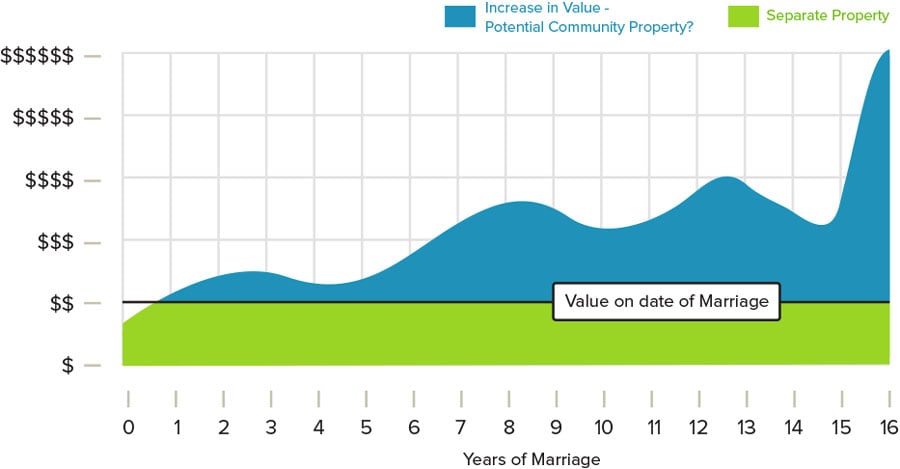
Equitable Apportionment (Reimbursement) of a Portion of the Increase in Value of a Separate Property Business During the Marriage
Using the Van Camp approach, if the owner-operator’s spouse was paid adequate and reasonable compensation during the marriage, there will be no reimbursement to the community. If the owner-operator spouse was under-compensated but the business distributions used for community expenses, or the purchase of community assets exceeded the amount of the under-compensation, the community will not be entitled to any reimbursement.
Using the Pereira approach, the owner-operator of the separate property business receives an investment return on the value of his business as it existed on the date of marriage and the remaining portion of the increase in value is reimbursed to the community.
Can the Court Use an Approach Other Than Pereira or Van Camp When Allocating an Increase of a Separate Property Business?
The divorce court may use the Pereira approach in some years and the Van Camp approach in other years. (IRMO Brandes).
Pereira + Van Camp = Brandes
The court may split the difference between the Pereira and the Van Camp approach. (Todd v. C.I.R.).
In calculating the allocation/apportionment/reimbursement amount, divorce courts look to a number of factors: valuation on date of marriage, valuation on date of separation, other valuation dates, actual earnings, distributions of the business used for community purposes, personal expenses (perquisites) paid by the business, undistributed income, reasonable compensation, rate of return on separate property value, and compound versus simple interest.
In Determining the Amount of Reimbursement to the Community Relative to an Increase in the Value of a Separate Property Business, Can Selecting One Formula Versus Another Make a Significant Difference in the Amount of a Reimbursement to the Community?
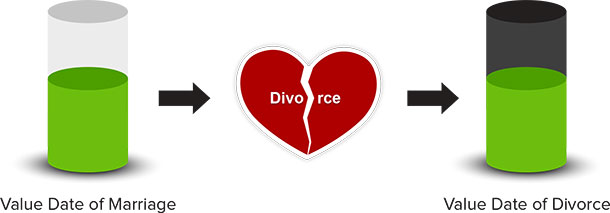
Right to Reimbursement?
The selection of the formula can make a huge difference in the amount of the reimbursement to the community. Depending upon which formula a court selects, the increase in value of a separate property business during the marriage can be entirely the separate property of the owner-spouse, all community property or part separate and part community.
What Factors Does a Family Law Court Look to in Determining Which Formula to Use When Allocating the Increase in Value of a Separate Property Business?
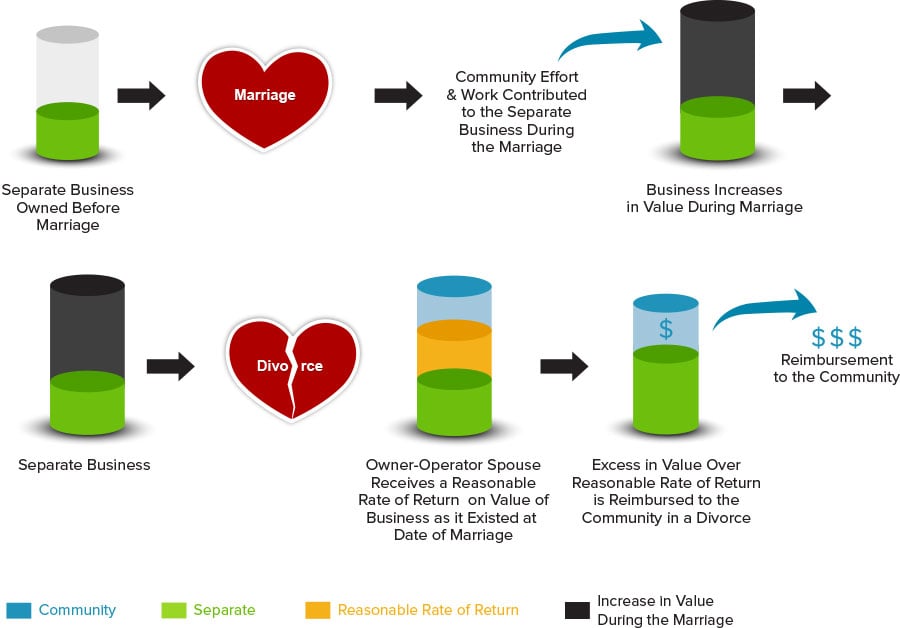
Pereira Formula
Pereira Formula
If the increase in value is due primarily to the efforts of the owner-spouse, California divorce courts generally apply the Pereira formula. This formula gives the owner-spouse a reasonable investment rate of return on the value of the separate property business as it existed on the date of marriage. The remainder of the increase in value is allocated to the community in the form of a reimbursement.
This formula is often applied to personal service businesses, professional practices and businesses that increased in value primarily as a result of the work, skill and talent of the operating-spouse. (IRMO Pereira).
Van Camp Formula
If the compensation of the owner-spouse and distributions received by the community from the separate property business exceed the value of the owner-spouse’s contributions to the business (adequate and reasonable compensation), then the community has been made whole and it has no right to reimbursement relative to the increase in value of the separate property business during the marriage under the Van Camp formula.
This approach analyzes whether the community was reasonably and adequately compensated for the work, effort and skill contributed to his or her separate property business. If the compensation was not reasonable and adequate, the community may be awarded a sum equal to the amount of under-compensation. Additionally, the divorce court may consider any distributions made by the separate property business to the community during the marriage as either reducing the amount owed to the community for under-compensation or in the determination of whether the community was reasonably and adequately compensated for the work, skill and effort of the owner-spouse. In other words, a divorce court may find that the owner-spouse’s compensation was a combination of his or her compensation and the distributions received by the community.
Van Camp is often applied to capital intensive businesses. It may be applied where the increase in value was not due primarily to the work, skill and talent of the operating-spouse. In determining why a business increased in value, the divorce court can look to whether the increase in value was due, in part, to the industry, existing momentum, unique competitive advantages, patents, a monopoly, legislation, a world class management team or other market factors. (IRMO Van Camp).
Does the Community Always Receive a Reimbursement if the Separate Property Increase in Value?
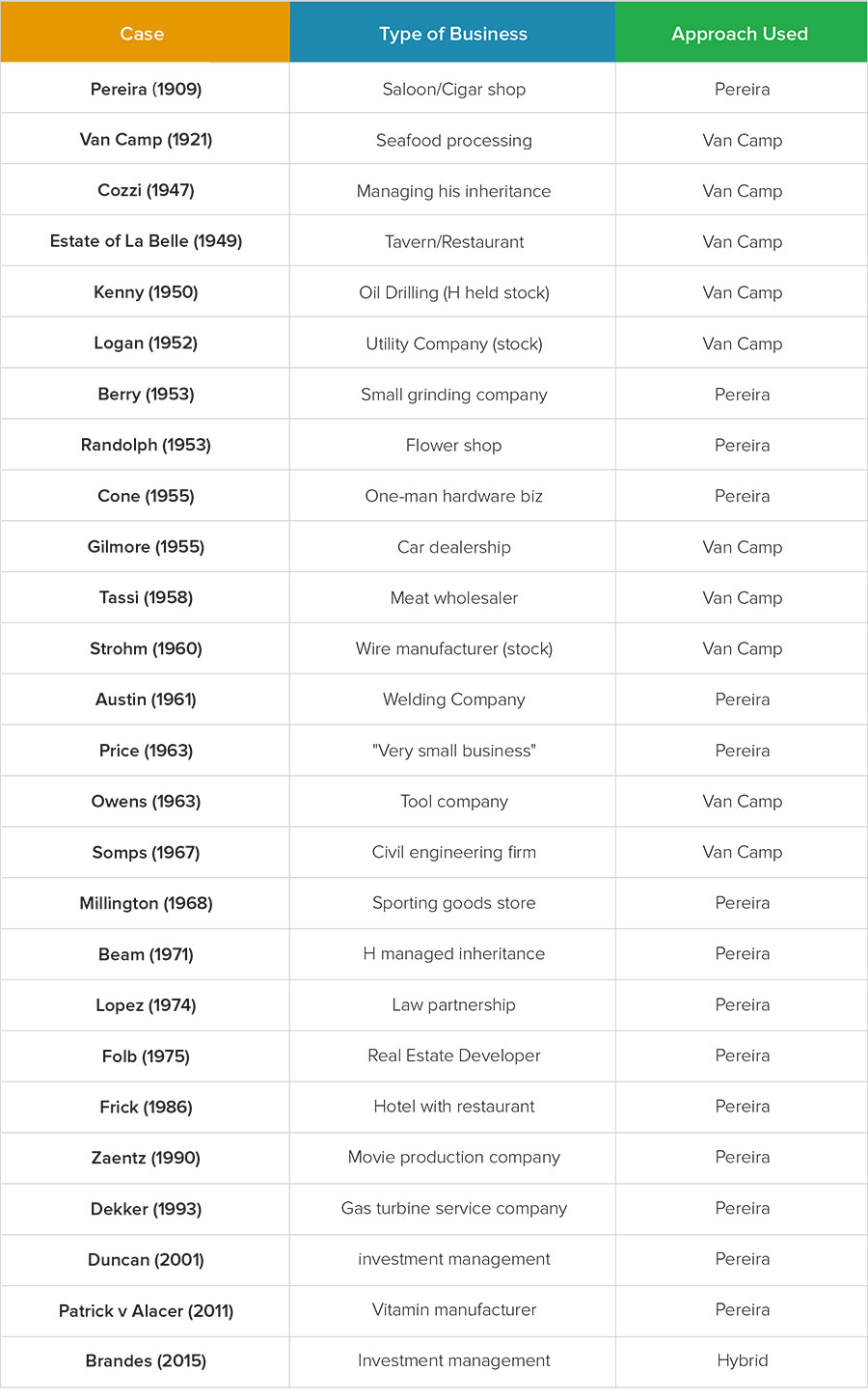
Equitable Apportionment / Reimbursement
Depending upon the facts of the case and the formula applied by the divorce court, the allocation (reimbursement) of the increase in the value of the business during the marriage may be allocated all to the community, all to the separate property of the spouse who owns the business, or apportioned.
Can Family Law Be Broken Down Into A Series of Decisions?
These decision trees were designed to provide a holistic view of family law issues from a different perspective and to put the component parts in a logical format, for clarity.
Ending A Marriage Decision Tree
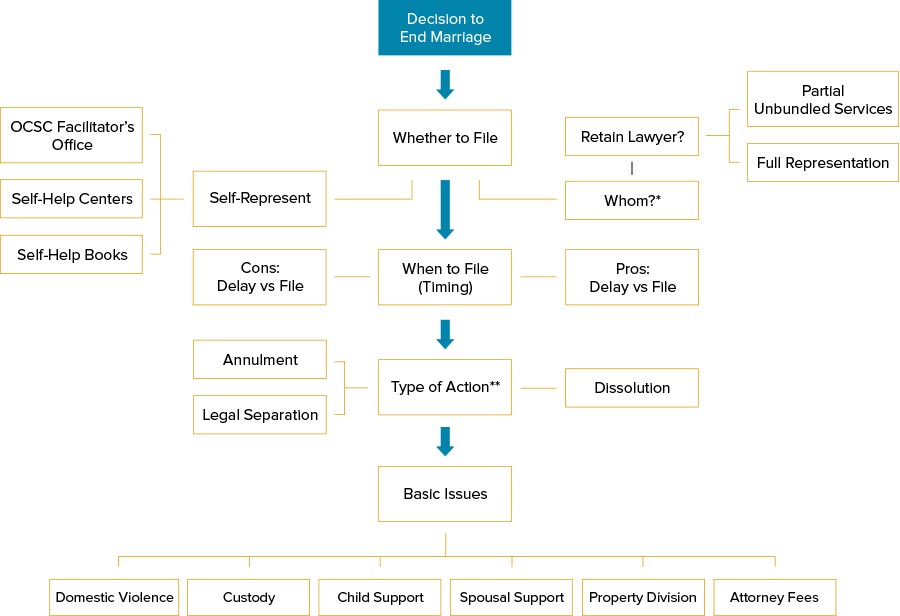
Decision to End Marriage
After a decision to terminate a relationship has been made, one must decide what type of action to file: Divorce; Legal Separation; or Annulment and when to file it.**
Child Custody Decision Tree

Child Custody Decision Tree
Child custody orders are comprised of two main components: Physical and legal child custody. Physical custody addresses a party’s physical time with a child, and legal custody addresses decision making. A parent may have joint or sole, legal or physical custody. Generally, parents are awarded joint legal custody. Most orders provide for specific periods of physical child custody being awarded to each parent. The actual time-share schedule and the percentage of time-share are more important than the label attached to the plan. The percentage of timeshare impacts the amount of child support.
- * Child Custody and Visitation
Child Support Decision Tree

Child Support Decision Tree
Basic “guideline” child support is calculated by a computer program that analyzes many factors. The main factors are the parties’ respective incomes and the child custody time-share percentages. Child support may be comprised of several different components: basic guideline child support, Ostler-Smith order (percentage of additional variable income), and “add-ons” (medical insurance, uncovered medical expenses, child care, etc.). Life insurance on the life of the payor may provide security for the payment of child support.
Spousal Support Decision Tree
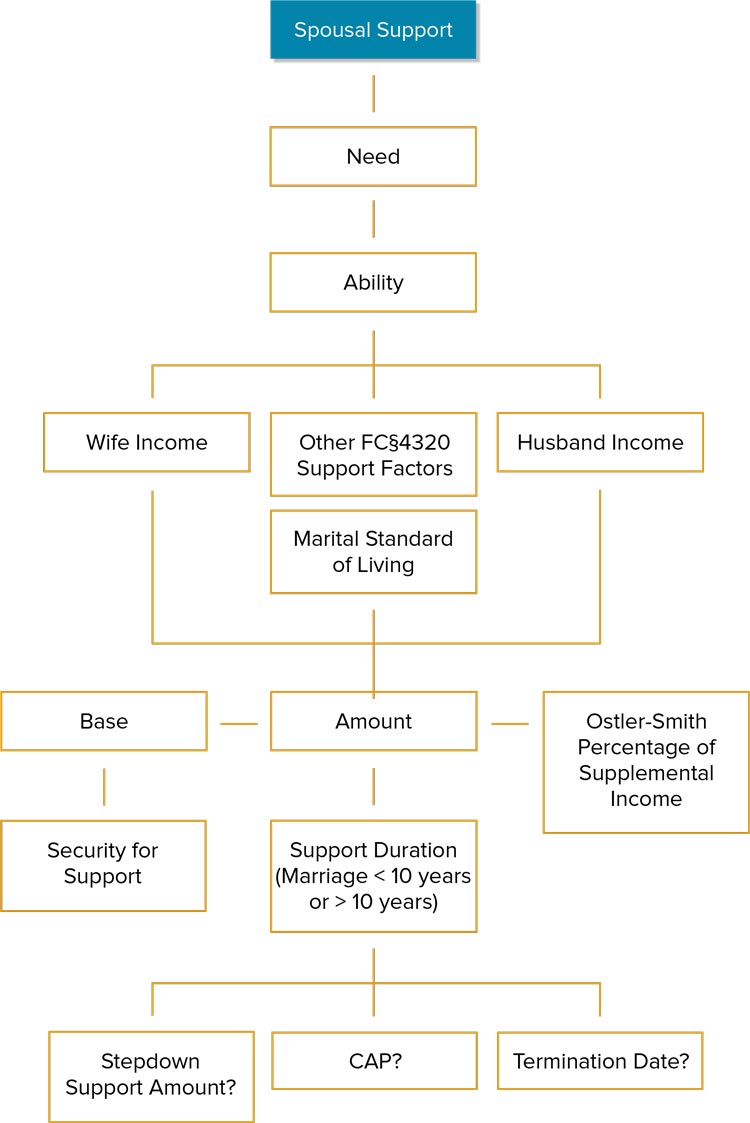
Spousal Support Decision Tree
Permanent spousal support is determined by balancing the factors set out in Family Code section 4320. Often, the two most important factors are the incomes of the two parties, but the court must weigh and consider all relevant factors.
The marital standard of living is simply one of the section 4320 factors. It does not create a ceiling or a floor for spousal support and is basically a benchmark.
Spousal support is paid to a party who has the need for financial assistance by a party who has the ability to provide that assistance. Spousal support may be comprised of a base payment and a percentage of any supplemental income which is referred to as an Ostler-Smth order.
The duration of spousal support is based primarily on the length of the marriage. The duration of spousal support in marriages of less than ten years in duration will generally be one-half the term of the marriage. Spousal support in marriages of more than ten years may be payable as long as the payor has earnings.
Community Property Division Decision Tree
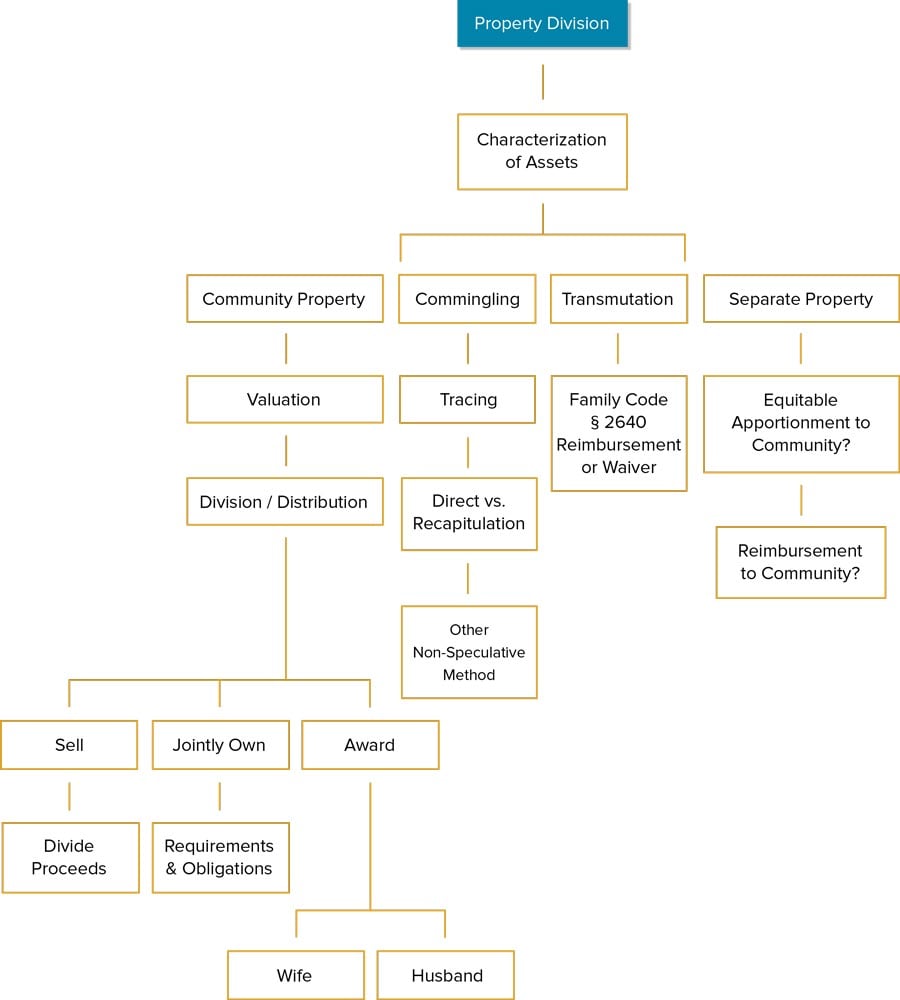
Community Property Division Decision Tree
Assets must be characterized as separate property or community property.
Separate property is owned entirely by one party or the other.
Community property is equally divided between the parties and is either awarded to one of the parties or sold. If an asset is acquired during the marriage, it is presumed to be community property.
If a party commingles or mixes community property with separate property, the combined property will be characterized as community property unless the separate property can be traced back to its original source using financial records.
A party that transmutes or transfers separate property into community property may be entitled to reimbursement.
If the asset is separate property, the community may be entitled to reimbursement and/or an equitable apportionment of any increase in value related to any community effort or money contributed to the separate asset.
Attorney’s Fees Decision Tree

Attorney’s Fees Decision Tree
Courts may order one party to pay all or a portion of the other party’s attorney’s fees, costs, and expert fees if the court finds that such an order is necessary to level the litigation playing field. Family law courts look to each party’s respective assets and income together with the relative need of the requesting party. The courts must consider all of the section 4320 factors in the analysis.
Sanctions
Courts may also order financial sanctions against a party based on a number of different factors that are conduct based. Sanctions may be ordered to punish and/or deter uncooperative or bad behavior.
Characterization Of Deferred Compensation Allocation Of Stock Options
Stock options, restricted stock, stock appreciation rights (SARs), phantom stock and restricted stock units (RSUs) may be granted to employees as a part of a compensation package. Generally, these types of assets have a risk of forfeiture.
Allocation Of Stock Options
Stock options granted during the marriage and/or partially vested during the marriage may have a community property component. Stock options that are partially earned during the marriage are allocated between community property and separate property. The foundation for this allocation is the statutory law that provides that “earnings” during the marriage are community property. If a spouse is compensated during the marriage, in part, with a grant of stock options that partially vest during the marriage and partially vest after the date of separation, the stock options will most likely be partially community property. If a spouse’s employment during the marriage results in the partial vesting of stock options granted before the date of the marriage, the options will also most likely have a community property component. The number of options characterized as separate property or community property will vary depending upon which formula is used by the family law court.
The time rule is used to allocate options between community property and separate property. The time rule does not determine characterization. The characterization of an asset is determined by when the right to the asset was accrued.
Cliff Vesting

Cliff Vesting
There are three basic formulas (IRMO Nelson, IRMO Hug and IRMO Harrison) used to allocate options between separate property and community property. Generally, the community’s percentage interest in stock options that vest after the date of separation decreases as each year lapses.
Cliff Vesting

Cliff Vesting
Divorce courts look to a number of factors in determining which formula to use:
- When was the grant made?
- Were the stock options granted to attract and retain the employee?
- Were the stock options granted for past service?
- Were the stock options granted to offset under-compensation?
- What are the forfeiture provisions?
- What are the vesting dates?
- What are the vesting provisions?
- Are the stock options designed as “golden handshakes” to retain the employee?
- What was the strike price at the time of grant?
- When did the parties separate?
- When did the parties marry?
- Were the stock options granted to replace other stock options?
Can The Process Of Ending A Marriage Be Illustrated?
The legal process of separation, divorce or nullity may be complex, and it can be hard to visualize the complete process. There are many steps between deciding to end a marriage and completing the process.
This section was designed to illustrate the process as a road map to illustrate the ways in which a marriage may be terminated.
What is a Deferred Compensation Plan?
Deferred compensation plans come in many different shapes and sizes. Some of these employment benefits may not be restricted by the rules and regulations of the Employee Retirement Income Security Act (ERISA), and thus can be structured to meet the specific needs and objectives of employees and employers. They may be granted to specific employees without regard to the benefits received by other employees. They are often complex in structure, difficult to value, and may present problematic enforcement issues. These benefits may never be received or may be received many years in the future. A plan, or a portion of a plan, that is earned during the marriage, will be characterized by the divorce court as community property.
What is the Difference Between a Qualified and a Non-Qualified Deferred Compensation Plan?
A qualified deferred compensation plan must comply with all of the rules and regulations of the Employee Retirement Income Security Act (ERISA) and must be offered to all employees. An example of such a plan would be a 401(K) plan. Qualified plans have maximum contribution limits.
A non-qualified plan is not restricted by ERISA, does not have to be offered to all employees, may have a security risk with no guarantee of payment, and are unfunded obligations to the business.
What Are Examples of Deferred Compensation Plans?
Deferred compensation plans can include the following types of plans:
- Stock appreciation rights (SAR)
- Restricted stock
- Phantom stock plans
- Profit units
- Non-qualified stock options
- Split dollar life insurance
- Supplemental executive retirement plans (SERP)
- Bonus deferral plans
- Deferred savings plans
If a business is characterized as community property, the business will be awarded to one of the parties, to the parties jointly, or sold. Generally, it is awarded to the operating spouse.
How Does Family Law View a Marriage in the Context of a Divorce?
Divorces are actions filed with the California Superior Court, and are either settled or litigated in a hearing or trial. Divorce litigation follows the same code of evidence and code of civil procedure as civil and business litigation. Family law views married people as partners, the marriage as a partnership, and a divorce as a dissolution of a partnership. A dissolution can be peaceful or hostile, and can be resolved through a settlement or litigation.
Do Most Divorce Cases Result in a Contested Hearing?
Family law issues may be settled or resolved in a trial or hearing. It is a misconception to think that retaining a divorce lawyer to represent you in a divorce will necessarily involve a hearing or a trial in your case. Most divorce cases that are technically “litigation” matters never proceed to a hearing or trial, and are settled between the parties or their lawyers.
One should hire a divorce lawyer who is capable of litigating a case involving the relevant issues, but who is settlement oriented, (if that is your objective0.
Any divorce case could end up in litigation, even cases that appear to be a guaranteed settlement. Often times, cases that appeared to be a guaranteed “war of the roses” will settle quickly. The direction a case takes often depends on which divorce lawyer is retained. See our sections “Selecting a Divorce Lawyer,” and “How to Speed the Process and Manage Attorney’s Fees.”
What Issues Create the Highest Likelihood of a Protracted Divorce?

Potential Sequence of Procedural Events in Child Custody Litigation
Some issues are simply more complex or time consuming than others, and may extend the divorce process. For example, issues related to custody, domestic violence, or business valuation may extend the time required to complete a divorce. High net worth matters generally involve more assets and more issues, which can lengthen the case. Even with the more difficult issues, a divorce can be settled in a relatively timely manner, if the parties conduct themselves in a reasonable manner, retaining divorce lawyers who have the desire to solve problems, rather than create them.
What Potential Procedural Paths Can a Divorce Follow?
No two divorces follow the exact same path. Below is an infographic illustrating the potential sequence of procedural events that may occur in a divorce. The financial condition of our courts, and the resulting congestion, has caused increased delays in concluding divorces that require a trial. It is not uncommon for divorces to be continued multiple times, and for days in trial to be separated by weeks, or even months, due to other pending divorces in the same courtroom.
Are Most Child Custody Cases Settled?

Potential Sequence of Procedural Events in Child Custody Litigation
The vast majority of child custody matters are not litigated and never proceed to court as parties generally settle their cases.
This infographic illustrates an example of the procedural events that could occur in child custody litigation. Not all contested child custody matters follow this exact path. Even if a matter is litigated, it is probable that there will not be a Evidence Code Section 730/Family Code Section 3111 custody evaluation. Even when a Evidence Code Section 730/Family Code Section 3111 evaluation is completed, there is a high likelihood that depositions will not be taken and that the case will be settled.
What Role Do Experts Play in Divorce Litigation?

The Potential Family Law Team
In divorce matters, the divorce lawyer establishes the strategy and executes the plan, but experts often play a critical role in the success of the case. Retaining the right expert is crucial. As with divorce lawyers, all experts are not created equal. An incompetent or unqualified expert can destroy a case.
Family law is far more complex than is generally understood. It is litigation, not unlike business litigation. The Evidence Code and the Code of Civil Procedure apply in divorce matters, as they do in other types of litigation. A divorce is, to a large degree, the division of partnership assets. The same fiduciary duties exist between parties before and after separation as exist in corporate and partnership relationships. If civil cases don’t settle, they proceed to trial. The same is true of divorce cases.
Divorcing parties can agree to divide assets, resolve issues, and settle their differences on almost any basis they choose. However, if they do not settle their conflicts, they may end up in a courtroom. Litigation may involve the testimony of experts. In a divorce, an expert is an individual who has special knowledge, skill, expertise, training, or education that make the expert’s opinions helpful to a divorce court on a contested issue. Experts are almost mandatory in certain situations. The qualifications and credibility of an expert can be critical in swaying the opinions of the divorce court. The early retention of an expert can significantly enhance the chances of a favorable settlement. The following experts may be used in family law matters.
Is the Property Portion of a Divorce Similar to the Division of a Partnership?

Evidence, Presumptions and Privileges
The property portion of a divorce is the division of a partnership – a business transaction. The law dictates very specific and detailed procedures for this transaction which can take the form of a settlement or a trial. It’s incorrect to believe that dividing community property 50/50 means that the division will necessarily be simple and straightforward. Every case is different. Parties may disagree on the values of an asset, who is to be awarded the asset, whether the asset is community property or separate property, and whether there is a right to reimbursement relative to the asset. If the parties do not agree to a settlement, divorce litigation may occur. If litigation occurs, the court will follow the required procedures and the rules of evidence. The rules require the presentation of the facts in a specific format, which may consume considerable time and require detailed planning.
Can a Domestic Violence Action be Filed in a Divorce Action?
Domestic violence actions may be filed in the family law court and impact other parts of a case, including child custody, child support, spousal support, and attorneys fees. A finding of domestic violence does not necessarily require a physical touching and there is a lower threshold for finding domestic violence in family court than in criminal courts.
What is Domestic Violence in the Context of Family Law?

Domestic Violence
In family law, domestic violence is the actual, or threatened abuse between persons who have been in an intimate relationship, or people who are related by blood. The abuse can be physical, emotional, and/or psychological. The abuse can be of a sexual nature, and can be a result of hurting someone or trying to hurt someone, whether intentionally or recklessly. It can take many forms, including controlling freedom of access, throwing items, kicking, hitting, shoving, or pulling hair. Family law courts may issue orders restraining this, and other types of conduct.
Can Law Enforcement Access Records That Disclose Past Domestic Violence Restraining Orders?

Domestic Violence
Domestic violence allegations are extremely serious, and can be filed in family law court as standalone cases, or as part of a divorce proceeding. If the divorce court finds that domestic violence has occurred, there may be very severe consequences. The issuance of a protective order will be registered in the California Law Enforcement Telecommunications System (CLETS). CLETS can be accessed by law enforcement and criminal justice agencies. If the perpetrator has contact with law enforcement, they will run their name through the CLETS system and discover any protective order.
What Are the Potential Consequences of Documented Domestic Violence?
A finding of domestic violence may have detrimental effects on child custody, child support, spousal support, and residence kick-out orders. Examples include:
- Potential loss of rights to receive spousal support;
- Potential loss of custodial rights;
- Potential requirement to attend a 52-week batter’s program;
- Restrictions on ownership and possession of firearms;
- Payment of restitution; and
- Payment of attorney fees.
Who Can Be Covered by a DVPA Restraining Order?
A restraining order may cover an individual who has been in an intimate relationship, a family member, or members of the protected party’s household. The protective order will require that the restrained party stay a prescribed distance away from the protected party’s residence, work, or school, and the restrained party may not have any personal, electronic, or third-party contact with the protected party or parties.
How Long Do Restraining Orders Last?
A permanent restraining order may be initially granted for up to five (5) years, and an extension can be granted, extending the restraining order for another five (5) years. The court may order that the restraining order continues for the perpetrator’s lifetime.
Is There a Difference Between Domestic Violence in the Context of Family Law Versus Criminal Law?
The definition of domestic violence or abuse is more encompassing in family law than it is in criminal law. In family law, the grounds for a protective order include physical acts, destruction of property, harassing statements, annoying phone calls, disturbing the peace and credibly or falsely impersonating another person. There is no requirement of physical injury or assault.
A family law court may look at past acts of abuse and will consider the totality of circumstances when determining whether to grant or deny a restraining order.
What Does Disturbing the Peace Mean?
The plain meaning of the phrase “disturbing the peace of the other party” may be understood to mean conduct that destroys the mental or emotional calm of the other party (Burquet v. Brumbaugh, Phillips v. Campbell and Qing Hui Gou v. Bi Guang Xino).
Can Mental Abuse Be the Basis of Domestic Violence?
Evidence of mental abuse may be the basis for a protective order under the Domestic Violence Protective Act (“D.V.P.A.”). Mental abuse is relevant evidence in a D.V.P.A. proceeding. Controlling behavior and threats may be sufficient evidence to demonstrate the destruction of a party’s mental and emotional peace. (Rodriguez v. Menjvar).
Can Reasonable Apprehension of Serious Bodily Injury be Domestic Violence?
Conduct that disturbs the peace of another or that causes anoher to be in reasonable fear of imminent serious bodily injury will justify the granting of a DVPA restraining order (Qing Hui Gou v. Bi Guang Xino and Perez v. Torres-Hernandez).
Can Badgering Be Domestic Violence?
An Appellate Court found that badgering may not be legally sufficient to justify a restraining order under the Domestic Violence Protective Act. (S.M. v. E.P.).
Does the DVPA Protect Domestic Partners in the Same Way That it Protects Married People?
The Domestic Violence Protective Act was enacted to also protect Domestic Partners from abuse. (Altafulla v. Ervin).
Can Sharing the Content of a Writing Be Domestic Violence?
Accessing, reading, and publicly disclosing the content of a text or e-mail of a party may be considered abuse under the Domestic Violence Protect Act and may disturb the peace and mental or emotional calm, constituting abuse. (IRMO Nadkarni)
Is Abuse Required for a Finding of Domestic Violence?
The definition of “abuse,” under the Domestic Violence Protective Act, is not limited to situations when a party inflicts physical injury or assault or another (IRMO Evilsizor & Sweeney).
Can a Fake Video be Found to Disturb the Peace of Another?
An appellate court found that purposefully sending a video of a staged, fake suicide to a spouse was conduct that disturbed the peace of the other party, and was abuse under the Domestic Violence Protective Act (Hogue v. Hogue).
Can Past Acts Be Relevant to Current Domestic Violence?
Proof of a past act or acts of domestic violence, together with credible evidence of the protected party’s continued fear, may warrant the issuance of a restraining order under the Domestic Violence Protective Act (IRMO Fregoso & Hernandez).
Can Actual Violence Outside the Presence of a Child Result in the Child Being Classified as a Protected Party?
A Stepfather’s abuse of the father of a child, outside the presence of the child, did not constitute abuse under the Domestic Violence Protective Act (Hauck v. Riehl). That would justify classifying the child as a protected party.
Are Actual Hearings Required in Domestic Violence Matters?
Credible evidence of a party intentionally or recklessly causing or attempting to cause serious bodily injury, whether intentional or not, constitutes abuse under the Domestic Violence Protective Act. A family law court may not dismiss a request for Domestic Violence Protective Act restraining orders without a hearing, if the pleadings are factually adequate relative to the abusive acts (Nakamura v. Parker).
Conclusion accusations of domestic violence do not constitute sufficient evidence to support a finding of domestic violence (A.G. v. C.S.).
Is the Safety of the Victim a Focus of the Judge?
Under the Domestic Violence Protective Act, a restraining order is justified if the denial of an order would jeopardize the safety of the requesting party (In re N.L.).
Can a Court Grant Mutual Restraining Orders?
For a protective order to be issued pursuant to the Domestic Violence Protective Act, the family law court must issue the required findings of fact. This requirement also applied to mutual restraining orders (Monterroso v. Moran).
Each party must request a Restraining Order for a mutual restraining order. A family law court does not have jurisdiction to issue restraining orders against each party, unless each party has requested such relief in their respective pleadings (Isidora M. v. Silvino M.).
Is Self-Defense a Valid Defense to an Allegation of Domestic Violence?
In order for a family law court to have the jurisdiction to issue a protective order under the Domestic Violence Protective Act, the restrained party must have acted as the aggressor and not in self-defense (J.J. v. M.F. and IRMO G).
What is Required for a Finding of Domestic Violence Protecting a Minor Child?
In order for a restraining order, under the Domestic Violence Protective Act, that names minor children as protected parties, there must be evidence supporting the allegation that the children’s safety was at risk (IRMO C.Q.).
In Order for a DVPA Restraining Order to Issue Must the Parties Be Cohabitants?
Parties are not “cohabitants,” and thus not protected parties, if they do not regularly reside in the same household (O’kane v. Irvine).
Is Domestic Violence Relevant to the Determination of Child Custody?
A family law court order that annuls a father’s visitation or child custody must find that such an order is in the child’s best interests (Celia S. v. Hugo It.).
The family law court must apply the rebuttable presumption that terminating visitation and/or child custody to a parent who has committed abuse under the D.V.P.A is detrimental to the best interests of the child (IRMO Fajota & Christina L. v. Chauncey B.).
Do Domestic Violence Orders for Child Support and/or Child Custody End When the Restraining Order Terminates?
Court orders relative to child support and child custody survive the termination of a Domestic Violence Restraining Order’s termination (Moore v. Bedard).
Can a Family Law Court Order One Party to Pay the Attorneys Fees of the Other Party in a Domestic Violence Action?
The family law court may order one party to pay the attorney’s fees of the other in a Domestic Violence Protective Act action. On appeal, the family law court’s order will not be reversed, unless the court has abused its discretion and the order “shocks the conscious” because of the amount of the award (Loeffler v. Medina).
The failure to ask for an attorney’s fee award in a Domestic Violence Protective Act matter does not prevent a party from seeking a fee award after the Domestic Violence Protective Act order is issued.
Can Domestic Violence Orders be Renewed and Extended?
Family law courts may renew a domestic violence protection order restraining order for five years, or make it a permanent order.
Continued abuse is relevant to the renewal of a Domestic Violence Protective Act restraining order (Perez v. Torres-Hernandez and Ritchie v. Konrad). The renewal of a restraining order must be based on the protected party’s likely future abuse, taking into consideration any change in circumstances (Ritchie v. Konrad and Cueto v. Dozier). Reasonable apprehension shall be objectively analyzed. The burdens on the restrained party may, or may not, be relevant.
A fear of physical abuse by the protected party is not a requirement to renew a Domestic Violence Protective Act restraining order (Eneaji v. Ubboe).
The family court may renew a restraining order issued by the juvenile court (Garcia v. Escobar and Priscilla v. Leonardo G.).
An appeal of a family law court protective order under the Domestic Violence Protective Act, must be filed within 60 days after entry of the judgment, or within 180 days if service was not proper (IRMO Lin).
How Can Family Law Orders Be Enforced?
Family law courts can make orders related to many issues, but the granting of an order does not guarantee the order will be voluntarily complied with. California family law provides parties with a variety of tools to enforce family law orders.
Parties to family law matters can access the divorce courts to enforce orders through private attorneys, and in certain situations, through the Department of Child Support Services. Enforcement may be sought to enforce orders on child support, spousal support, payments due under the terms of family law order or judgment, custody/visitation, and other areas. Orders may be sought through a contempt, a writ of execution, a wage assignment, a receiver, a keeper, an abstract of judgment, and/or various other remedies.
Can Divorce Courts Modify Orders Related to Children and Spousal Support?
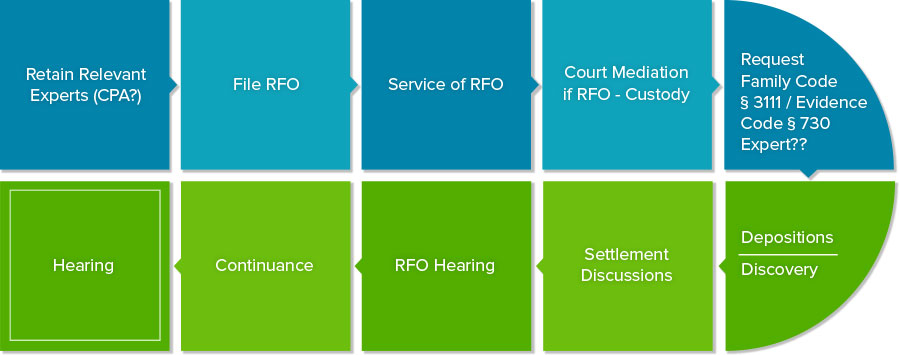
Potential Procedural Steps in a Request for Orders (RFO) – Modification
Child custody, child support, and spousal support orders are modifiable after the judgment is entered. A modification generally requires a change of circumstances, but there are exceptions.
Divorce courts have jurisdiction to modify child support orders, child custody matters, and spousal support orders, unless the parties have agreed that they are non-modifiable. Modifications are brought before the divorce court by the filing of a Request For Order (RFO).
Can Parties Contract With Each Other That Child Custody and/or Child Support May Not Be Modified?

Physical and Legal Custody
All child custody orders are modifiable and all parts of a child custody order are modifiable. Even an order that specifically states that it is not modifiable, is modifiable. The divorce court will not enforce a non-modifiable child custody order, in that a non-modifiable order is deemed to be contrary to public policy.
Temporary child custody orders may be, but rarely are modified. Practically speaking, the divorce courts are reluctant to modify a temporary child custody order unless there is an issue related to the safety of a child. The divorce courts are very reluctant to dedicate the court’s resources for multiple temporary custody hearings.
Under What Circumstances Will a Court Modify a Final Child Custody Order?
Final or permanent (also known as post-judgment) child custody orders may be modified if there has been a ‘significant change in circumstances’ since the last child custody order was entered. (IRMO Keith R.). It is the burden of the parent who is attempting to modify the child custody order to show that the required circumstances have changed. The changes that divorce courts look for in making this determination relate to the child’s health, education and welfare. Different divorce courts may evaluate changes of circumstances differently. Here also the family law courts have wide discretion.
A final child custody order is an order that specifically states that it is a final order or states that it is a “Montenegro” order. (IRMO Montenegro).
Under What Circumstances Will the Family Law Court Look to the "Best Interests" Test Versus the "Change of Circumstances" Test When Modifying a Child Custody Order?
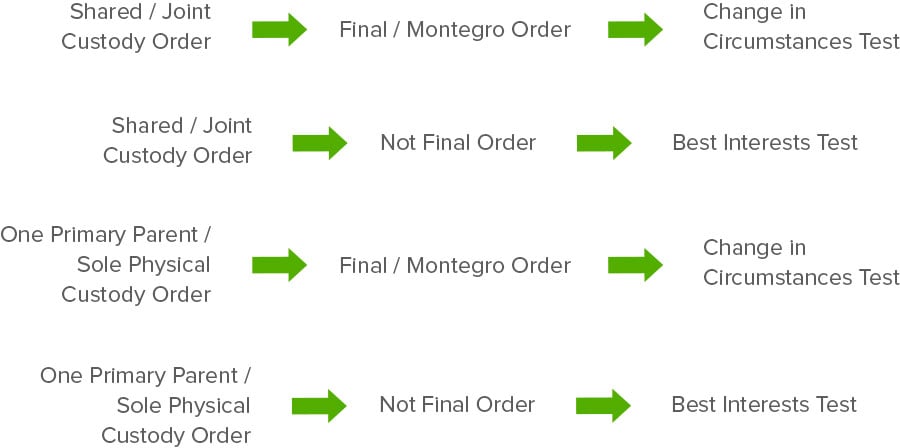
Standard for Modification
If the child custody order is not clearly designated as a “final” child custody order, a modification may be based on the child’s ‘best interests.’ The ‘best interests’ test has a lower threshold than the ‘substantial change in circumstances’ test. In other words, using the ‘best interests’ test, the divorce court may consider any and all relevant factors in making the determination, whereas with the ‘substantial change of circumstances’ test, the divorce court may only look to whether there has been a substantial change in the relevant facts and circumstances that existed on the date of the last child custody order. If there has not been a change in the facts and circumstances, the divorce court cannot modify the child custody order, even if the court believes that it would be in the child’s best interests to make a change in the order.
Can a Family Law Court Change the Residential Arrangement of Children Without the Existence of a Change of Circumstances?

Best Interests of Child
If the divorce court is simply changing the residential arrangement of a joint custody order, the matter may not be characterized by the court as a custody modification and a change of circumstances may not be required, even if the order is final. (IRMO Birnbaum).
Can a Parent Relocate a Child's Residence Without a Court Order?

“Move Away” Case
If one parent attempts to relocate the child’s residence, the child custody orders, will necessarily have to be modified. A party will, of course, be able to relocate their own residence. The question will be whether that parent will be allowed to change the residence of the child. When a divorce court makes the determination as to whether a parent may relocate a child’s residence, the divorce court must assume that the parent will move, regardless of whether that parent is allowed to relocate the child’s residence. The divorce court cannot make an order that provides for one custody order if the parent moves, and a different custody order if the parent elects not to move after learning of the court’s order.
If a parent has substantially more physical child custody time than the other parent, the moving parent does not need to prove that the move is necessary. (IRMO Burgess). The parent opposing the move must show that the move would be detrimental to the child. If detriment is proven by the non-moving parent, then the divorce court must determine whether a relocation is in a child’s best interests or whether a change of child custody to the non-moving parent is in the child’s best interests. In other words, the family law court must make a determination as to which parent the child will live with after the anticipated move.
What Factors Does a Family Law Court Look to When Determining Whether a Relocation of a Child's Residence May Occur?
The divorce court will look to a number of factors in making the determination relative to the move away: extent of shared child custody, willingness to place the children’s best interests first, reasons for the move, relationship of the child with each parent, distance of the move, age of the child, ability of the parents to cooperate and communicate, stability and continuity, relationship of the parents, and the child’s wishes (IRMO La Musga).
Where parents have a working, shared child custody arrangement, the divorce court must conduct a hearing to determine whether the relocation of the child’s residence is the child’s best interests.
If a child custody order has not been made, or if the child custody order is not a ‘final’ order, the family law court will use the ‘best interests of the child’ test in making the decision on the relocation.
Can a Parent Agree to a Child Support Order and Seek to Modify the Same Order the Next Week?
All child support orders and all parts of child support orders are modifiable by family law courts if the circumstances warrant a modification pursuant to the family code. The parties may agree to any level of child support they choose. However, such an agreement is not binding on either parent or the divorce court. A child support order that specifically and clearly states that it is non-modifiable is still modifiable. In other words, the parents can agree to a child support order that is below the guideline level and further agree that they will not seek to change the child support amount and the payee-parent could petition the divorce court the following day for a modification of child support to increase child support to the guideline level and generally that request will be granted. A child support order that is below guideline child support may be modified to the guideline number without a change in circumstances.
How is Guideline Child Support Calculated? What is the "High-Earner" Exception?

Child Support

Child Support
Child support is calculated using a computer program (Dissomaster/X-Spouse), taking into consideration a number of factors including: the parent’s respective incomes, child custody timeshare, deductions, etc.
Divorce courts are required to find the amount of guideline child support. That sum will become the order of the divorce court, unless the court departs from the guideline child support, which the court can do for ‘good cause.’ Departures from guideline child support may be, but rarely are, ordered. A divorce court has the discretion to set child support below the guideline amount, if the payor-parent is found to be a ‘high-earner.’ If a finding of ‘high-earner’ status is made, then the divorce court must first determine the guideline child support level. After the guideline child support is determined, the divorce court is required to find whether it is the child’s best interest to receive child support below the guideline level of child support.

Income Available for Support
Only if the court finds that the guideline child support is unjust, will the court depart from the guideline child support and reduce the amount of the child support.
Generally, the amount of child support will increase if the payor-parent’s income increases. However, it will not necessarily increase to the guideline level, if the amount of the parent’s income results in a finding of ‘high-earner’ status. The divorce court has wide discretion determining whether a parent is a ‘high-earner,’ and as to whether to depart from guideline child support. The income level that justifies a ‘high-earner’ finding may differ from county to county, and from courtroom to courtroom, within the Orange County Superior Court.
A divorce court may also depart from guideline for other equitable or economic reasons, if it finds ‘good cause.’ ‘Good cause’ may be found when a child’s special needs are involved, when there are special education related issues, in situations where there was a deferred home award, where the recipient parent is not paying for their share of child expenses relative to that parent’s time share, travel expenses, and other circumstances where, without a departure from guideline the child support level, would create inequitable and unjust results.

Time Share Factor

Income Factor
An agreement to pay child support in excess of guideline child support is not modifiable downward to the guideline amount, unless the payor-spouse’s income decreases and such a decrease constitutes a material change in circumstances.
A change in the income of either parent, or in the custody timeshare between the parents, often results in a modification of child support.
The divorce court does not have jurisdiction to retroactively alter child support relative to a period prior to the filing of a request for modification of child support by a parent.
Can a Family Law Court Modify a Non-Modifiable Spousal Support Order?
Spousal support orders are modifiable by the divorce court unless they specifically and clearly indicate that they are non-modifiable. If a spousal support order is designated as a non-modifiable order, the divorce court loses the ability to modify spousal support upwards or downwards regardless of the hardship that has occurred or may occur in the future. A divorce court cannot make an order for non-modifiable spousal support but parties may agree to such a provision.
What is the Basis to Modify a Spousal Support Order?
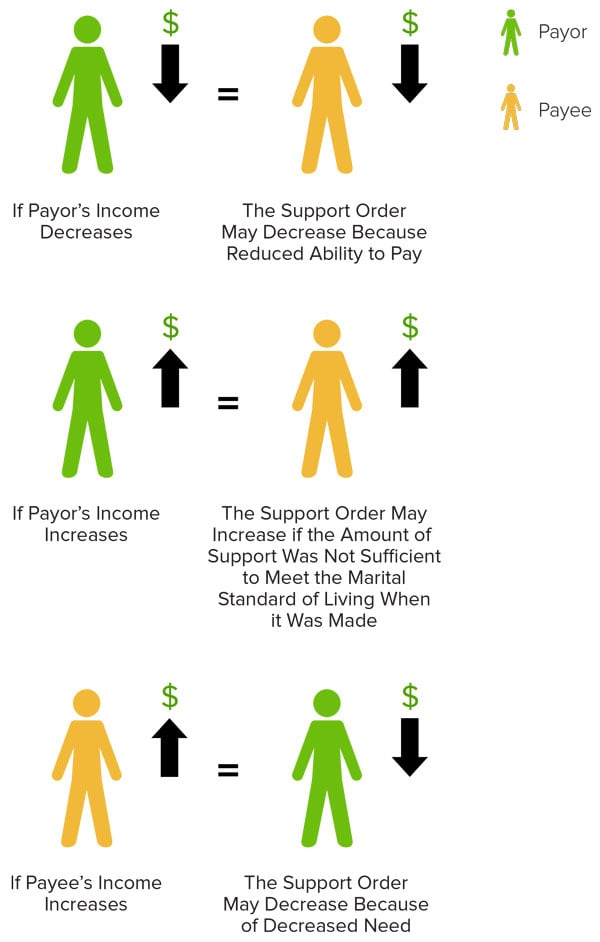
Spousal Support is Modifiable
The basis for a modification of a spousal support order is a ‘change in circumstances.’ The ‘change in circumstances’ test applies to both divorce court orders and to stipulations entered into by the parties. The circumstances that are evaluated by the divorce courts in determining whether an order should be modified, generally relate to the changes in the respective needs of each party and the changes in the respective earnings of each party.
The ability to earn versus the actual earnings, may also be relevant in the analysis.
In the analysis as to whether to impute income to a party relative to spousal support, the divorce court is to look to a reasonable work regimen for the industry involved. (IRMO Simpson). A court need not find a bad faith motive on the part of the payor (who is unemployed or under-employed) in order to impute income to a party. (IRMO Padilla).
The loss of a well-paying job and a good faith effort to obtain another well paying job that results in a lower level of compensation will generally constitute a change of circumstances and a reduction in spousal support.
Unrealized expectations relative to earnings may also be relevant and may constitute a change in circumstances. (IRMO Beaust). The failure of a supported party to become employed or self-supporting may justify a modification of spousal support. Generally, the mere passage of time alone does not justify a modification of spousal support. (IRMO Wilson).
An increase in the earnings of the payor spouse by itself does not justify an increase in spousal support. For such an increase to constitute the basis for a modification of spousal support, the supported spouse must prove that his or her needs were not satisfied by the spousal support ordered in the judgment. In other words, if the amount of spousal support ordered in the divorce judgment was capped due to the payor party’s earnings and was not sufficient to meet the supported spouse’s marital standard of living at the time the divorce judgment was entered, an increase in the income of the supporting spouse may constitute the basis for an increase in spousal support. (IRMO Hopwood and IRMO Hoffmeister).
Marital standard of living is relevant to a modification of spousal support but it is just one of many factors and it is not dispositive (IRMO Smith) and the marital standard of living is less significant with the passage of time. (IRMO Rising).
The supporting spouse cannot be required to work beyond the date of normal retirement for the industry in question in order to pay spousal support to the supported spouse. In other words, you cannot impute earnings to a party after the normal retirement age of 65. (IRMO Reynolds).
For How Long is Spousal Support Payable?

Duration of Spousal Support
Spousal support may be modified based on the length of the marriage, depending upon the specific terms of the judgment.
An increase in guideline child support may be a factor in considering a reduction of spousal support. (IRMO McCann). The termination of child support may require an increase in spousal support. (IRMO Kacik and Family Code section 4326).
In determining whether to modify or terminate spousal support, the divorce court will look to the supported spouse’s history of seeking employment back to the initial divorce judgment, not just since the date of the last hearing that addressed the issue of spousal support. The divorce court will look to whether the supported spouse has made reasonable and good faith efforts to become self-supporting. (IRMO Schaffer II).
Generally, the income of the supporting spouse’s new spouse is not considered by a divorce court relative to a modification of spousal support, other than for tax brackets.
All spousal support orders are modifiable unless they provide specifically for non-modifiability. (IRMO Zlatnik).
Can the Cohabitation of a Supported Spouse Result in the Termination or Reduction of Spousal Support?

Termination of Spousal Support
Cohabitation of the supported spouse with a third party may constitute the basis for a modification or termination of spousal support by the divorce court. There is a rebuttable presumption of reduced need when the supported spouse is cohabiting. It is not necessary for the parties to be married to find cohabitation. It is the burden of the supported spouse to rebut the presumption of reduced needs, if cohabitation is found to exist.
Can a Party Obtain an Order That Retroactively Modifies Spousal Support?

Spousal Support Retroactivity
Spousal support may not be modifiable to a date that precedes the filing of the Request For Order (RFO) filed with the court to modify spousal support.
Do Family Law Courts Determine Parentage?
Parentage or paternity matters are resolved in the family court, along with child support and other child related issues.
Family law courts have jurisdiction to determine parentage. In other words, family law courts may determine the identity of the parents of a child using genetic testing. Once parentage is established, a person has all the rights of a parent, may obtain custody/visitation orders, and may be ordered to pay child support.
Parentage litigation is resolved in the family law courts. This area of the law is decided based on statutes, case law, and a number of very significant presumptions. The laws are designed to protect the best interests of the child and follow common sense.
Can Parentage Cases Also Involve Child Custody Support Issues?
Paternity cases may also involve other child custody issues and child support, which are both determined by the same laws that control these issues in divorces.
California Paternity laws are based on the Uniform Parentage Act (UPA), which was adopted in 1975, but is not limited to the provisions of the UPA.
Do Parentage Laws Rely, in Part, on Evidentiary Presumptions?
Paternity laws are based, in part, on presumptions. It is conclusively presumed that the child of a wife cohabiting with her husband, who is not impotent or sterile, is conclusively presumed to be a child of that marriage. This presumption may be applied against a man who is the biological father of the child. A divorce or separation does not impact this conclusive presumption. The presumption will be applied, unless it would result in a bizarre and illogical outcome. The presumption will not be applied against the biological father, in favor of the presumed father, where there was no relationship between the child and the biological father.
Are Retirement Plans Earned During the Marriage Community Property?
Retirement plans are a form of compensation; and compensation earned during the marriage is community property. In a family law matter, retirement plans must be characterized as either separate or community property, and if community property, they are valued and divided.
Is There More Than One Type of Retirement Plan?

Two Basic Types of Retirement Plans
Retirement plans fall into two main categories: defined contribution plans and defined benefit plans.
Are Contributions to Retirement Plans During the Marriage Community Property?
If a plan, or part of a plan, was earned during the marriage, that part will be characterized as community property. There may be issues as to when a retirement plan, or a portion of a retirement plan, was earned. The divorce court determines which part of a plan is community property using case law and the date of separation. The earnings, accumulations and losses relative to the community interest in a plan will be characterized as community property.
What is a QDRO?
Depending on the type of plan, a Qualified Domestic Relations Order (QDRO) may be required to distribute the non-employee’s share of a plan without income tax consequences. The QDRO is prepared by an attorney who specializes in this area of the law. The benefits in retirement plans are pre-tax, and this tax status affects how the community share of the plan fits into the overall settlement structure.
What Issues Do the Divorce Courts Look to When Characterizing and Valuing a Retirement Plan?
California divorce courts characterize and value retirement plans in a divorce based upon these and other factors:
- type of plan
- increase in plan value during the marriage
- contributions to the plan during the marriage
- specific contractual terms of the plan
- performance of plan assets
- age of the employee
- years of employment before and after the marriage
- first possible retirement date
- survivorship options
California divorce courts generally allocate retirement plan benefits between separate property and community property according to when the benefits were earned. Benefits “earned” during the marriage (after the date of marriage, and before the date of separation) are generally characterized as community property. Benefits “earned” before the date of marriage, or after the date of separation, are generally characterized as separate property.
What is a Defined Benefit Plan?
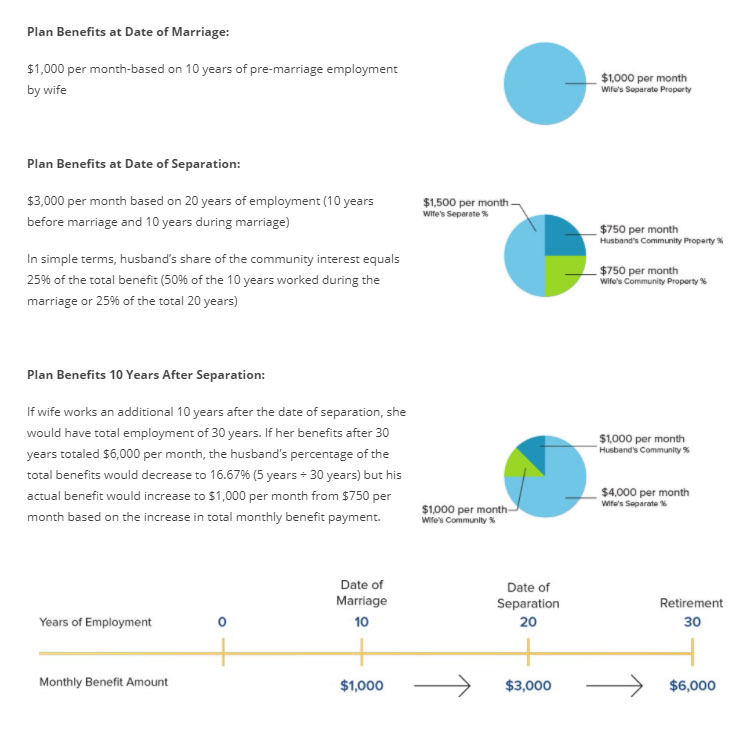
Example: Time Rule Applied to a Non-Military Defined Benefit Plan
Defined Benefit Plans are plans that generally provide for specific benefits, commencing at a specific age or date, and are payable for a defined period of time (e.g. $6,000 per month, commencing at age 55, and payable until death). This type of plan is valued by an actuary who calculates the present value of future payments using various assumptions and tables. The assets of the plan are not relevant to the value of the community interest in the plan.
Non-Military Defined Benefit Plans are generally allocated between community property and separate property using the “time rule.” The “time-rule” is a formula that measures work and participation in the plan during the marriage using a ratio of work and participation from before the marriage, and after the date of separation.
A traditional pension plan is a Defined Benefit Plan. The terms of a Defined Benefit Plan define the “benefit” to be paid by the plan to the participant/employee.
Military pensions are allocated by the divorce courts using the frozen benefit method. The community interest is fixed on the date of the divorce court order, and is calculated as if the service member had retired on that day.
What is a Defined Contribution Plan?

Example: Allocation Between Community Property and Separate Property
A Defined Contribution Plan is a plan that allows for a specific dollar contribution to be made into the plan annually. The plan functions similarly to savings account. Examples of these plans would include 401(k), IRA, SEP IRA, profit sharing plan, etc. The value of these plans is reflected on the employee’s current plan statement. An actuary is not used for the valuation. The money contributed into these accounts, after the date of the marriage and before the date of separation (and the earnings and losses on those contributions until division) is generally characterized as community property. Gains or losses on community (or separate) assets in a plan generally take on the character of the underlying assets, regardless of when the gains or losses occur.
The terms of a Defined Contribution Plan define the “contributions” that can be made into the plan.
Stock options, restricted stock, stock appreciation rights (SARs), profits units, phantom stock, and restricted stock units (RSUs) may be granted to employees as a part of a compensation package. Generally, they are all treated the same way by divorce courts. These types of assets have a risk of forfeiture, and are not taxable until they vest.
Once they vest, the employee has a contractual right to their ownership. Vesting may occur proportionally over several years (e.g. four or five years), which is referred to as tiered or “graded vesting,” or the vesting may all occur after a specific number of years, which is referred to as “cliff vesting.”
What Is Tracing?
Tracing is the procedure utilized to prove that a party’s separate property was the source of funds used to purchase an assset or make an expenditure that is reimburseable.
When Is Tracing Utilized?
Tracing is utilized when separate property and community property are commingled in an account or in an asset.
What Are Examples of Commingling?
Commingling occurs when separate property funds and community property funds are deposited into the same account, when separate property funds are used to purchase a jointly titled asset, when separate funds are used to make payments on a mortgage on a community asset or when separate funds are used to improve a community asset.
Does Commingling Separate Property with Community Property Result in a Gift of the Separate Property to the Community?
If a party can successfully trace then the separate property will be reimbursed to that party. If a party cannot trace, then the separate property will be characterized as community property.
Whose Burden Is it to Prove that an Asset Is Separate Property?
It is the burden of the Orange County divorce lawyer who represents the party who seeks to prove an asset is separate to prove that fact. It is also the burden of the separatizing party to have retained the records necessary to complete the tracing and prove te asset is separate property.
Who Actually Performs the Tracing?
A forensic accountant performs the tracing itself in conjunction with the client and the Orange County divorce attorney.
What Is the Cost of Tracing?
Tracing can be very expensive depending on how many accounts have to be analyzed and depending on the number of years of records involved. Before starting the exercise a careful cost-benefit analysis should be performed. If the forensic accountant estimates the project will cost $15,000 to $20,000 and the odds of successfully tracing are 20%, then the question must be asked if the tracing is successful how much separate property will be gained. The problem with this seemingly logical analysis is how can the accountant or the Orange County divorce lawyer realistically set a percentage chance of achieving a successful tracing. If the tracing approach being utilized is the direct or mechanical method the timing of one transaction out of hundreds over many years can cause the tracing to fail. It is not known if the tracing will be successful until all of the accounts have been analyzed, the math completed and the schedules prepared.
What Laws and Presumptions Play a Role in Tracing?
Assets acquired during the marriage are presumed to be community property. Funds withdrawn from a commingled account to pay community expenses are presumed to be community funds, as opposed to the separate funds of one party.
When Should Tracing Be Started?
Tracing should commence at the first opportunity. Tracing cannot be performed without the necessary records, and these records may have to be subpoenaed from banks or brokerage houses, which can take months. The actual tracing itself can also take months.
Is There More Than One Method of Tracing?
Tracing can be completed using the direct (mechanical) method, the family expense method (recapitulation), or another method that does not rely on speculation.
For a detailed explanation of tracing methods and examples, see Basic Tracing.
When Does a Family Law Court Order One Party to Pay Spousal Support to the Other?
A family law court may order one party to pay spousal support to the other, if that party has the need and the payor has the ability to pay. Spousal support payable before the judgment is entered is called temporary support, and spousal support paid after the judgment is called permanent spousal support.
What Issues Does a Family Law Court Look to When Making a Spousal Support Order?
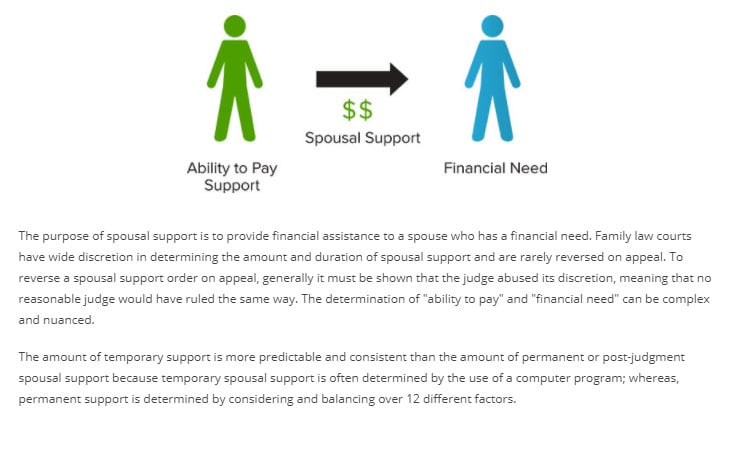
Spousal Support
If there is a demonstrated need by one spouse, and a demonstrated ability to pay relative to the other spouse, a divorce court will likely make an order for spousal support payable to the spouse in need. The determination of the amount, duration, and other terms of the spousal support order can be very complex.
What is Temporary Spousal Support?
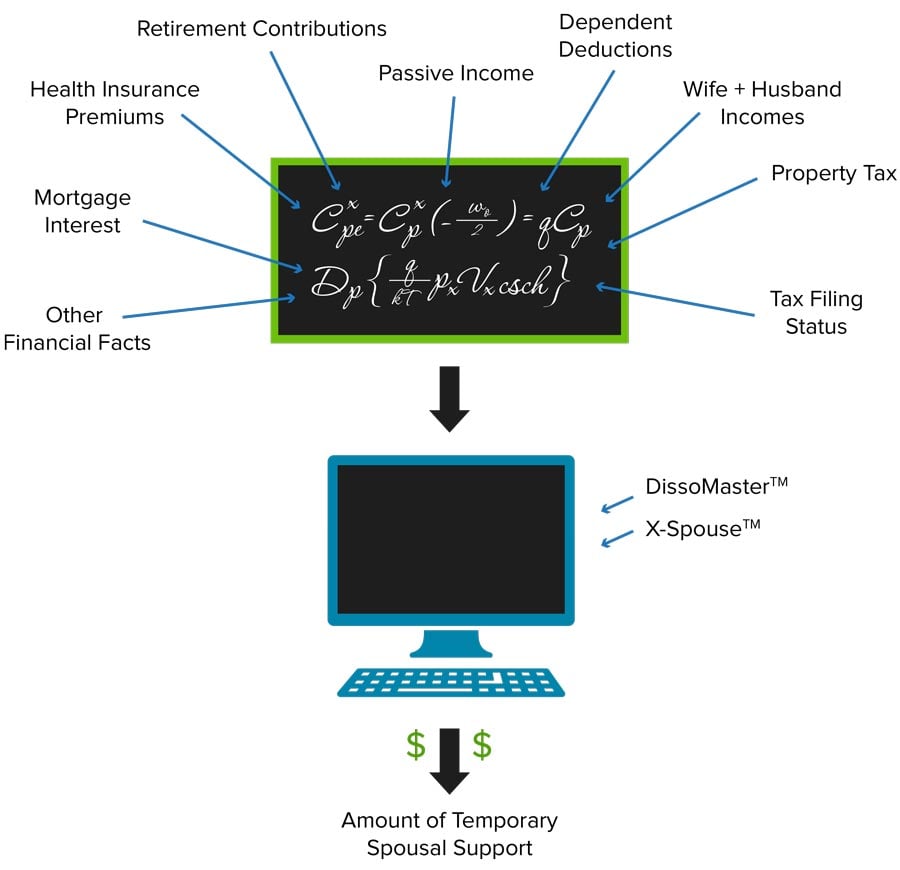
Temporary Spousal Support

Tax Issues
Spousal support paid prior to the entry of the Judgment is characterized as temporary spousal support or pendent lite spousal support. Temporary spousal support may be ordered at a Request For Order (RFO) and is designed to maintain the status quo of the parties, where possible. The amount of temporary spousal support is often determined with the utilization of a formula accessed through the use of a computer software program (DissoMaster or X-Spouse).
Temporary spousal support may be ordered retroactively to the filing date of the Request for Order (RFO) seeking spousal support. Generally, the payor-spouse is credited with payments made to the payee-spouse or paid for that spouse’s benefit. However, a spousal support order at the trial may not be made retroactive to the date of the Petition unless a spouse had previously requested temporary spousal support (Mendoza v. Cuellar). A family law court may order temporary spousal support pending the determination of issues involved in an Out-of-State divorce (Gromeeko v. Gromeeko).
What is Permanent Spousal Support?

Potential Sequence of Steps and Procedural Events in a Divorce

Spousal Support Retroactivity
At the divorce trial, permanent spousal support may be ordered. The term “permanent” is misleading because permanent spousal support may be ordered for a limited period of time. The term permanent is intended to distinguish this spousal support from temporary spousal support. This spousal support is also referred to as post-judgment or long-term spousal support.
How Does Temporary Spousal Support Differ from Permanent Spousal Support?
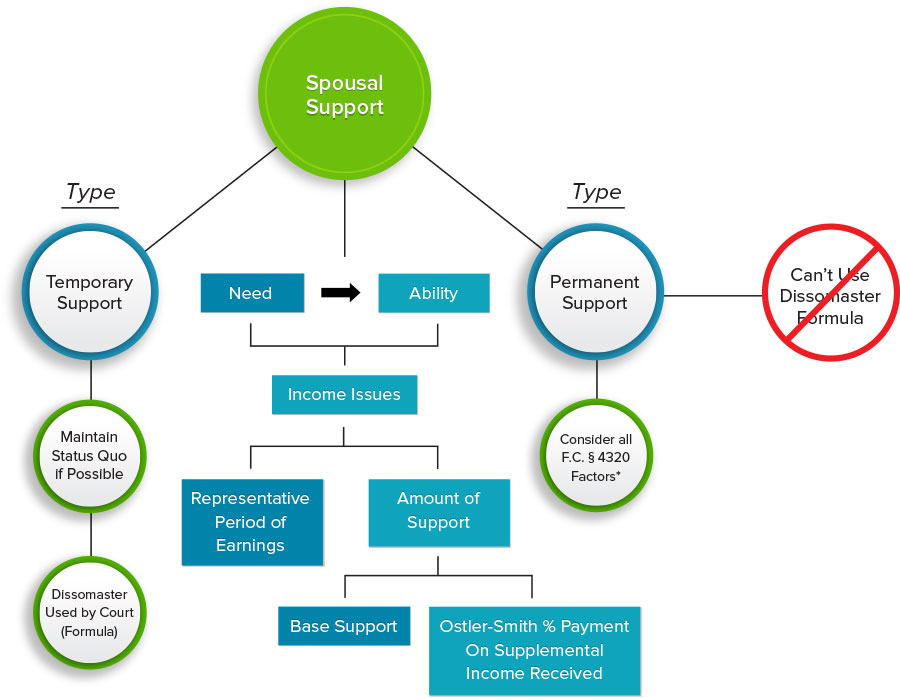
Spousal Support
It is not necessary to present evidence in the divorce trial to show a change of circumstances in order for the divorce court to have the ability to order a higher award of spousal support than it ordered for temporary spousal support (IRMO McNaughton). The family law courts look to different issues when determining premanent spousal support than when determining temporary spousal support. Temporary spousal support is designed to maintain the ‘status quo’ while permanent spousal support is based on the Family Code § 4320 factors.
The divorce court may not use the amount of temporary spousal support order as the basis for making a permanent spousal support order (IRMO Schulze).
Can the Family Law Court Structure a Permanent Spousal Support Award in Different Ways?
Permanent spousal support may have a number of different structures:
- Amount of the spousal support;
- Substantive stepdown (reduction in amount of spousal support at a later date);
- Jurisdictional stepdown (reduction of an existing spousal support order to an order with no payments but reserving to the payee the right to seek spousal support at a later date); and
- Reservation of jurisdiction (making no order for spousal support payments but reserving to the payee spouse the right to seek spousal support at a later date).
What are the Family Law Code § 4320 Factors That Family Law Courts Evaluate When Setting Permanent Spousal Support?
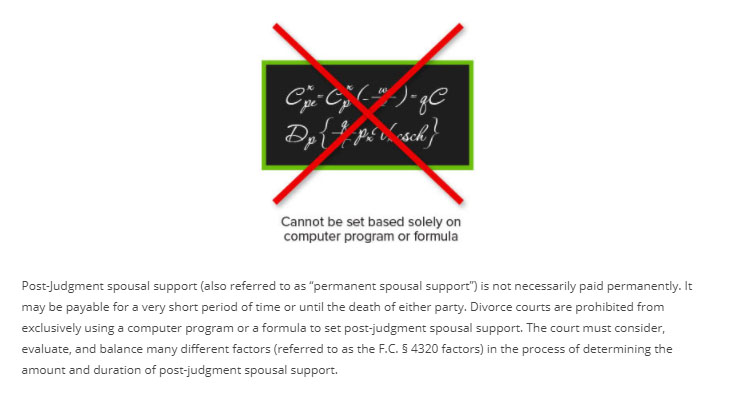
Permanent Support
The award of permanent spousal support is based on the factors set forth in Family Code § 4320 as opposed to being based on the “status quo” as is the standard for temporary support matters. The divorce court cannot set permanent spousal support exclusively using the computer software formula used in setting temporary spousal support. Family Code § 4320 sets forth specific factors that the divorce court must consider:
- The extent to which the earning capacity of each party is sufficient to maintain the standard of living established during the marriage, taking into account all of the following:
- The marketable skills of the supported party; the job market for those skills; the time and expenses required for the supported party to acquire those skills; and the possible need for retraining or education to acquire other, more marketable skills or employment.
-
The extent to which the supported party’s present or future earning capacity is impaired by periods of unemployment that were incurred during the marriage to permit the supported party to devote time to domestic duties.
- The extent to which the supported party contributed to the attainment of an education, training, a career position, or a license by the supporting party.
- The ability of the supporting party to pay spousal support, taking into account the supporting party’s earning capacity, earned and unearned income, assets, and standard of living.
- The needs of each party based on the standard of living established during the marriage.
- The obligations and assets, including the separate property, of each party.
- The duration of the marriage.
- The ability of the supported party to engage in gainful employment without unduly interfering with the interests of dependent children in the custody of the party.
- The age and health of the parties.
- Documented evidence, including a plea of nolo contendere, of any history of domestic violence, as defined in Section 6211, between the parties or perpetrated by either party against either party’s child, including, but not limited to, consideration of emotional distress resulting from domestic violence perpetrated against the supported party by the supporting party, and consideration of any history of violence against the supporting party by the supported party.
- The immediate and specific tax consequences to each party.
- The balance of the hardships to each party.
- The goal that the supported party shall be self-supporting within a reasonable period of time. Except in the case of a marriage of long duration as described in Section 4336, a “reasonable period of time” for purposes of this section generally shall be one-half the length of the marriage. However, nothing in this section is intended to limit the court’s discretion to order support for a greater or lesser length of time, based on any of the other factors listed in this section, Section 4336, and the circumstances of the parties.
- The criminal conviction of an abusive spouse shall be considered in making a reduction or elimination of a spousal support award in accordance with Section 4324.5 or 4325.
- Any other factors the court determines are just and equitable.
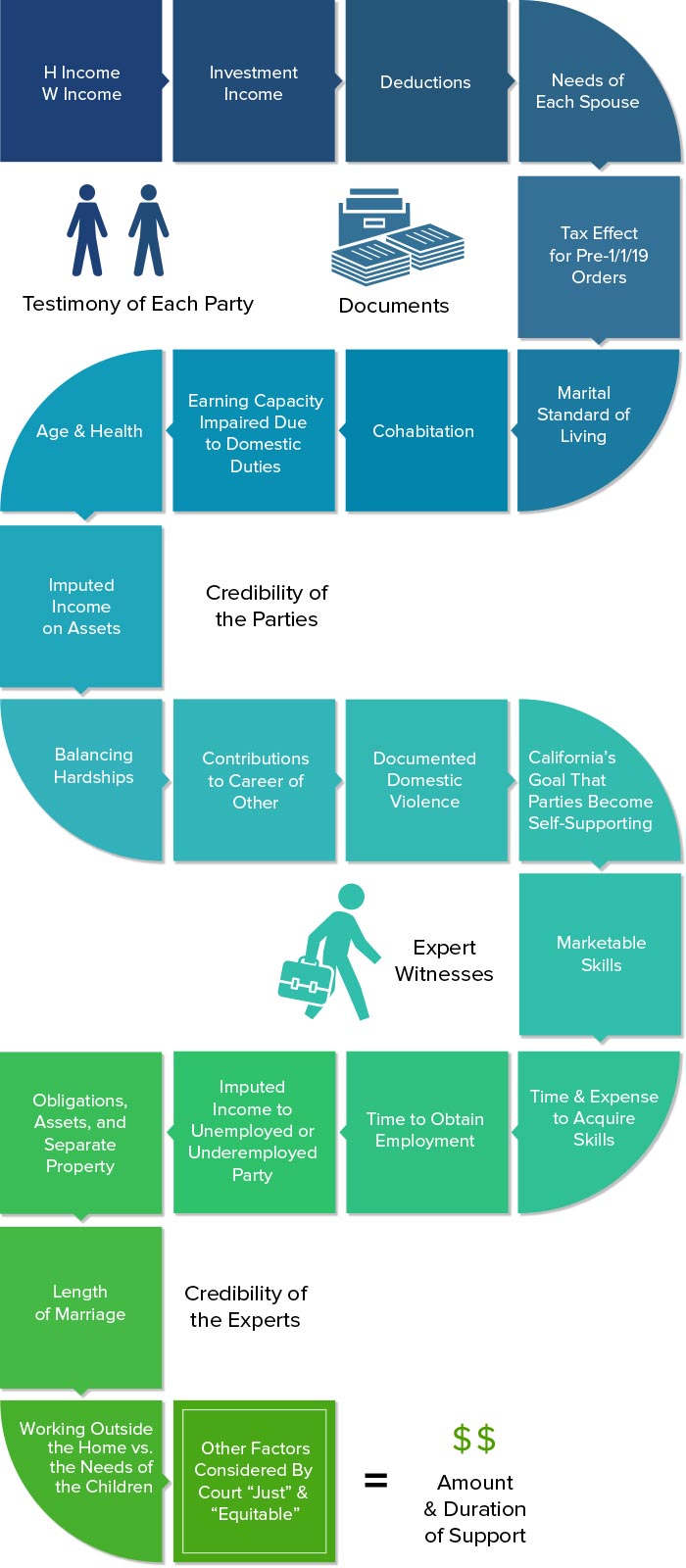
F.C. § 4320 Factors
Does the Amount of a Temporary Spousal Support Order Set a Precedent for the Permanent Spousal Support Order?
The amount of the temporary spousal support is not a factor relevant to the determination of the permanent spousal support order in that they are based on differenct criteria (IRMO Schulze).
Is the Marital Standard of Living One of the Important Family Code § 4320 Factors?
The marital standard of living is relevant to the determination of spousal support. However, it is just one of the Family Code Section 4320 factors (IRMO Smith / IRMO Zywiciel). It is neither a ceiling nor a floor for the amount of spousal support. The marital standard of living may be looked at by the divorce court as a benchmark. The divorce court may define the marital standard of living specifically with a dollar level or generally in terms like “middle class standard of living” (IRMO Kerr).
How is the Marital Standard of Living Measured?
The marital standard of living may be based on the party’s actual recurring living expenses or it may be based on the net income of the parties. The theory that gives rise to using the net income approach, simply characterizes savings and investments as a life style choice. This approach does not distinguish between spending money on a vacation and spending money on stocks and bonds (IRMO Winter / IRMO Drapeau / IRMO Weinstein).
Does the Marital Standard of Living Lose Its Importance Over Time?
The marital standard of living is less important after a long period of separation (IRMO Rising).
Are There Circumstances Where a Party Will be Required to Sell Assets to Pay Support?
The divorce court may require the payor spouse to liquidate capital assets to pay support and meet the martial standard of living if that was the practice during the marriage (IRMO Deguigne).
Is the Payor's Marital Standard of Living as Important as the Payee's Marital Standard of Living?
The divorce court must consider the marital standard of living of both parties, not just that of the payee spouse (IRMO Andreen).
How Long Does Permanent Spousal Support Last?
Divorce courts have wide discretion in setting the length of time that spousal support is to be paid. Generally, spousal support cannot be terminated in a long-term marriage unless the spouse is self-supporting.
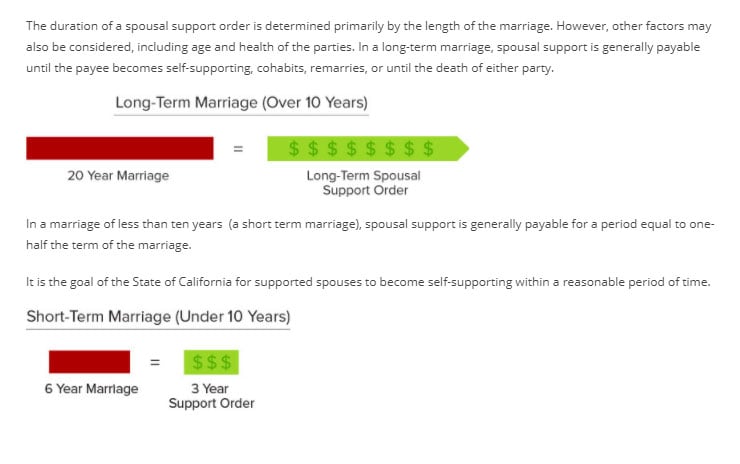
Duration of Spousal Support
In a long-term marriage, a spousal support order generally provides that the payments will continue until the death of either party, the remarriage of the payee-spouse or future order of court.
It is the goal of the State of California, for supported spouses to become self-supporting within a reasonable period of time. In marriages of less than ten years, “reasonable” is generally defined as one-half the length of the marriage. A long-term marriage is a marriage of ten years or more in duration.
Generally, divorce courts will order spousal support to be paid for one-half the length of a marriage under ten years In other words, the order will most likely be for two and one-half years after a five-year marriage. However, the divorce court has discretion to order support for a fewer or greater number years. In measuring the length of the marriage, a court cannot add any periods of cohabitation to the length of the marriage (IRMO Bukaty).
Spousal support cannot be ordered by a divorce court in one lump-sum. However, parties may voluntarily agree to a lump sum buy out of spousal support.
Can a Family Law Court Order Spousal Support Payable on Fluctuating Income?
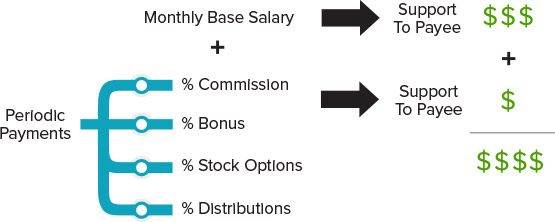
The Ostler-Smith Order
If the payor spouse receives commissions, stock options, bonuses or other fluctuating forms of income, the spousal support order may be structured by the divorce court with a base spousal support payment and a supplement spousal support payment, payable if and when the additional income is received. The supplemental spousal support payments are referred to by divorce courts as “Ostler-Smith” payments (IRMO Ostler and Smith).
Can a Family Law Court Make an Order That Reduces the Spousal Support After a Period of Time?
A Judgment that provides for a future reduction in the amount of spousal support is a “substantive stepdown.” The divorce court may stepdown the amount of spousal support payable by the payor-spouse only if the evidence supports a finding of a reduced need of the payee-spouse on the date of the future spousal support stepdown.
Can a Family Law Court Make an Order That Reduces Spousal Support to Zero?
A Judgment that reduces spousal support to zero at some point in the future is a jurisdictional stepdown order. Such a divorce court order must be supported by evidence that supports a finding that the payee-spouse will not have a need for spousal support on the date of the stepdown to zero.
The divorce court may order that spousal support shall terminate on a specific future date, unless the supported spouse asks the court to extend support before the termination date (IRMO Richmond).
Are the Incomes of the Parties One of the Most Significant Factors in Determining Spousal Support?

The Ostler-Smith Order
The primary factor looked at by the divorce court, in determining the amount of spousal support is income. The definition of income is the subject of statutory law and many cases interpreting the statutes. Income available for spousal support and child support may be defined by the divorce court differently.
How is a Lump-Sum Severance Payment Treated Relative to Spousal Support?
Lump-sum severance compensation is to be spread out over the termof employment for which it is being paid and not allocated to the month in which it is received (IRMO Tong and Samson).
How Are Stock Options Treated Relative to Spousal Support?
Unvested stock options, or Restricted Stock Units, may be characterized as income once vested (IRMO Kerr and IRMO Macilwaine).
What Other Gray Areas Exist Relative to the Definition of Income?
Free rent and meal allowances may be income. Deferred salary is income, as are recurring payments from family members (gifts) that are not loans or early inheritance. Unallocated, lump-sum, personal injury recovery, or annuity, payments are generally not characterized as income. Student loans and unrealized gain in shares of stock are not income. The proceeds received from the sale of stock that were reinvested are not income available for support.
In Determining a Party's Earnings Relative to Support, Does a Family Law Court Average Earnings Over a Number of Years or Use the Last Twelve Months of Earnings?
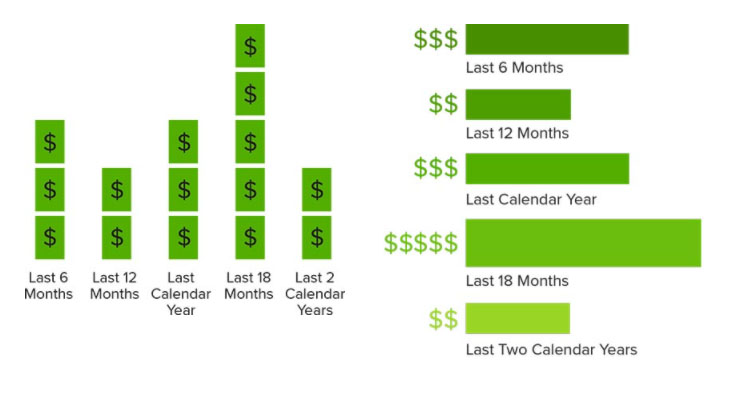
Representative Period of Earnings
The divorce court has wide discretion in determining what period of time to look to in establishing each party’s earnings. However, the court must select a period of time that is reasonable and reflects a representative period of time (IRMO Riddle). In other words, a court should not average earnings over four years in a situation where the party started a new job one year ago.
Can the Family Law Court Impute Income on Assets That Is Not Actually Being Earned?
The divorce court may impute income on assets of either party.
A court may impute earnings on the payee’s share of community property income from a new marriage (IRMO Martin).
A divorce court may impute earnings on liquidated or sold assets (County of Kern v. Castle).
Can a Court Require a Party to be Examined by a Vocational Rehabilitation Expert?
A divorce court may order a spouse to participate in a vocational examination to evaluate their ability to earn an income and become self-supporting.
Can a Family Law Court Impute Income to a Party That Is Not Actually Being Earned?
Appellate court divorce cases support the imputation of income to a party, if the facts warrant such action. The burden to prove that a party is deliberately depressing their income or could earn more money, is on the divorce lawyer representing the party seeking to prove underemployment (IRMO Regnery).
The cases are split on whether the motive for suppressing one’s income is relevant (IRMO Meegan [Yes] / IRMO Ilas [No]).
The attorney representing the party seeking to impute income must prove the earning capacity of the other party (IRMO Flaherty).
A divorce court may impute earnings to a party who has intentionally reduced their income, but it must do so based on a normal work regimen for a person holding a similar job, and may not impute income assuming excessive hours or overtime (IRMO Simpson).
Income may be imputed to a party who voluntarily leaves a job, at the level of prior compensation (IRMO McHugh). The divorce court need not find a bad faith motive on the part of the payor in order to impute income on that party (IRMO Padilla).
Income may be imputed to the custodial party, only if the imputation is consistent with the children’s best interests (IRMO Ficke / IRMO Labass and Munsee / IRMO Hinman).
Voluntarily deferring income is not a basis for a modification of spousal support (IRMO Berger).
The divorce court may not impute income to a party after the age of 65 (IRMO Reynolds).
Are Temporary Spousal Support Orders Modifiable?
Divorce case law states that there need not be a change in circumstances to modify a temporary spousal support order. However, most divorce courts require a change in circumstances before modifying an order unless the action relates domestic violence. Spousal support can be modified retroactively only to the date of the filing of a Request For Order seeking to modify the support.
Are All Permanent Spousal Support Orders Modifiable?

Spousal Support is Modifiable
A permanent spousal support order may be modified by the divorce court upward or downward if there has been a change in circumstances (IRMO Clements).
What Circumstances Support a Modification of a Spousal Support Order?
A court is to look to all circumstances when determining whether to extend spousal support (IRMO Wilson).
There are many circumstances that may justify a modification of a permanent spousal support including the following:
- Decrease in income of the payor-spouse;
- Increase in income of the payee-spouse;
- End of child support;
- Discharge by payee-spouse of all community debts assigned to payee (IRMO Clements);
- Unrealized expectations that payee-spouse would be self-supporting (IRMO Beaust);
- Payee’s support of adult children (IRMO Serna);
- Cohabitation and romantic relationship;
- Increase in child support (IRMO McCann);
- Payor-spouse’s 65th birthday and retirement (IRMO Reynolds).
What Are Examples of Events That May Not Constitute a Change of Circumstances?
The following may not constitute a change of circumstances:
- Payee-spouse paying expenses of daughter and two grandchildren (IRMO Serna);
- Ability to access retirement funds without penalty (IRMO Dietz);
- Generally, mere passage of time;
- Increased income by payor-spouse without a showing by the payee-spouse that the original award failed to meet the marital standard of living;
- Payee-spouse’s pursuit of an advanced degree as opposed to obtaining a job; and
- Payee-spouse’s continued disability in a short-term marriage.
Are Expectations Relevants to a Spousal Support Order?
Reasonable expectations of the parties, expressed or impliedly expressed, in a marital settlement agreement may impact the change of circumstance test (IRMO Dietz).
Does an Increase in the Payor's Income Justify an Increase in Spousal Support?
Spousal support may be modifiable if the payor’s income has increased and the recipient spouse demonstrated that their needs were not met with the initial permanent spousal support order (IRMO Hopwood and IRMO Hoffmeister).
Can a Spousal Support Order be Based on New Mate Income?
The income of a new spouse is generally not a source for spousal support.
Can a Family Law Court Look to a Payee's Entire Work History Since Separation in Determining Whether to Modify Spousal Support?
In a modification context, the divorce court may look to the payee-spouse’s entire employment history, to determine the payee’s good faith in attempting to obtain reasonable employment and become self-supporting, not just the conduct since the last hearing (IRMO Schaffer).
Even without bad faith, failure to make reasonable efforts to seek employment may justify a divorce court’s decision not to extend spousal support (IRMO Sheridan). Irresponsible financial management may justify the termination of spousal support and jurisdiction (IRMO McElwee) by a divorce court.
Can Cohabitation be the Basis to Modify Spousal Support?
Spousal support may be modified or terminated if the payee-spouse is cohabiting in a romantic relationship. There is a rebuttable presumption of reduced need when cohabitation exists (IRMO Regnery). To rebut this presumption, the divorce lawyer representing the cohabiting spouse must prove that their client’s needs have not been reduced. The parties need not hold themselves out as married for the presumption to apply. Expenses such as vacations being paid for with joint funds, expensive gifts and paying for joint bills and household living expenses are relevant. A former spouse giving away services as a homemaker, housekeeper, cook, and companion are relevant issues.
Can a Family Law Court Make a Spousal Support Order Non-Modifiable?
All divorce court’s orders are modifiable, unless they were made non-modifiable by a stipulation of the parties. A divorce court cannot make a spousal support order non-modifiable, without the consent of the parties (IRMO Zlatnik).
Can Spousal Support be the Source of Family Code § 271 Financial Sanctions Payable to the Other Party?
The divorce court may order Family Code Section 271 sanctions be paid from spousal support as in spousal support is one of the types of income intended to be a source for sanctions, so long as the order does not create unreasonable financial hardship (IRMO Pearson).
Are Spousal Support Payments Tax Deductible?
Orders for spousal support made after December 31, 2018 are not tax deductible.
Permanent spousal support payments may be tax deductible, if entered with the court before December 31, 2018. Modification of an order entered before December 31, 2018 may continue to be tax deductible to the paying party.
If spousal support is tax deductible to one party, it is taxable income to the other party.
Is Documented Domestic Violence Relevant to a Spousal Support Order?

Domestic Violence
The divorce court must consider any history of documented domestic violence when making a spousal support order (IRMO Priem and IRMO J.Q. & T.B.).
Can Stock Options That Vest During the Marriage be Community Property?
Stock options are a form of compensation and if they vest, or partially vest, during the marriage, all or, a portion, of the options will likely be characterized as community property. There are several different formulas that are used to characterize stock options. The court has significant discretion in the selection of the formula, so long as the order accomplishes substantial justice.
In What Situations Are Stock Options Allocated Between Community Property and Separate Property?

Cliff Vesting
In a California divorce, stock options granted during the marriage, and/or partially vested during the marriage, may have a community property component. Stock options that are earned partially during the marriage are allocated between community property and separate property. Statutory law provides that “earnings” during the marriage are community property. If a spouse is compensated during the marriage, in part, with a grant of stock options that partially vest during the marriage, the stock options will most likely be characterized as being, at least partially, community property. If a spouse’s employment during the marriage results in partial vesting of stock options granted before the date of the marriage, the options will also most likely have a community property component.
Is There More Than One Way to Allocate Stock Options?
The number of options allocated between separate property and community property can vary depending upon which formula is used by the court.
There are three basic formulas (IRMO Nelson, IRMO Hug and IRMO Harrison) used to allocate options between separate and community property. Generally, the community’s percentage interest in stock options that vest after the date of separation decreases as each year passes.
What Factors Do the Courts Consider in Determining What Formula to Use to Allocated Stock Options Between Community and Separate Property?
Divorce courts look to a number of factors in determining which formula to use:
- When was the grant made;
- Was the stock option granted to attract or retain the employee;
- Was the stock option granted for past service;
- Was the stock option granted to compensate for under-compensation;
- What are the forfeiture provisions;
- What type of vesting exists (cliff vs. tiered);
- What are the vesting dates;
- What are the vesting provisions;
- Are the stock options designed as “golden handshakes” to retain the employee;
- What was the strike price at the time of grant;
- When did the parties separate;
- When did the parties marry;
- Is there more than one type of vesting; and
- Is there a performance vesting provision.
Is There More Than One Type of Vesting?
Stock options may be granted to employees as a part of a compensation package. Generally, these type of grants have a risk of forfeiture until they vest. Once the options vest, the employee has a contractual right to their ownership. Vesting may occur proportionally over several years (e.g. four or five years), which is referred to as tiered or “graded vesting,” or the vesting may all occur after a specific number of years,which is referred to as “cliff vesting.”
If the options have a performance requirement (e.g. financial milestones or hurdles), then the options will not fully vest until this requirement is satisfied.
Are Some Premarital Agreements Invalid?
Parties have the option to enter into a premarital agreement before the marriage. If they follow the rules, the agreement will likely be a valid and enforceable document.
Can Premarital Agreements be Invalid and Unenforceable?
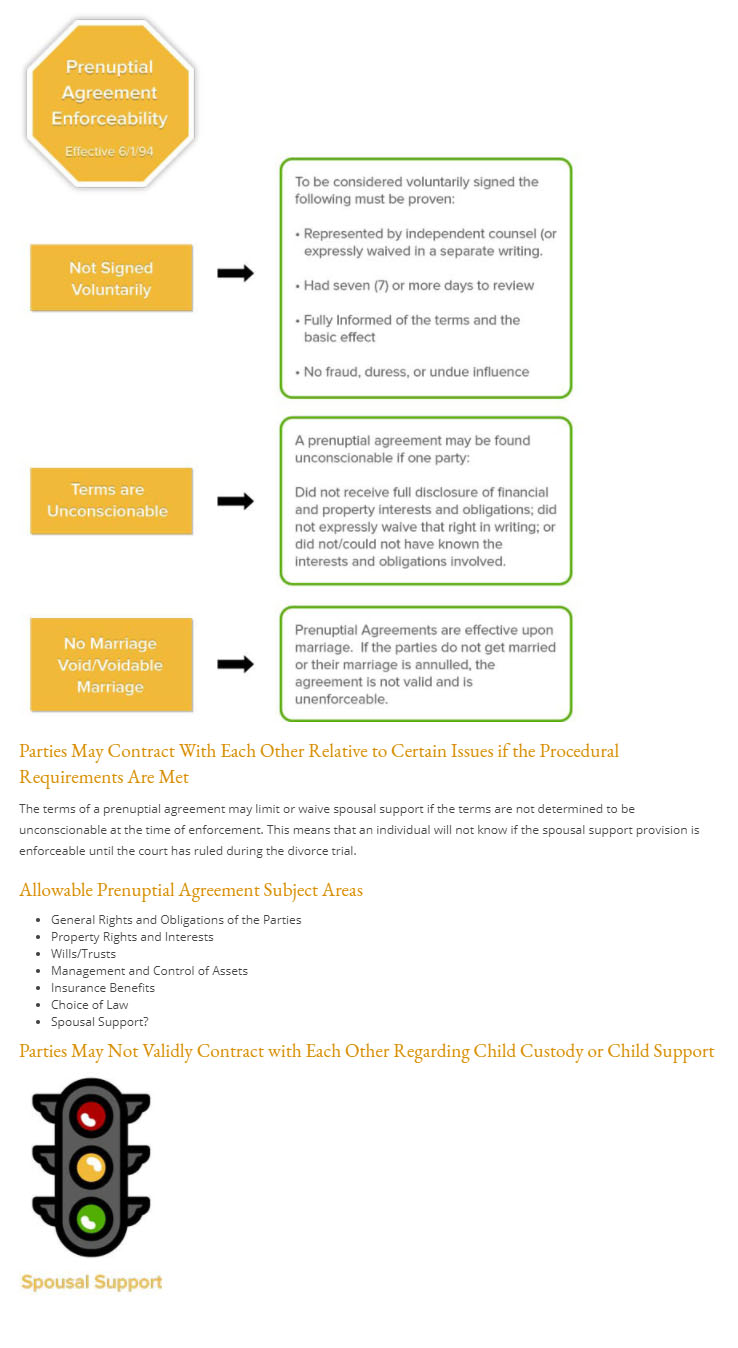
Prenuptial Agreements
When parties enter into a premarital or postmarital agreement, there may be issues of interpretation and/or validity in a future divorce proceeding. There are specific presumptions that apply to these agreements, some of which are rebuttable and can be overcome with sufficient evidence. The law has changed several times over the years regarding the issues that may be addressed in a premarital agreement. It is critical to know the law as it existed on the date the premarital agreement was executed. (IRMO Melissa). If the parties do not agree as to the validity of an agreement, the divorce court will determine the validity. Trials on these issues can be extensive, and may involve issues related to unconscionably, the nature of the relationship between the parties when the agreement was executed, undue influence, voluntariness, lack of accurate disclosures, compliance with family code requirements regarding the execution of the premarital agreement, and issues of contractual interpretation.
If a Prenuptial Agreement is Valid, Can it Replace Some Specific Community Property Laws?

Separate Property

Community Property
A premarital agreement allows parties to alter many of the community property laws that would apply if they elected to divorce in the future. These agreements, if valid, essentially replace some specific community property laws that impact marital issues.
A premarital agreement can convert what would have been community earnings into separate property earnings. Generally, separate property income is defined as being generated before marriage, after separation, or earned by separate property assets during the marriage.
Separate property is property acquired before marriage, after separation, or during marriage by the way of inheritance, qualified gifts, or acquired with other separate property. Premarital agreements may alter these laws.
Can a Prenuptial Agreement Alter Community Property Laws Related to Gifts Between Spouses?

Intention by Itself is Not Sufficient to Make a Gift a “Gift”
To be valid, gifts between spouses must meet the specific qualifications of the California Family Code. A clear intention, by itself, to give an item to a spouse, may not replace or overcome the requirements of the Family Code. There are no restrictions on gifts of apparel, jewelry, or other tangible articles of personal nature principally used by the recipient spouse that are not substantial in value, considering the economic circumstances of the marriage.
A vehicle of any price cannot be characterized as a gift, as it is not a tangible article of a personal nature. Whether items of art or furniture can be items primarily used by one spouses are questions of circumstance.
Premarital agreements may alter the rules relative to the definition gifts.
Are There Specific Requirements for the Validity of a Premarital Agreement That Are Different Than Other Contracts?
To be a premarital agreement, it must comply with a number of requirements. Premarital agreements must be “acknowledged,” or its equivalent. (IRMO Cleveland). There must be at least seven days between the premarital agreement’s first presented and it being signed. (IRMO Cadwell-Faso & Faso and IRMO Clarke & Akel). A failure to comply with these, and others requirements will result in the agreement being invalid. Premarital agreements have specific requirements and are different than other contracts due to the relationship of the parties and the public policy, to protect people in these situations.
Can Parties Contract With Each Other in a Prenuptial Agreement Relative to Child Custody or Child Support Issues?
The terms of a premarital agreement cannot bind a divorce court relative issues related to child custody or child support and the parties cannot bind the family law court to follow a specific standard of review, relative to future child custody matters. Nor can the parties cannot bind the family law court relative to move away/relocation issues (IRMO Abrams) or the standard of review for the modification of child support. (IRMO Cohen).
Can a Pre-Nuptial Agreement be Valid for Two Marriages Between the Same Two People?
A premarital agreement executed before the first marriage does not apply to a second marriage with the same person. (Barham v. Barham).
Can a Failure to Comply with the Terms of a Pre-Nuptial Agreement Invalidate the Agreement Itself?
Depending on the circumstances, a party’s failure to perform certain obligations under a premarital agreement may be a defense to prevent its enforcement. (In re: Warner’s Estate).
Can a Party Waive the Right to Disclosure?
Parties cannot waive the Preliminary Declaration of Disclosure but can waive the Final Declaration of Disclosure. However, a mutual waiver of the final declaration of disclosures does not relieve a party of the duty to disclose all material facts and information about all community and separate property and debts.
There must have been an opportunity to know the full extent and nature of the assets and net worth of the opposing party. Each party must disclose all material facts and information relative to community property and his or her separate estate. However, one court ruled that if a spouse waives the opportunity to investigate the extent of the assets and debts, a post-marital agreement will not be set aside unless there was a misrepresentation or concealment of the facts.
When Does a Premarital Agreement Promote Divorce?
A premarital agreement will not be enforced if it is promotive of divorce. (IRMO Dajani). However, a property settlement in a divorce that creates a substantial benefit to one spouse will be enforced when it is clear that the marriage is over. (Glickman v. Collins). A court held that a provision in a premarital agreement awarding one spouse $100,000 if a divorce occurred was enforceable in that the payment was, in effect, a replacement for the spousal support that the wife would forfeit if she married the husband. (IRMO Bellio).
A California divorce may involve a premarital agreement entered into in another state which may raise unique issues relative to the invalidity and/or enforceability of the premarital agreement or portions of the agreement. As an example, a New Jersey Court upheld the parties’ stipulation entered into in California to be bound by an arbitration order. (Delorean v. Delorean).
Can Parties Contract With Each Other to Provide for Penalties for Certain Types of Personal Conduct?
There are certain subject areas that cannot validly be included in a premarital or postmarital agreement. For example, the parties cannot provide for a penalty to a spouse for being sexually unfaithful. (Diosdado v. Diosdado). The parties cannot provide for forfeitures related to conduct like using illegal drugs. (IRMO Mehren & Dargan).
Can Parties Waive or Limit Spousal Support in a Premarital Agreement?
The law now allows for parties to contract with each other relative to the terms of a spousal support in a divorce in certain circumstances. This changes the prior prohibition of addressing spousal support in a premarital agreement. (In re Nelson’s Estate). However, a provision relative to spousal support will not be enforceable if a family law court determines that the provision is unconscionable at the time of the divorce.
Pending the determination of the validity of a premarital agreement, a divorce court may grant temporary spousal support. (Gromeeko v. Gromeeko).
Is Lack of Voluntariness the Basis to Invalidate a Prenuptial Agreement?
To be enforceable, premarital agreements must be executed voluntarily and without duress. (IRMO Baltins and IRMO Bonds).
If the Terms of a Prenuptial Agreement Are Vague Can a Court Look to the Intent of the Parties?
Divorce courts can consider the intent of parties when interpreting provisions of agreements that are vague. This principle has also been addressed in the context of a marital settlement agreement. (IRMO Schu).
A party must have sufficient mental capacity to enter into a premarital agreement, which is a contract. The courts have addressed mental capacity and the different levels necessary for different transactions and decisions. (IRMO Greenway).
Are Prenuptial Agreements Subject to Attack on Contractual Terms?
Premarital and postmarital agreements are contracts. Contracts that are not well written may be misinterpreted or held to be void or unenforceable. The court In Re Marriage of McCourt offered very specific and detailed advice on drafting agreements.
The fairness of most agreements is measured as of the date when the agreements are executed. (Ferguson v. Yaspan). However, the fairness or unconscionability of a spousal support waiver or limitation is measured at the time of a divorce.
If a party has full access to all of the financial and property information and material facts, he or she cannot later complain that the agreement should not be enforced unless the other party concealed facts or made misrepresentations. (IRMO Burkle).
Can Cohabitation Result in Financial Liability to the Other Party?
Unmarried parties residing together may ultimately find themselves impacted by various laws that relate directly or indirectly to family law. Cohabiting in a romantic relationship subjects a person to the Domestic Violence Protection Act (DVPA) and cohabitation may create property rights from an express or implied agreement or contract. Rights arising out of cohabiting are based on contract law not family law.
Can Cohabitation Result in Parties Being Deemed to be Married?
California does not recognize common law marriage. There is no risk that cohabitation for any length of time will create marital property, marital rights or a marriage itself. No community property is created during cohabitation. Some other states recognize common law marriages that are created by cohabitation for a set number of years.
What Are the Ramifications of Cohabiting?
Residing with a person before a marriage will not be construed as being married for purposes of calculating the duration of a marriage for spousal support order purposes.
Cohabitating with a person may result in a reduction or termination of spousal support. There is a rebuttable presumption of reduced need, if the recipient of spousal support cohabits in a romantic relationship with a person.
Cohabitation agreements may clearly define each person’s rights. Cohabitation provisions may be included in a premarital agreement.
Generally, living with a person with substantial wealth does not subject a divorced person to increased liability relative to paying spousal support to a former spouse. An exception could exist in a situation where a payor spouse moves in with a wealthy individual, and subsequently quits their job.
Do Family Law Courts Consider the Income of Cohabitants When Setting Child Support?
Divorce courts may not consider the income of non-marital partners in setting child support except in situations where to not do so would result in extreme hardship to a child. Such a circumstance could exist where a parent with a child support obligation terminates his or her employment when he or she commences cohabitation with a person with a substantial income.
Cohabitation cannot result in a non-parent being liable for child support except in unusual circumstances where a party represents to a child he or she was the child’s natural parent.
What is a Cohabitation "Marvin" Case?
Cohabitation can lead to civil litigation in what is referred to as a “Marvin case.” The phrase “Marvin case” refers to an Appellate Court case between Michelle Triola Marvin and Lee Marvin, the actor where she sought property and support. Michelle did not prevail in her case, but with a different set of facts, a person could prevail in certain aspects. A Marvin case is very different than a divorce. A party does not have the benefit of the Family Code in a Marvin Action. These matters are essentially civil matters and are not tried in a divorce court. Attorney fees cannot be collected from the other party. The party seeking relief has the burden of proof on all issues. Like in any civil case, the litigants are entitled to a jury.
Are Prenuptial Agreements Subject to Attack on Contractual Terms?
Premarital and postmarital agreements are contracts. Contracts that are not well written may be misinterpreted or held to be void or unenforceable. The court In Re Marriage of McCourt offered very specific and detailed advice on drafting agreements.
The fairness of most agreements is measured as of the date when the agreements are executed. (Ferguson v. Yaspan). However, the fairness or unconscionability of a spousal support waiver or limitation is measured at the time of a divorce.
If a party has full access to all of the financial and property information and material facts, he or she cannot later complain that the agreement should not be enforced unless the other party concealed facts or made misrepresentations. (IRMO Burkle).
Do Family Law Courts Determine Parentage?
Family law courts may determine the identity of the parents of a child using genetic testing. Once parentage is established, a person has all the rights of a parent, may obtain child custody/visitation orders, and may be ordered to pay child support.
Parentage law is decided based on statutes, case law and a number of very significant presumptions that are designed to protect the best interests of the child.
Paternity cases are heard in the family law court and often involve child custody and child support issues. The same law that controls these issues is in a divorce applies. The laws relative to paternity are based on the Uniform Parentage Act that was adopted in 1975.
Some of the presumptions are conclusive. It is conclusively presumed that the child of a wife cohabiting with her husband, who is not impotent or sterile, is a child of the marriage. This presumption may be applied by a family law court against an unmarried man who is the biological father of the child. A divorce does not impact this conclusive presumption. The presumption will be applied unless it would result in an illogical outcome. The presumption will not be applied against the biological father in favor of the presumed father where there was no relationship between the child and the man married to the child’s mother.
Determination of Paternity
Designated persons have two years, from the date of birth, to attempt to rebut the conclusive presumption with genetic testing. The defined parties include:
- The husband;
- The presumed father;
- The child through a guardian Ad Litem; and
- The biological father as mother has filed an affidavit acknowledging parentage of the child.
Parentage may be established by a father executing an approved voluntary declaration acknowledging parentage. This is also known as the Paternity Opportunity Program (P.O.P.). The declaration has the same force and effect as a Judgment of Paternity.
Unless the P.O.P. is set aside by a family law court, it prevails over the aforementioned presumptions.
A voluntary declaration may be nullified by a family law court in one of the following ways:
- Filing for a rescission (Family Code § 7575) with the Department of Child Support Services within 60 days of the execution of the form (unless a custody or child support had made in the interim)
- Within the first two years of a child’s life, a motion for genetic blood testing is filed (Family Code § 7575(b)) by the Department of Child Support Services, the mother, or the person who filed the declaration of paternity. If it is determined that a biological father-child relationship does not exist, the family law court may set aside the voluntary declaration, unless the court determines that the set aside is not in a child’s best interests, taking the following factors into consideration:
- Child’s Age
- Length of time since signature of voluntary declaration
- Relationship between child and signer of declaration
- Whether the signer of the voluntary declaration has requested the parent child relationship continue
- Whether the biological father has indicated that he does not oppose the relationship
- Whether it would be beneficial to establish a biological relationship
- Whether the signature of the voluntary declaration has made it more difficult to find or obtain support from the biological father
- Or other relevant factors
Parentage can also be determined in an action to determine child custody or support, and it can be determined in a motion for genetic tests, per Family Code Section 7630.
A voluntary declaration can be set aside by a family law court per Code of Civil Procedure Section 473 (mistake, excusable project, or in advertence) per Family Code Section 7575(c).
A voluntary declaration may be set aside in a family law court by a motion filed by the presumed parent, under Family Code Section 7612, within two years of execution. The family law court will take into consideration the following factors:
- Validity of the voluntary declaration
- Best interest of the child (Family Code § 7575(b))
- Best interest of the child, based on the child’s relationship with the presumed parent, and the benefit or detriment of continuing that relationship
- If conflicts exist between a voluntary declaration and Family Code Section 7611, the court will look to logic and policy considerations
If the Parties Are Not Married in Which Courts Are Child Custody Matters Heard?
Child custody matters are heard by the family law court regardless of whether the parties were ever married. The focus of the family law court is making child custody orders that are in a child’s best interest. The court’s goal is to safeguard and promote a child’s health, education and welfare. The fact that the child’s parents were never married is not directly relevant.
How Does the Family Law Court Determine Child Support if the Parties Are Not Married?
Child support laws do not distinguish between children of married people and children of unmarried people. Unmarried people may find themselves in family law court addressing child support issues.
Child support is far more involved than simply inputting salaries into a computer program. The definition of income can be very complex. A party may be ordered to pay for additional expenses referred to as “add-ons.” Add-ons may include such things as activity costs, child care, medical costs not paid by insurance, health insurance premiums, schools costs and travel costs. Other issues addressed in the family law court may include the imputation of income, determining the representative period of past earnings and the treatment of fluctuating income.
A family law court may order “add-on” costs be divided between the parties disproportionally.
Base level of child support may be supplemented with child support paid on additional income received over the base salary. This supplemental child support is referred to as and “Ostler-Smith” payment.
The specific calculation of custodial time sharing impacts the amount of the child support order.
Child support laws do not distinguish between children of married people and children of unmarried people. Unmarried people may find themselves in family law court addressing child support issues.
Child support is far more involved than simply inputting salaries into a computer program. The definition of income can be very complex. A party may be ordered to pay for additional expenses referred to as “add-ons.” Add-ons may include such things as activity costs, child care, medical costs not paid by insurance, health insurance premiums, schools costs, and travel costs. Other issues addressed in the family law court may include the imputation of income, determining the representative period of past earnings and the treatment of fluctuating income.
A family law court may order “add-on” costs be divided between the parties disproportionally.
Base level of child support may be supplemented with child support paid on additional income received over the base salary. This supplemental child support is referred to as and “Ostler-Smith” payment.
The specific calculation of custodial time sharing impacts the amount of the child support order.
Are Domestic Violence Cases Between Cohabiting Non-Married People Handled by the Same Courts That Hear Divorce Cases?
Abuse, or threats of abuse between persons who have been in an intimate relationship, or people that are related by blood, may be domestic violence. Abuse is widely defined, and may be sexual, physical, and/or psychological. It may include blocking someone’s path, holding them down, shoving them, throwing an item, or pulling hair. Hurting someone, whether purposefully or recklessly, may be domestic violence.
Perpetrators of domestic violence may be found to be an unfit parent, and the issuance of a protective order into the California Law Enforcement Telecommunications System (CLETS). If the perpetrator has contact with a police officer, they will see the protective order filed in the CLETS system.
A finding of domestic violence may be significant regarding to child custody, child support, and kick-out orders from the residence. Examples may include:
- A perpetrator parent must overcome the presumption that it is not in a child’s best interests for them to have joint custody with the other parent;
- A perpetrator may be required to attend a 52-week batter’s program;
- A perpetrator will be regarding ownership and possession of firearms;
- A perpetrator is subject to payment of restitution; and/or
- The perpetrator may be ordered to pay the victim’s attorney’s fees.
A restraining order may protect family or members of the protected party’s household.
A permanent restraining order, issued by the family law court, may be granted for up to five (5) years, and be extended for a lifetime.
The family law court may look at past acts of abuse, and shall consider the totality of circumstances when determining whether to grant or deny a protective order request.
What Steps Should I Follow if I am Considering a Divorce?
If you are contemplating a divorce in Orange County, this page will assist you in determining how best to proceed, investigate your options and help you make intelligent and informed decisions. Regardless of whether your case is a basic conventional divorce or a complex one, it is important for you to understand the process and your options. You may want to consider the following:
- If you decide to retain an Orange County divorce attorney, who should you retain?
- See Resources – How to Use Our Website
- See Resources – Do I Need to Retain a Divorce Laywer
- See Resources – Selecting an Orange County Divorce Lawyer
- See Resources – Aggressive Divorce Attorney or Strategic Divorce Attorney
- See Resources – How to Minimize & Manage Attorneys Fees
- Plan your initial consultation with an Orange County divorce attorney:
- See Resources – Initial Consultation Preparation
- Determine which model or method of obtaining a divorce is appropriate for your circumstances: Traditional Model, Collaborative Model or Mediation Model:
- See Resources – Divorce Process Options
- See Resources – Divorce Mediation
What Can I Expect in My Initial Consultation?
The purpose of this section is to help you maximize the value of your initial consultation.
Your initial consultation with a divorce attorney is of critical importance. In fact, you may find that this meeting is the most significant time spent with a divorce attorney. The advice you receive will likely impact some of the most important decisions you will make. You should expect to obtain information about the divorce process, the law related to your specific issues and the application of the law to your facts. It is important for you to prepare for the consultation in a way that recognizes the importance of the conference and that maximizes its value to you. In the conference, you will receive the information you need to make wise and logical decisions about your case and your future. Our objective is to begin strategic planning and case resolution in the initial consultation.
How Can I Plan for My Initial Consultation?
Your initial consultation with an Orange County divorce attorney is of critical importance. In fact, you may find that this meeting is the most significant time that you spend with a divorce attorney. The advice you receive will likely impact some of the most important decisions you will ever make. You should expect to obtain information about the divorce process, the law related to your specific issues and the application of the law to your specific facts. It is important for you to prepare for the consultation in a way that recognizes the importance of the conference and that maximizes its value to you. In the conference, you will receive the information you need to make wise and logical decisions about your case and your future. Our objective is to begin strategic planning and case resolution in the initial consultation not many months later.
Doing the following tasks will greatly enhance the value and cost-effectiveness of the time spent with your Orange County divorce attorney:
- Review the relevant pages in the Practice Areas section of our website. Educating yourself before your initial conference will make the consultation far more cost-effective & efficient and will likely help you ask us better and more targeted questions in the conference. Our website was designed to give you the opportunity to learn about basic family law issues on your time as opposed to paying us our hourly rates to explain the basics. Our objective is for you to only pay us for advice on the nuanced, targeted and/or complex areas of family law. Our website is designed to save you money. It contains significant and meaningful information that many lawyers charge for.
- Prepare a written list of your questions, issues and concerns. This list should be viewed as a part of the agenda for our meeting. You may have preconceived specific ideas about the process and the law, please allow us to confirm your ideas and beliefs or to correct them.
- Bring a previously prepared financial statement or prepare a simple, handwritten list of your assets and debts. The list should identify separate and community property. Assets include business interests, partnerships, investments, bank accounts, real estate, vehicles, collectibles, life insurance, club memberships, retirement plans, etc. Debts include mortgages, pledges, lines of credit, credit card debt, pending lawsuits, taxes due, contingent liabilities, student loans, etc. Regardless of whether you have a high net worth or a modest estate, rough estimates are sufficient for the initial conference.
- Prepare a written bullet point outline or summary of facts that you believe we need to know. Topics might include your date of separation, child custody, domestic violence, separate property, etc. Topics may also include issues related to the formation, development and growth of a business. For our advice to be as accurate as possible and of maximum value to you, we need as much relevant information as possible. Carefully outlining the facts and/or providing us a timeline can be a significant time saver. A written summary makes it less likely that you will forget important details or that we will misunderstand one of your comments. The time spent communicating the information to your Orange County divorce lawyer will be a fraction of the time that would have been required to relate the facts to him/her orally.
- If you have been served with any court pleadings filed with the Orange County family law court that contain statements that are incomplete or incorrect, prepare a very detailed statement explaining your version of the allegations, events or facts addressed in the pleadings, paragraph by paragraph and point by point. Your statement should address the issues in the same order as set forth in the pleadings and should be rich in facts, dates, places, witnesses, circumstances, etc. The statement should not be a simple denial. Provide us with very accurate details and bring all court pleadings with you.
- Prepare a summary of your goals and objectives. What do you perceive as the real issues? What objectives do you want us to help you achieve? Do you or your spouse have a settlement proposal that we can help you analyze and evaluate?
- Provide us with the last three years of tax returns if they are readily available.
By completing the tasks listed above, you will allow your Orange County divorce attorney to provide you with the best and most comprehensive advice and early stage analysis possible. It is not necessary for you to email your thoughts to us before the consultation. We believe we can provide you with significantly more relevant, individualized and targeted advice if you prepare for our meeting. Your preparation will make the initial consultation far more cost-effective, informative and efficient. If you communicate the facts and your objectives at the conference in a complete and organized fashion, we can spend more time in the meeting analyzing, strategizing and problem solving your issues, concerns and questions.
Your meeting with us will be more efficient and informative if less time is spent gathering facts and more time is spent explaining the law to you and discussing potential strategies and solutions. Spending time planning and preparing for your consultation will be time extremely well spent.
We seek to have a positive long term relationship with you for many reasons, including the fact that one of our goals is for you to highly recommend us to your friends and colleagues for many years to come. We are aware of the fact that many issues determine a client’s level of satisfaction, including the results, the amount of the attorney’s fees, the time required to complete the divorce, client service and many other issues. Your fees will be less if you are organized and efficient in planning our consultations, provide us with the requested documents at your earliest opportunity, communicate with us immediately if there are areas of concern, take reasonable positions on the issues, and keep us informed as to your thinking, or changes in your thinking, on the relevant issues. Please see How to Minimize and Manage Your Orange County Divorce Lawyer’s Fees and Speed the Process.
It is critical for you to tell us the absolute and complete truth about all relevant issues. Please volunteer all of the relevant information, even if we do not ask a specific and important question on the topic. We rely on what you tell us in developing a strategy and a game plan to resolve your matter. If we do not know all of the facts, we will not be able to analyze your matter accurately. We do charge for our time in the initial consultation, however, you will not be asked for a retainer in the initial conference in that is our policy not to allow clients to retain us in the initial conference.
Please take a moment and review these sections in our website:
What Issues Should I Consider in Determining Whether to Retain a Divorce Lawyer?
Individuals planning to file for divorce may question whether they should hire an Orange County divorce lawyer. Studies clearly show that the importance and value of being represented by a divorce lawyer are often not understood. Some people question what difference, if any, a divorce lawyer makes in the results of a divorce settlement or trial. Simply stated, many people actually don’t know what a divorce lawyer does.
What people do know is that Orange County divorce lawyers charge for their time and that being represented by a lawyer if not free.
The combination of not understanding the value of being represented by a divorce lawyer and knowing that the lawyer will cost money, makes it understandable why some people question whether to retain a divorce lawyer.
In addition to the question of whether to hire an Orange County divorce, is the question, “Can I afford to retain a divorce lawyer?” Needing to hire a lawyer and affording one are two distinct questions.
If you determine that you are going to pursue a divorce, you are going to retain a divorce attorney and you can afford an attorney, the next question is who to retain. Oddly, many people believe that retaining “a” divorce lawyer is the same thing as retaining the “right” divorce lawyer. All lawyers are not created equal and significant care should be given to the selection of a divorce lawyer.
There are cases where retaining a lawyer is not necessary, there are cases that essentially require the retention of a divorce lawyer and there are cases where the issue is debatable.
We caution all of our clients to avoid a divorce if at all possible. A divorce can be expensive, is certainly not recreational activity, results in a loss of half of the community property and may or may not lead to more happiness and as many divorced people will tell you, the grass is not always greener. If you have determined that staying married is simply not a realistic option then carefully consider whether to hire a divorce lawyer and who to retain. Once you have made the decision to seek a divorce, make the divorce a priority and resolve it as soon as possible.
Should I Retain a Divorce Lawyer?
Individuals planning to file for divorce may question whether they should hire an Orange County divorce lawyer. Studies clearly show that the importance and value of being represented by a divorce lawyer are often not understood. Some people question what difference, if any, a divorce lawyer makes in the results of a divorce settlement or trial. Simply stated, many people actually don’t know what a divorce lawyer does.
What people do know is that Orange County divorce lawyers charge for their time and that being represented by a lawyer if not free.
The combination of not understanding the value of being represented by a divorce lawyer and knowing that the lawyer will cost money, makes it understandable why some people question whether to retain a divorce lawyer.
In addition to the question of whether to hire an Orange County divorce, is the question, “Can I afford to retain a divorce lawyer?” Needing to hire a lawyer and affording one are two distinct questions.
If you determine that you are going to pursue a divorce, you are going to retain a divorce attorney and you can afford an attorney, the next question is who to retain. Oddly, many people believe that retaining “a” divorce lawyer is the same thing as retaining the “right” divorce lawyer. All lawyers are not created equal and significant care should be given to the selection of a divorce lawyer.
There are cases where retaining a lawyer is not necessary, there are cases that essentially require the retention of a divorce lawyer and there are cases where the issue is debatable.
This article explores whether it is necessary or advisable to retain an Orange County divorce lawyer.
We caution all of our clients to avoid a divorce if at all possible. A divorce can be expensive, is certainly not recreational activity, results in a loss of half of the community property and may or may not lead to more happiness and as many divorced people will tell you, the grass is not always greener. If you have determined that staying married is simply not a realistic option then carefully consider whether to hire a divorce lawyer and who to retain. Once you have made the decision to seek a divorce, make the divorce a priority and resolve it as soon as possible.
Can I Represent Myself in a Divorce?
Yes, you can represent yourself and a significant percentage of people filing for divorce are self-represented and in some situations, this may make economic sense. If there are not sufficient resources to retain an Orange County divorce lawyer, whether or not to hire a divorce lawyer is not a relevant question. You should not spend your last dollar retaining a divorce lawyer. This article will be helpful to people who elect to be self-represented. However, there are many reasons why representing yourself is often a very bad idea IF you can afford a divorce lawyer.
Lastly, if you elect not to retain an Orange County divorce attorney, utilize the Infographics & Practice Areas of our website to help you spot and learn about the issues that are relevant to your case. For example, if you and your spouse disagree about the date of separation, see the Infographic on the date of separation. This section will also help you understand why the date of separation may be important in your case. There are sections on spousal support, child support, child custody and most other relevant areas.
Can I Use the Simplified Summary Dissolution Procedure?
If there are no children and you do not own real estate, you may qualify for a ‘Summary Dissolution.’ Although it may make sense to meet with a divorce lawyer briefly to confirm that there are no complexities and that you qualify, summary dissolutions are designed to be used without the necessity of retaining an Orange County divorce lawyer. This can be an inexpensive way to dissolve a short marriage. It is critical to understand whether it is to your benefit to utilize this procedure. Just because the procedure is simple and inexpensive does not mean it is the best solution. For example, you may qualify for a summary dissolution and yet not understand your claim to a portion of your spouse’s retirement plan, your claim to credit for the payment of certain expenditures, etc.
If My Case is Simple, Do I Need a Divorce Lawyer?
If you and your spouse earn comparable incomes that are not substantial, the assets are minimal, there has been no domestic violence, you have agreed to a custody schedule and neither of you own an interest in a business, then you may not need to retain an Orange County divorce lawyer. However, it may still be wise to have a brief meeting with a divorce lawyer to confirm that you are not missing any important issues. Listed in this article are the type of issues and questions that may be important to understand in deciding whether you need an Orange County divorce lawyer.
If My Spouse Doesn’t Have a Divorce Lawyer, Do I Need One?
If neither party has a divorce lawyer, at least the litigation playing field may be level. Of course, one party may be a more skilled negotiator, have a better understanding of financial issues or may intimidate the other side but the fact that that party does not retain an Orange County divorce lawyer makes not having a lawyer a more viable option.
However, if only one party is represented by a divorce lawyer, that party would have a significant advantage.
One concern in this scenario is thinking that your spouse will not be represented by a divorce lawyer, only to learn on the day of trial that your spouse has retained an Orange County divorce lawyer at the last minute.
If I Intend to Mediate My Divorce Do I Need a Divorce Lawyer?
Many people believe that you do not need a divorce lawyer if you are mediating your divorce. While some mediations do not require legal counsel, in others, it is virtually necessary. This issue is addressed, in detail, in a mediation article dedicated to this topic. See Win-Win Simple Solution or Financial Disaster for One Person?
If you are contemplating mediation, this article is a must read.
What is the Value of a Divorce Lawyer in My Particular Case?
If the facts of your case suggest that you should retain a divorce lawyer and you do not retain a divorce lawyer, you may be at a significant disadvantage in many ways, including:
- Understanding what a good deal or bad deal is;
- Negotiating and structuring a settlement;
- Understanding the nuanced terms in any legal document;
- Introducing and objecting to evidence at trial;
- Knowledge of procedures in court; and
- Institutional knowledge as to how your judge rules on matters similar to yours.
Many people believe that a divorce transaction is simply dividing everything in two, checking boxes, following formulas and completing forms. It is far more complex than this in most cases. If it were that simple, we could not spend approximately $100,000 annually for the education of our team of experienced Orange County divorce lawyers. There is a reason that the vast majority of lawyers hire divorce lawyers when they get a divorce.
Can I Afford a Divorce Lawyer?
The answer to this question depends on your resources, the rates of the lawyer you wish to retain and what tasks you are retaining the divorce lawyer to perform.
Consider whether it makes sense in your case to retain an Orange County divorce attorney to just handle the most important issue.
Read our section on How to Minimize and Manage your Orange County Divorce Lawyer’s Fees and Speed the Process. The amount of attorney’s fees relates significantly to positions taken by a client and his or her level of cooperation.
Different lawyers charge different rates. The rates charged by lawyers generally relate to a number of different things, including: years of experience, type of experience, type of cases the lawyer typically handles, geographic area and their overall reputation. However, some lawyers bill at rates that are above or below their competence level. Just because a divorce lawyer bills at a high hourly rate does not mean that he or she is a competent divorce lawyer or that he or she is experienced in the specific issues involved in your case.
It does not make sense to retain a lawyer with a rate of $650 per hour if your matter is a modification of a child support order where both parties are W-2 wage earners and there are no complexities. The hourly rate that a client pays should roughly match the complexities of the issues involved in the case.
If you determine that you need or want to retain a lawyer, perform research on the internet and utilize other resources to determine the rates lawyers charge in your geographic area. The hourly rates that private practice Orange County divorce lawyers charge for handling family law matters ranges from $250 per hour to $800 per hour.
One question that you will want to ask yourself is what are the potential financial consequences of not hiring a lawyer? What if hiring or not hiring a divorce lawyers made a difference of $2,000 per month in the amount of a spousal support order over a 15-year period? What would the cost of not having a divorce lawyer be?
What if you elected to be self-represented, your spouse hired a divorce lawyer, and the court awarded your spouse 80% child custody? If you determined that the reason for the 80% order, in large part, was your not knowing how to respond to your spouse’s divorce attorney’s objections in court and could not get your story and the facts into evidence, what would the cost of not having a divorce lawyer be?
If the facts of your case call for the assistance of a lawyer, the real question may be, can you afford not to retain a divorce lawyer?
What Issues and Questions Should I Understand When Deciding Whether to Retain an Orange County Divorce Lawyer?
Deciding whether to obtain a divorce is a life changing decision and deciding whether to retain a divorce lawyer can greatly affect the outcome of your case. On the one hand, lawyer’s fees can be costly, and on the other hand, not being represented by a divorce lawyer can impact your case resolution, costing more than the lawyer’s fees. Because of the potential complexity, it may be difficult for a non-divorce lawyer to know the questions or the answers that may help determine whether a divorce lawyer should be retained. It is noteworthy that the vast majority of non-divorce lawyers retain divorce attorneys when they themselves get a divorce. Rarely do they represent themselves. Below are examples of some of the issues that may need to be addressed in some of the basic family law areas.
Has domestic violence occurred in your marriage?
- Is there any difference between domestic violence in the criminal courts and in the family law courts?
- How do family courts define abuse
- Who needs a restraining order
- What does it mean to get a restraining order
- How does one get a restraining order
- What are the consequences to the abuser if a Temporary Restraining Order is issued
- How long do restraining orders last
- What are the consequences of making false accusations of domestic violence
- Can delaying the request for a Temporary Restraining Order decrease the chance that it is granted
- Is self-defense a defense to a request for a Temporary Restraining Order
- Can women be found to have committed domestic violence
- Can restraining orders be renewed
- Can police or Homeland Security officers access past Domestic Violence Restraining Orders
- Can domestic violence impact the amount of spousal support
- Can domestic violence impact child custody orders
- Who is eligible to be protected by a restraining order
- Can disturbing the peace result in a restraining order
- Is physical violence required for domestic violence to exist
Is Spousal Support an Issue in your Case?
- When is a spouse entitled to spousal support?
- Why is a spouse entitled to spousal support?
- How is spousal support analyzed by the courts?
- How long does spousal support last?
- In what situations does spousal support last half the term of the marriage?
- How much spousal support should be awarded?
- What is the marital standard of living?
- Is the amount of spousal support a set sum payable monthly or is there a set sum and a supplement payment based on the payor’s income over the salary?
- Can spousal support be modified at a later date?
- Why would a court modify spousal support?
- Can cohabitation result in a decrease or termination of spousal support?
- Can a court impute income to a spouse who is not working or who is underemployed?
- What is temporary spousal support?
- What is permanent spousal support?
- Is the amount of temporary spousal support determined by a computer program?
- What factors does a court analyze when determining the amount of permanent spousal support?
- Can a court impute earnings to assets that exceed their actual earnings?
Does it Matter if My Lawyer Also Practices in Other Counties?
It is our strong belief that it is in a client’s best interest to be represented in an Orange County divorce by an Orange County divorce lawyer, not by an out of county divorce lawyer, even if that lawyer co-counsels a case with an Orange County divorce lawyer. Having two separate firms represent a client is more costly, increases the chances for mix-ups and confusion between the firms, and could cause other significant problems and may result in double billing.
We accept no out of county cases and we believe that we better serve our clients by being focused on Orange County procedures, nuances, local practice and the local rules of our Orange County judges.
Does it Matter if a Lawyer Practices Family Law and Also Other Areas of the Law?
We believe that the more specialized a lawyer is, the higher quality his or her lawyering will be. We believe that limiting our practice to family law, and further limiting it to matters filed in Orange County, gives us a significant edge. How can a lawyer who handles cases in multiple counties and who handles cases in several different practice areas provide the same quality of lawyering as a lawyer that exclusively practices in Orange County?
What Are the Benefits of Retaining a Larger Family Law Firm?
One issue to consider is what benefits there may be to retaining a larger family law firm as opposed to a sole practitioner or a small firm. Does a firm bring added value to the representation? Do the resources of a firm increase the opportunity for a better result? Can a divorce lawyer practicing alone or with one other lawyer provide the depth of experience and backup necessary to compete? If you retain a sole practitioner or a small firm, what happens on your case when the lawyer is on vacation, ill or involved in a long trial? Is the case at a standstill? Who will return your telephone calls or answers your questions? Who will take care of the emergency? With 15 Orange County divorce lawyers we have the depth necessary to immediately address any emergencies regardless of a lawyer’s other commitments. The progress of your case does not stop just because your divorce lawyer is unavailable. Retaining an Orange County divorce lawyer in our firm brings with it the experience of 15 Orange County divorce lawyers with varied backgrounds and experiences. The expertise of our Orange County divorce lawyers was accumulated over more than 200 lawyer years.
We leverage our experience for our client’s benefit by conducting multiple strategy meetings weekly where the firm’s divorce lawyers collaborate and analyze our clients’ unique cases. These meetings focus on strategies, practicalities, cost-benefit analysis and the law. The meetings take place Mondays at 5:00 p.m. and during mid-week lunches. We discuss the issues, the opposing divorce attorney and the judge assigned to the case. Our institutional knowledge of Orange County family law, the judges and the other family law attorneys, make these meetings invaluable to our clients and the result. The meetings are even more valuable to our clients considering that our 15 Orange County divorce lawyers are thoroughly educated in the most recent developments in family law. We have spent almost $100,000 annually on seminars and conferences for over a decade, making certain that all of our Orange County divorce attorneys stay current on the cutting edge of issues and the most recent developments.
Is it Important to Formally Plan for my First Meeting With a Divorce Lawyer?
Part of the process of retaining an Orange County divorce attorney in preparing for the initial conference. Review our Initial Consultation Preparation Page before the consultation. Our outline will help you organize your thoughts and maximize the cost-effectiveness, efficiency and value of your initial consultation. Often the initial consultation is one of the most important meetings in a case. You will be learning things that will impact very important decisions that you will make in your case and in your life.
Are You Looking for a Lawyer Who Will Protect Your Rights?
You may believe that your rights will be better protected by retaining an ‘aggressive divorce attorney,’ without understanding the nuances and meaning of the term ‘aggressive’ in the context of a divorce. This article explains the differences between an assertive, strategic divorce attorney and an ‘aggressive divorce attorney.’

If you are seeking to retain an ‘aggressive divorce attorney,’ you should ask yourself what that means to you. To many, the word “aggressive” means junk-yard-dog style lawyering.
Will You Play a Significant Role in the Outcome of Your Case?
Your decisions significantly impact most aspects of your divorce. You will decide whether to settle the case or elect to have it tried in court, whether to demand a precise fifty/fifty property division or compromise borderline issues, whether to retain certain experts and countless other issues. Your decision as to which Orange County divorce lawyer to retain may be the most important decision made in your case. The decision as to who to retain, should not be delegated to someone else and should not be made by default or accident, which is how the decision is often made. A person often asks a friend, relative or co-worker (as opposed to a lawyer, other professional or a court employer) for a referral, is given a lawyer’s name, is told that the lawyer did a ‘good job’ in his or her case or is a nice person, and based on a 30 second conversation, makes the decision as to who to retain.
Are You Looking for a Divorce Lawyer That Will Help You Get Revenge?
If you are seeking to retain an aggressive lawyer for revenge or out of anger or spite, you will likely regret your decision. This logic will most likely significantly increase your attorney’s fees without improving your results. Judges often punish lawyers and clients who fail to act civilly. Courts may sanction clients who take unreasonable settlement positions. Civility is an issue that courts take very seriously.
What Are You Looking For in a Divorce Lawyer?
Many people retain a divorce lawyer without performing their due diligence. Often people spend more time researching and analyzing the purchase of a car or even a refrigerator than they do in making the decision as to which Orange County divorce lawyer to retain. Retaining a lawyer is not a “one size fits all” proposition. All lawyers are different in the same way that all clients are different. Retaining ‘a’ lawyer is not the goal. The goal should be to retain the ‘right’ lawyer for you.
Understandably, individuals require unique things in an Orange County divorce attorney. In making this decision, you should know what issues are important to you and understand what to look for in a divorce lawyer. See Selecting a Divorce Lawyer.
What is a Strategic Lawyer in the Context of Family Law?
Being a strategic lawyer is more than just calling a witness, making evidentiary objections and delivering a closing argument. They attempt to develop creative and strategic solutions to the client’s problems from day one. A strategic divorce attorney is a strong advocate for their clients. They are assertive in their representation while simultaneously strictly following the rules of legal ethics. This lawyer’s objective is to obtain an expedited and successful result taking into consideration the cost of litigation.
Thinking and acting strategically is critically important, possibly being game changers, in divorce negotiations and litigation. Being strategic means employing specific tactics, practices and philosophies effectively. Oddly, there are well known Orange County divorce lawyers who actually believe and even proclaim that strategy in a divorce is irrelevant.
A strategic lawyer helps a client understand the impact of divorce litigation on minor children and attempts to take actions that address any personality disorders of their spouse.
What Is A Divorce?
A divorce is not a simple fill in the blanks, formula driven 50/50 procedure. Yes, there are formulas and there are forms but it is far more than that. A divorce is a business transaction—the division of a financial partnership. If the community owns assets, they must be valued and divided according to the law. If one party has separate property, there may be a community interest in the property or the community may have a right to reimbursement from the separate property. A divorce may be simple or complex and the level of complexity is often not apparent to a non-lawyer. One of a divorce lawyer’s most important functions is to ‘spot the issues’ which means identifying the potential contested legal and factual issues. Better lawyers spot more issues and spot them earlier in the case, which is critical in developing a strategic plan, propounding the correct discovery, retaining the right experts and making the appropriate settlement offers.
Does a Divorce Lawyer Act Somewhat Like the CEO of a Divorce?
A strategic divorce attorney sees decision making in a divorce transaction as a series of business decisions. When a skilled CEO evaluates a problem or issue, what steps do they follow? What resources does the CEO allocate to the project? What tactics do they utilize in executing the plan to solve the problem or address the issue? A divorce lawyer is the project manager or the CEO of a divorce.
A divorce lawyer is similar to a CEO in a number of ways. Both must make decisions related to priorities, strategies and the allocation of resources. They each must pick their battles with the ultimate goal of achieving the highest return at the lowest cost. A CEO must decide which consultants to hire and at what cost. A divorce attorney must decide whether to hire and how much to spend on a forensic accountant, a vocational expert, a compensation expert, etc.
A CEO must decide whether to make an acquisition, hire a new advertising agency or expand into a new geographic area. A divorce lawyer must decide whether to depose third party witnesses, whether to serve discovery, what discover to serve and when to serve it, whether to make the first offer and when to make it, whether to file a request with the court to seek a support order or other relief, whether and when to ask for a trial date, and so on.
Is Problem Solving an Important Skill for a Divorce Lawyer to Possess?
The “Harvard Business Review Idea Cast” broadcasted an interview with Carey Phelps, a professor of strategy at McGill University, and the author of Cracked It! – How to Solve Big Problems and Sell Solutions Like Top Strategy Consultants.
The program topic was on problem solving in business, a core skill that he says is in high demand. He noted that problem solving involves critical thinking and strategy and is a skill that generally cannot be recruited for.
He suggested that there are many reasons why people think problem solving is easy, when in fact, it isn’t. One of the reasons that people think it is easy is because we all do it every day. The reality is that solving a problem and doing it effectively and efficiently are quite different.
There are many reasons why people fail at effective problem solving. Sometimes problem solving is unsuccessful because the individual is not skilled in the field in question and fails to engage an expert. Other times, various intellectual biases take over, clouding judgment and rushing decisions. When problem solving, people often allow their brain to work too fast. There are other times when an individual believes that a previously encountered issue can be solved with the same solution as last time. The individual fails to distinguish between the two situations, which causes the problem-solving failure.
A strategic lawyer has mastered the critical thinking and problem solving skills required for solving divorce related issues. This lawyer understands the nuances of the law, distinguishes the various scenarios that appear in divorces and can develop creative solutions.
A baseball game appears completely different to a casual viewer than a seasoned fan. While a casual viewer sees players hitting balls and running bases, the seasoned fan can peer deeper, gaining better insight into the teams’ strategies. This is somewhat analogous to a divorce. Almost every decision or action in a divorce has a strategic component that is unseen by most clients and most lawyers.
Are Negotiations in a Divorce Like Negotiations in Most Other Areas of Business?
A divorce should not be analyzed in the same way one would analyze a typical business deal.
When negotiating the purchase of a house or a company, if the buyer does not like the positions being taken by the other side of the deal, they can simply walk away from the transaction and negotiate another deal. One cannot simply walk away and divorce a different spouse. In most negotiations, the potential price and terms of purchase do not have a ceiling or floor. A buyer of raw land may be successful in negotiating an amazingly low purchase price from an unsophisticated seller.
Family law has extensive statutory and case law that provides guidance on the parameters and structure of a settlement. Experienced divorce lawyers know the range of likely results of a trial and negotiate deals that fall within those parameters.
A judge is essentially a referee who makes the final decision if the parties cannot solve the conflict. Business deals do not have an individual who solves disputes and keeps the terms of the deal fair.
Lastly, in a divorce, one party may be ordered to pay the other party’s attorney’s fees and costs. The longer the process takes, the more it may cost the higher earning party, even if that party is the reasonable and rational one. This fact may play a role in settlement positions and negotiations.
When Should a Divorce Lawyer and a Client Do a Cost-Benefit Analysis of Trial vs. Settlement?
A strategic Orange County divorce attorney knows whether to stand their ground, concede an issue and settle the case. When taking a case to court, they will serve their client’s best interest. This lawyer has the knowledge, experience and skill to evaluate the economic worth of an issue, the cost to litigate the matter and the likelihood of prevailing in trial. This analysis requires a critical thinking skill that, like logic, common sense and business savvy is not possessed by many attorneys. For example, why contest the date of separation if the litigation itself will cost the client more in fees than would be gained by achieving the desired outcome. Spending $15,000 to litigate a $10,000 issue is simply not a good business decision. Why hire an accountant, pay a lawyer to propound discovery, and spend a day in court to argue over a $15,000 credit/reimbursement issue, when a win would result in a client receiving less than $15,000? Surprisingly, many Orange County divorce attorneys do not perform this seemingly obvious analysis at all, or not until significant fees are incurred. Many attorneys see a goal line and think of nothing other than getting to the goal. The goal should not be to win for winning’s sake. Many lawyers fail to focus on the value of winning in relationship to the cost of achieving the win. In short, a strategic lawyer does a cost-benefit analysis of settlement vs. trial relative to each issue and does it early.
Some Orange County divorce attorneys settle 95% of their cases. Other Orange County divorce attorneys try 95% of their cases. Neither of these approaches will generate the best result for most clients. Retaining a divorce attorney that has a reputation for settling all of their cases, by itself, often prevents a favorable settlement because the opposing attorney knows that they can force an unfavorable settlement on the settling attorney by pushing for a trial date. A divorce attorney needs to be capable and willing to skillfully take a case to trial if the circumstances warrant it.
Likewise, retaining an Orange County divorce lawyer that has a reputation for trying every one of their cases, sends a signal to the other attorney not to waste their time attempting to reach a settlement. Trying every case means that the divorce attorney has walked away from many very favorable settlements and forced his or her client to run the risk of a poor result in trial. Had the divorce attorney been a skilled negotiator and taken the time to negotiate a favorable result, the client would not have been forced to spend his or her time in court, would not have incurred the fees necessary to prepare and try the case, and would not have run the risk of a disastrous loss in trial.
A strategic divorce attorney has the experience, skill and judgment to know which path each case should follow. Being in either of these extremes means that the lawyer is simply not focused on a client’s best interests, is afraid to go to trial, is motivated to litigate the case to generate fees, is too busy to give the case the time it needs or fails to understand the concepts of being a strategic divorce lawyer.
What is the Real Cost of Divorce Litigation?
Often clients do not fully grasp how expensive it is to go to trial. Before a trial date is requested, a lawyer should have completed most of the needed discovery and have fully explored all settlement options. Well before the trial itself, the lawyer should have prepared all trial exhibits, worked with the client regarding their testimony, prepared pretrial motions, drafted the trial brief, prepared testimony outlines, reviewed the discovery, taken any needed depositions, hired the experts, reviewed the deposition transcripts and completed all other trial preparation. The costs to try a case almost always exceeds a divorce attorney’s cost estimate due to continuances and unpredictable, unforeseeable events. Most individuals see a divorce as a dispute with their spouse that should be easily resolved and fail to see a divorce as litigation. Unlike most civil or business trials where there is only one issue being tried, a family law case often has multiple issues which increase the unpredictability of the litigation. Events occurring after the case is filed and before the trial is concluded may greatly alter the landscape of the litigation in many areas (custody, controllable cash flow, business valuation, etc.) which may increase attorney and accountant fees due to necessary updates or additional discovery.
What Does It Mean to Prioritize Issues in a Divorce?
Divorces often involve issues with competing considerations. For example, it may make economic sense for a party to sell the family residence, but it may also be important to retain or attempt to retain the residence in a custody fight to be able to argue the value of having the children remain in the same neighborhood and continue in the same school. A strategic divorce lawyer sees and evaluates these types of issues early in the case. Prioritizing and analyzing the problems and conflicts of a divorce can be like assembling a crossword puzzle.
The Lawyer-Client Team
You and your divorce attorneys should work together as a team. You should collaborate with your lawyer as the case progresses and should get on the same page from day one. A strategic divorce lawyer should share their strategies and tactics with you to obtain your input on your objectives to better understand the motivations and objectives of your spouse.
Our firm’s lawyers collaborate as a team multiple times weekly in formalized meetings. Our clients hire one lawyer but benefit from almost 300 years of combined legal experience. Having the input of a team of lawyers who limit their practices to Orange County family law matters enhances the quality of client representation in strategic decision making, issue analysis, negotiations, and litigation tactics.
Solution Oriented Lawyering
A strategic divorce attorney has the experience and creativity necessary to take the lead in putting the case together, developing creative solutions and resolving the case effectively. Something is quite wrong if the client is running the case and developing the game plan with the lawyer serving in a reactive passive role. It is relatively common for a potential client to call us seeking to retain us to replace their existing lawyer, with the complaint being that nothing is happening in their case. They have to come up with all of the ideas; their lawyer does not seem to have a strategy, nor do they seem to care about ever resolving the case.
Strategic divorce attorneys focus on performing work that is necessary and will move the case forward. They have a clear ‘bang for the buck’ mentality in preparing the case, negotiating deals and moving the case expeditiously to a successful result. You can play a significant role in expediting the resolution of your case. See How to Minimize and Manage Your Orange County Divorce Lawyer’s Fees and Speed the Process.
Being strategic is not intrinsically beneficial and, by itself, does not lead to a favorable result. Strategy is an overlay on the issues in a divorce. In order to benefit from strategic thinking, the divorce lawyer must have an accurate understanding of the applicable law, the rules of evidence, practicality, common sense and logic. A divorce lawyer needs to be able to use these skills to effectively conclude a case. Being solely strategic may take the client very efficiently—to the wrong place. For example, attempting to set aside a prenuptial agreement, when a set aside would mean the loss of a house and a substantial amount of cash, could be “felony stupid.” Determining whether to attempt to set aside a prenuptial agreement requires an analysis of what property and support the party would receive in a divorce without a valid prenuptial agreement, versus the overall result with a valid prenuptial agreement. There are Orange County divorce lawyers who do not ask these questions nor properly analyze the issue. Many lawyers handle cases in a straight forward, simplistic and under analyzed matter. They employ a cookie cutter approach to the practice of law. A divorce attorney could succeed in convincing a court to set aside a prenuptial agreement—only to learn, after the fact, that the net effect of the ‘win’ was an economic loss caused by a failure of the divorce attorney to understand the financial ramifications of a ‘win.’
Why is Being a Proactive Lawyer Significant?
A strategic divorce attorney is proactive and practices law with a sense of urgency. This attorney understands that the more time required to resolve the matter, the higher the fees. They also know that failing to move the case forward quickly may result in a less favorable result. Consideration of timing is another strategic issue. Timing greatly impacts many issues like derivative social security benefits, length of a spousal support order, the representative time period for the determination of cash flow available for support, valuation of a business, vesting of stock options, etc. Often, a substantial delay in the resolution will benefit one party or the other but rarely both. A proactive lawyer generally understands that for most clients, no divorce is fast enough.
What is the Likely Outcome of Not Following Your Divorce Lawyer's Advice?
Who would want to spend more of one’s hard earned money on attorney’s fees than is absolutely necessary? Clients have a significant impact on the amount of fees incurred by what they do or do not do while their case is pending. A client should discuss with his or her divorce lawyer the range of fees that will be incurred on particular issues and balance the costs, the importance of the issue and the likelihood of success. If your lawyer says the issue cannot be won, don’t fight the fight as a matter of principle and if you do the lawyer will likely receive the principal and the interest.
When Should a Case be Taken to Trial?
There are a few legitimate reasons for certain divorce cases to go to trial. Certain issues and cases have a higher likelihood of going to trial (unsettled areas of law, both parties requesting an award of the same asset, both parties requesting primary custody, etc.). However, most Orange County divorce cases can and should be settled. Some people have a psychological need to delay the resolution of their divorce and/or have their “day in court.” For a variety of reasons, some Orange County divorce lawyers rarely settle cases. If a person who has a psychological need to take the case to trial retains an Orange County divorce attorney who has the “litigation agenda,” then the odds are overwhelming that the case will not be settled. However, if the parties are inclined to settle their issues and each retains an Orange County divorce lawyer who does not have the “litigation agenda,” there is a high likelihood that the matter will be settled. We strategically and aggressively work towards settling a case from the beginning but are capable and willing to try a case if circumstances truly warrant it.
What is the Best Way to Complete the Divorce Process?
If you are planning to dissolve your marriage, you have a number of options as to how to complete the process. There are advantages and disadvantages to each, depending on the nature and complexity of the assets and personalities of the parties. Men and women may view their needs and objectives differently. There is no “one size fits all” solution. One model may be perfectly suited for some parties and inappropriate for others. It is important to fully understand your options before deciding on a particular approach. Whether your matter is a basic conventional Orange County divorce or a very complex matter, you need to understand your options.
How Long Does it Take to Complete a Divorce?
Clients often ask how long it will take to complete his or her divorce. This question is an incredibly difficult one to answer. The answer depends on a number of factors and the actions and inactions of a number of people. A divorce involves two parties, two Orange County divorce lawyers, a family law judge and often times, experts. If either party does not have a desire to resolve the issues and/or retains an Orange County divorce lawyer with the ‘litigate everything mentality,’ the likelihood of a long and expensive divorce is greater. If either party has anger management problems or a psychological disorder, there is a higher likelihood of an expensive and time-consuming divorce.
On the other hand, if both parties and their Orange County divorce lawyers desire to settle a case, are willing to compromise and view fairness in a similar manner, a divorce may be resolved quickly and inexpensively. The vast majority of divorces do not result in contested hearings. The ‘War of the Roses’ type of divorce is the rare exception, not the rule.
Some issues are simply more complex or time consuming than others and may extend the divorce process. For example, child custody, domestic violence and business valuation issues may extend the time required to resolve a divorce. High net-worth matters generally involve more assets and more complexities, which may lead to more time to resolve a divorce. Even with difficult issues, a divorce can be settled in a timely manner if the parties conduct themselves in a reasonable manner and retain Orange County divorce lawyers who have the desire to solve problems rather than create them.
What is an Example of the Procedural Process of a Divorce?
No two divorces follow the exact same path. This infographic illustrates the potential sequence of procedural events that may occur in a divorce. The financial condition of our courts and the resulting congestion has caused increased delays in concluding divorces that require a trial. It is not uncommon for divorces to be continued multiple times and it is not uncommon for days in trial be separated by weeks or even months due to other pending divorces in the same courtroom.

Potential Sequence of Steps and Procedural Events in a Divorce
Does Mediation Minimize Attorney's Fees?
There are many situations where parties elect to mediate their Orange County divorce in an effort to avoid spending money on divorce lawyers, a logical objective. In certain situations, this is not only wise, but necessary due to a lack of funds. However, where the parties do have funds available for legal representation, pursuing divorce mediation (without the assistance of a divorce lawyer) may ultimately be a very expensive mistake – “penny wise and pound foolish” as the saying goes.
You should also consider the net economic cost of saving money by not paying an Orange County divorce attorney, and ending up with a losing settlement that costs up to three, five or ten times as much as you saved by not paying a lawyer.
Is a Divorce Lawyer Needed?
Incurring fees with an Orange County divorce lawyer is not the way most logical people would choose to spend their hard-earned savings if they had a realistic choice. If a divorce is truly a simple matter, the importance of a divorce lawyer is less significant than in a more complex matter. The problem is that even less complex divorces often have complex and nuanced issues that often are not recognized by the parties themselves.
Are You and Your Spouse Both Candidates for Mediation?
In order for a mediation of an Orange County divorce to be successful, the parties must both be good “candidates” for the mediation process. Being a good “candidate” generally means that both parties:
- ARE WILLING TO ALLOW THE OTHER PERSON TO RECEIVE 51% OF THE ASSETS;
- Do not have a psychological need to WIN;
- Trust each other. Divorce mediation is not a process that is designed to verify facts, investigate financial issues and question suspect expenditures. If there is a lack of trust, divorce mediation is not the correct model;
- Are not hostile personality types. If one party is essentially a bully, mediation will not be “successful,” unless the other party simply gives in to the bully. In that case, the divorce mediation is “successful” because it resolved the issues, not because a fair settlement was agreed to;
- Are both ready to end the relationship. If both people are not ready to move on with life, divorce mediation will be a waste of time and money. A divorce mediator does not have the power to force a settlement. To reach an agreement both people must have a desire to reach a fair resolution on all issues;
- Are both ready to resolve the issues. If either party is angry with the other or has a need to delay the resolution, divorce mediation will most likely not be successful. Anger on the part of a spouse makes mediation, essentially a non-starter;
- Have not been victims of domestic violence or abuse in the relationship;
- Have essentially equal personal power in the relationship. Divorce mediation involves negotiation. Generally, the parties do not have lawyers physically present in the divorce mediation sessions and thus the party with more power and better negotiating skills prevails.
- Have essentially equal access to and understanding of the finances. Except in the area of child custody, a divorce is a financial transaction. The party with less knowledge and less experience with financial issues is at a severe disadvantage in divorce mediation. Failing to understand the financial aspects of a divorce may result in the receipt of less child support and less spousal support than should have been agreed to and it may result in an unequal property settlement.
- Define “fair” in a similar way. Many people proclaim a desire to want a fair deal but differ on what they feel is fair. In fact, the definitions can be and usually are extraordinarily different in the context of a divorce.
What is Separate Property?

Community Property

Separate Property
Although defining community property and separate property seems very straight forward, often the issues are extraordinarily complex. Separate property, as defined in California, is an asset owned prior to the date of marriage, acquired after the date of separation, or acquired after the date of marriage and prior to the date of separation by way of inheritance or gift as it is defined by the California Family Law Code. Community property is defined as an asset acquired after the date of marriage and prior to the date of separation, unless the asset was acquired by way of inheritance or gift as it is defined by California law. Income, rents, and dividends generated by separate property are separate property.
Does the Better Negotiator Have an Advantage in Mediation?
A critical part of every divorce settlement is the negotiation of its terms. Often times, parties going through a divorce believe that the divorce laws will dictate the results of the settlement. The laws provide the general structure of a settlement, but the laws are often very nuanced and the law must be applied correctly to the facts in each case. It is a mistake to believe that the involvement of a divorce mediator minimizes the importance of negotiation. The parties negotiate with each other, face to face, in the mediation process. Often times the divorce mediator will intentionally or inadvertently be negotiating in favor of, or against, one party in order to achieve a settlement. It is important to understand the mediator’s mentality. The mediator wants to achieve a settlement and counts settlements as wins. This is not the same as saying that a mediator wants to achieve a fair settlement. A party not experienced or trained in negotiation will generally be at a significant disadvantage.
How can a party negotiate a reasonable or fair divorce settlement if they do not know the divorce laws and nuances? How can a party know which issues to push and which issues to concede? When negotiators are hired in business, politics, sports, or any other field, the person hired is an expert in that particular field. You would not hire a sports agent to negotiate the sale of a business. Likewise, it would not be the wisest course of action to attempt to negotiate a divorce settlement if you lack insight from an experienced Orange County divorce lawyer.
Do Mediations Often Fail?
One should consider the consequences and fall out of a divorce mediation that does not result in a successful and fair settlement.
If mediation is not successful the parties will have incurred substantial unnecessary attorneys fees and there will have been a delay in resolving the divorce. Unsuccessful mediations often further polarize the parties which may increase the odds of ending up in expensive litigation.
If the parties are not good candidates for mediation they should not opt for that process.
Over the years, we have had many cases where clients have consulted with us after a failed divorce mediation. In some matters we learn that our new client walked away from an amazingly advantageous settlement due to a lack of understanding as to why the terms were so favorable to his or her position. We have had other cases, where a client entered into a disastrous settlement of their Orange County divorce that they were attempting to either set aside or modify.
Divorce mediation may be used as a very successful delay tactic by a strategic spouse. A delay in the resolution of a case can be a significant benefit to one side or the other. During a delay, a party may make financial decisions or position assets that may impact the ultimate divorce settlement. The timing of a divorce may be one of the most important issues. The use of divorce mediation to delay the resolution of an Orange County divorce can be a very successful tactic. For example: if the parties own a business, the delaying of the settlement or trial, will most likely, change the time frame over which the financial performance of the business will be measured. A different time frame will often result in a different valuation.
How Does a Non-Lawyer Find a Competent Ethical Lawyer - In Any Area of the Law?
Rather than performing a random internet search to find a lawyer, rely on us as your resource for quality representation in any field of law and in any geographic area. Although our firm limits its practice to Orange County divorce matters, we welcome the opportunity to refer you to the best of the best in all other practice areas, such as personal injury, estate planning, probate, criminal defense, elder abuse, employment and business-related matters.
It is extremely difficult for a non-lawyer to find the “right” Orange County lawyer in any field of law. Using internet reviews is problematic in that so many of the reviews are bogus. We use our contacts and our resources to introduce people in need of a lawyer to the best lawyer for their problem.
How Does a Family Law Matter Differ From Other Litigation?
In most lawsuits, one issue is being litigated and the relevant facts do not change during the pendency of the matter. Family law cases, on the other hand, involve a number of different issues. During the pendency of the case new events may occur or facts may change.
For example, during the pendency of a divorce, circumstances impacting a child’s best interest may dramatically change or any number of different events may impact the value of a business. The housing market, the overall economy, or a party’s employment may change between the date of separation and the date of settlement or trial. These types of changes make resolving a divorce far more complicated than a situation where there is only one issue and all facts are static.
It is strategically critical to analyze each issue as it may relate to or impact other issues.
The infographics in this section should assist an individual in seeing the issues and sub-issues that may be relevant in each subject area.
Does Filing a Petition for Divorce Create Restraining Orders?
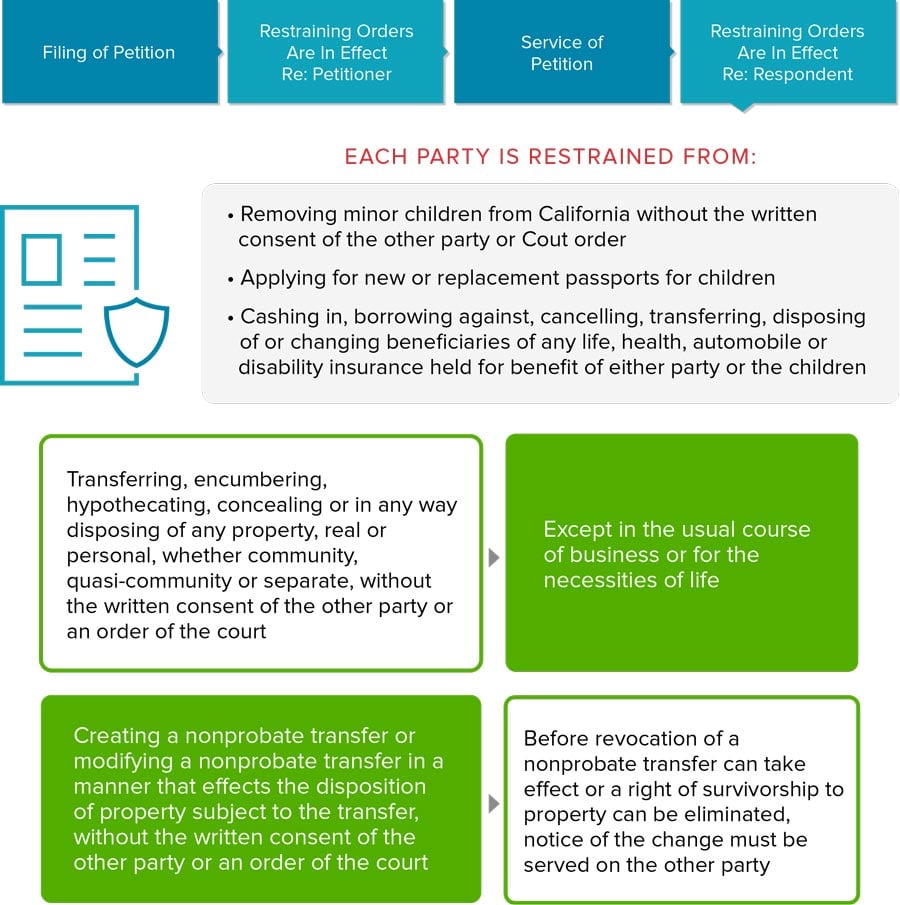
Standard Family Law Restraining Orders
Standard Family Law Restraining Orders are set forth in the Dissolution of Marriage Summons. They apply to the Petitioner upon filing of the Petition of Dissolution and to the responding party, Respondent, upon being served with the Petition. The orders remain in effect until the final judgment is entered, the Petition is dismissed or further order of court.
The filing of a Petition for Dissolution or Legal Separation results in the issuance of Standard Restraining Orders.
These restraining orders are designed to maintain the status quo during the pendency of the case.
Standard Restraining Orders are not designed to freeze bank or brokerage accounts. Violation of these orders sets the violator up for a breach of fiduciary duty claim.
Can a Domestic Violence Action Have Significant Impact on a Party in a Divorce Case?
Domestic violence actions are filed in the family law courts under the Domestic Violence Prevention Act (DVPA). Courts have differing views as to what constitutes domestic violence, and thus it is critical to avoid any conduct that could potentially be construed as domestic violence. A finding of domestic violence may impact a court’s orders regarding spousal support, child custody, child support, and attorney’s fees. Additionally, a finding of domestic violence often leads to a presumption that the perpetrator is the “bad party.” Making false allegations of domestic violence is a bad strategic decision, and may backfire resulting in severe consequences.
What is a Date of Separation?
The date of separation is essentially the end of the relationship. The length of the marriage is the period between the date of marriage, and the date of separation. The date of separation may be relevant to a number of issues in a divorce. A business may be valued at either the date of separation, or at trial. Earnings after separation are separate property, and debts incurred after are separate debts.
Understanding what is required to establish a date of separation may be extremely helpful in avoiding or minimizing litigation costs involving the determination of the date of separation.
Is it Relatively Easy to Predict What Will Occur in a Custody Battle?
Child custody orders include awards of physical custody and legal custody. The courts have wide discretion when making child custody awards and thus the results are not predictable with any degree of certainty. The courts are guided by the child’s best interest in making initial custody orders. Modification of final child custody orders generally requires a change of circumstances. Custody mediation is required before a hearing or trial may proceed.
In What Courts Are Paternity Cases Heard?
Parentage litigation occurs in the family law courts and the issues are determined using statutes, case law and a number of very important presumptions.
Parentage litigation includes a determination of paternity, child support and child custody.
Is There a Statute of Limitations Issue in Paternity Matters?
Statutorily designated persons have two years from the date of birth to attempt to rebut the conclusive presumption with genetic testing. The designated parties include:
- The husband;
- The presumed father;
- The child through a guardian Ad Litem; and
- The mother, if the biological father has filed an affidavit acknowledging parentage of the child.
Parentage may be established by a father executing an approved voluntary declaration acknowledging parentage. This is also known as the Paternity Opportunity Program (POP). The declaration has the same force and effect as a Judgment of Paternity.
Unless the POP is set aside, it prevails over the conclusive presumption.
What is a Voluntary Declaration of Paternity?
A voluntary declaration (P.O.P.) is invalid if:
- The man signing the declaration was a semen donor (Family Code section 7613(b)); or
- The child had a presumed parent at the time
The Family Code section 7611 rebuttable presumption of paternity is established if:
- The child is born during the marriage of the mother and the presumed father or within 300 days after the termination of the marriage by death, annulment, declaration of invalidity, divorce, or judgment of separation. There are additional provisions relative to establishing the presumption related to attempted marriages that are or may be invalid (Family Code sections 7611(b), 7611(c); or
- The presumed parent receives the child into their home and openly holds the child out as their own.
What is Guideline Child Support?
Guideline child support is calculated with the use of a computer program that requires the input of a number of factors. The most significant of which are custodial time-share and income (as defined by the Family Code).
The purpose of child support is to provide a level of support that allows the child to share the parent’s economic station in life.
Is Spousal Support Another Name for Alimony?
Spousal Support (sometimes referred to as alimony) is money paid by one spouse to the other based on the payor’s ability to pay and the payee’s needs. Spousal support orders address the amount and duration of the payments.
Spousal support may be payable before the entry of the judgment (temporary support) and after the entry of the judgment (permanent support). The orders are generally modifiable based on a change of circumstances.
How is Spousal Support Generally Structured?

The Ostler-Smith Order
Spousal support may be structured in a variety of ways to address the needs and circumstances that exist at the time the order is made. Generally, the payments are paid monthly in equal amounts; however, they may be structured with two components: 1) monthly payments, based on the payor’s base income and 2) periodic support payments equal to a percentage of fluctuating or supplemental income that exceeds base income received periodically by the payor. The second component, called an “Ostler-Smith” order, may be appropriate where the payor’s income fluctuates.
How Can One Party Transfer Separate Property Assets to the Community or to the Other Party?

Transmutation
In order to change or transmute the character of property from separate to community, community to separate, or separate property of one spouse to separate property of the other spouse, there must be a written express declaration executed by the party adversely affected. The statement must be specific as to the item being transmuted. A promise by one party by itself, to transmute, transfer, or give an asset to the other party or the community does not result in a legal gift or transmutation.
What is the Difference Between Separate Property and Community Property?
California is a community state and as such, community property is defined as an asset acquired after the date of marriage and prior to the date of separation unless acquired by way of inheritance or gift as it is defined by California law.
Separate property is defined in California as an asset owned prior to the date of marriage, acquired after the date of separation or acquired after the date of marriage and prior to the date of separation by way of inheritance or gift as it is defined by the California Family Code. Income, rents and dividends generated by separate property are separate property.
What is Required for One Spouse to Give a Valid Gift to the Other Spouse?
It is said that it is more difficult to give a spouse a gift than to give a gift to any other person. To be valid, gifts between spouses must meet the specific qualifications of the California Family Code. A clear intention by itself to give an item to a spouse does not overcome the requirements of the Family Code. In other words, a person may physically give a gift to the other party and intend the act to be a gift, and yet no gift would have been made. There are no restrictions relative to gifts of wearing apparel, jewelry, or other tangible articles of personal nature solely or principally used by the recipient spouse that are not substantial in value considering the economic circumstances of the marriage.
A vehicle of any price cannot be characterized as a gift in that it is not a tangible article of a personal nature. Whether items of art or furniture are items solely or primarily used by one spouse depends on the specific facts.
What is the Objective of Discovery in Family Law?
Parties to litigation are permitted to discover relevant facts and information through several different tools. These tools allow the parties to gather information that may be necessary to prove their case in a trial or to assist in reaching a settlement. Discovery is intended to minimize surprises at trial and to promote the possibilities of settlement.
Parties to a California divorce have a fiduciary duty to voluntarily share all known material facts and information regarding characterization and valuation of all community and separate assets and debts with the other party.
Discovery may also be conducted formerly pursuant to the California Code of Civil Procedure. The Code has very specific provisions which must be followed in order to obtain the requested information and documents. These infographics illustrate a number of different tools that are available in formal discovery. If the responding party fails to comply or partially complies with the request there are specific rules that must be followed to force compliance and request attorneys fees and/or sanctions from the non-complying party.
What is Electronically Stored Information?
Digital Evidence Land: Discovery in family law often includes an analysis of electronically stored information (ESI) — information (data) that is stored electronically, rather than in a physical form, and that includes:
- Information captured, created, communicated, manipulated or stored on hardware such as computers, voicemail systems, digital cameras, GPS systems, smartphones (e.g. text messages, emails, instant messaging, social media posts, etc.) and other smart electronic devices, and information stored within software (e.g. word processing and accounting software); and
- The meta-data (data that describes other data) associated with the underlying electronically-stored information. In fact, paper documents are most commonly only visual representations of the ESI that has been captured and printed.
Is There a Penalty for Misappropriation in a Family Law Action?
Misappropriation is the using of community property for purposes that do not benefit the community. Married people are in a confidential relationship with each other and have fiduciary duties to one another that are set out in the Family Code, Corporations Code, and in case law. Depending on the facts, a party may be charged with the loss to the community of the funds misappropriated, as well as penalized with harsher financial sanctions.
Do Parties Owe Fiduciary Duties to Each Other in a Divorce?
Fiduciary duties require each party to act with the utmost good faith toward the other in the disclosure of all relevant material facts and information regarding both community and separate property assets and debts. There may be harsh penalties for breaching these duties.
How Are Furniture and Furnishing Divided in a Divorce?
Family law courts are reluctant to spend their limited time and resources dividing furniture and furnishings. Courts are impacted due to budget constraints and simply do not have the resources to address these issues. Parties usually know the relative value (garage sale prices are generally used) of their furniture and furnishings and which items they value more than others. Generally, parties are able to agree upon a division of these items without the assistance of counsel or appraisers.
Under What Circumstances Are Reimbursements Granted to a Party in a Divorce?
Reimbursements in California divorces are determined by specific statutes and case law. Reimbursements are not granted based upon a sense of fairness. Fairness alone is not the determining factor, although fairness is inherent in the logic relied upon in many cases and statutes. If a right to reimbursement is not provided for in a statute or in a case, it cannot be granted by the family law courts.
There are a number of exceptions, nuances and gray areas in this area of the law. Reimbursements and credits may require determining:
- When the money was spent
- Who spent the money
- For what was the money used
- Whether the asset acquired still exists
- Whether any money spent on an asset caused the asset’s value to increase
- Whether the money spent was community or separate
- Whether the expenditure was a misappropriation or a breach of fiduciary duty
- Whether an asset was used by one party after separation
- What was the value of the use
Under What Circumstances is the Community Reimbursed for Community Funds Used to Pay for the Educational Expenses of One Party?
California divorce law provides for reimbursement plus interest to the community if community funds were used for the education and/or training of one spouse – in limited situations.
The community estate may be reimbursed for community contributions, plus interest, to the cost of the education or training of a spouse that substantially enhanced that person’s earning capacity.
An exception to the reimbursement exists where:
- The parties agreed, in writing, to no reimbursement; or
- The community contributions were for ordinary living expenses that would have been incurred regardless of whether or not the party was attending school.
If an educational loan is outstanding at the time of the divorce, it is assigned to the spouse without offset unless there is a written agreement to the contrary.
The court has the discretion to reduce or modify the statutory reimbursement and assignment of educational loans to the extent circumstances render such a disposition unjust for the following reasons:
- The education or training enables the spouse to engage in gainful employment that substantially reduces the need of the party for support that would otherwise have been required.
- The education or training received by the spouse is offset by the education or training of the other spouse.
- When the community has substantially benefited from the education, training, or educational loan.
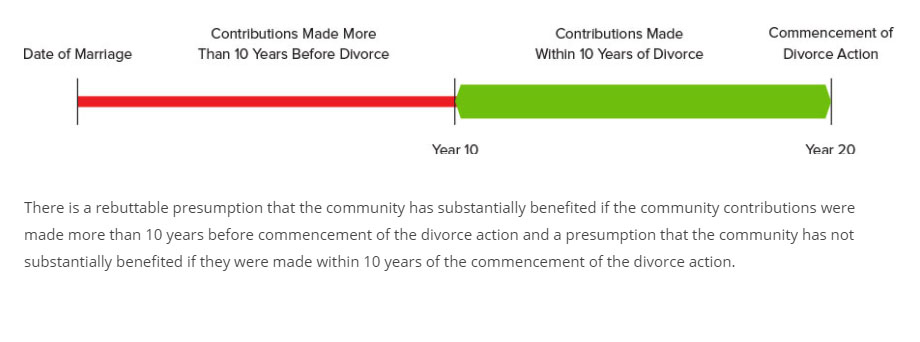
Rebuttable Presumption
How Are Personal Injury Proceeds Divided in a Divorce?

Personal Injury
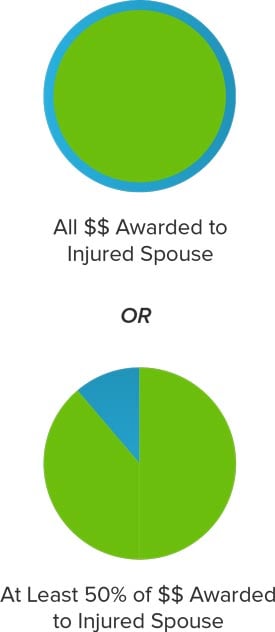
Personal Injury
Personal injury proceeds arising out of an incident that occurred prior to the date of separation are characterized as community property but are often treated as the separate property of the injured spouse in most situations.
Personal injury awards are characterized as community property in California divorces, if the injury occurs before the date of separation. Generally, the date of the receipt of the funds is not relevant to the characterization, and the proceeds are assigned to the injured party as if they were separate property. However, the divorce court does have the discretion to award a portion of the proceeds to the community. Courts take the following issues into consideration: the economic conditions, needs of each party, time elapsed since the recovery of the damages, the date of the injury, and any other relevant factors.
An allocation of a portion of proceeds to the community may occur if the community or the other spouse paid unreimbursed medical bills related to the injury or if there are lost wages related to the injury.
If the personal injury proceeds have been commingled with community funds, the injured party may still be awarded the proceeds, if the proceeds can be traced using family tracing principles that are somewhat relaxed when tracing personal injury proceeds.
How is Life Insurance Valued in a Divorce?
Life insurance is an often overlooked asset in divorces. It may or may not be a significant issue but it most certainly should not be overlooked.
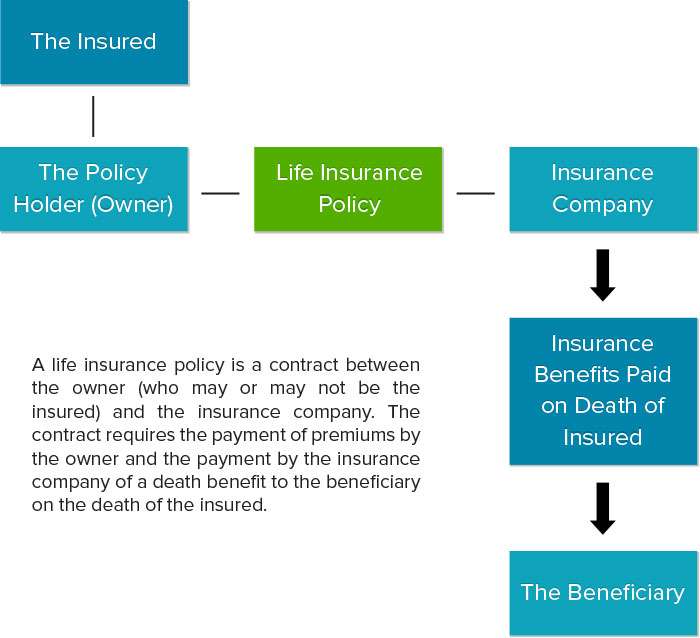
Life Insurance
How Are Annuities Addressed in a Divorce?
Annuities generally fall into two categories: deferred and income.
Tax deferred annuities are generally a part of future retirement planning. Withdrawals of taxable sums are subject to ordinary income tax. There are two different types of deferred annuities: deferred variable annuities and deferred fixed annuities. The owner of a deferred variable annuity has the option of investing the funds in a variety of investments, but with this option comes market risk.
Income annuities are utilized to generate income after retirement and offer a guaranteed income for life or for a set period of time. Immediate fixed income annuities provide for immediate guaranteed income and some annuities offer provisions that avoid market risk. Deferred income annuities have the same provisions as the immediate fixed income annuities except the payments commence on a future date.
Many annuities cannot be divided between the parties and must be awarded to one of the parties or terminated.
How Are Retirement Plans Characterized in a Divorce?
California family law courts generally allocate retirement plan benefits between separate property and community property according to when the benefits were earned. Benefits “earned” during the marriage (after the date of marriage and before the date of separation) are generally characterized as community property. Benefits “earned” before the date of marriage or after the date of separation are generally characterized as separate property.
See our Retirement Plan Valuation and Characterization Practice Area Page
What is a Defined Benefit Plan?
Defined Benefit Plans are retirement plans that generally provide for specific benefits, commencing at a specific age or date, and are payable for a defined period of time (e.g. $6,000 per month, commencing at age 55, and payable until death). This type of plan is valued by an actuary who calculates the present value of future payments using various assumptions and discounts. Generally, the assets of the plan are not relevant to the value of the individual’s benefit.
What is a Defined Contribution Plan?
A Defined Contribution Plan is a plan that allows for a specific dollar contribution to be made into the plan annually. The plan functions somewhat like a savings account and its value is dependent on the investment performance of the assets of the plan. Examples of these plans would include 401(k), IRA, SEP IRA, profit sharing plan, etc. An actuary is not needed to value this type of plan because the value of these plans are reflected on the current plan statement. The money contributed into these accounts, after the date of the marriage and before the date of separation is generally characterized as community property, and the gains or losses on community assets in a plan, take on the character of the underlying assets, regardless of when the gains or losses occur.
The terms of a Defined Contribution Plan define the “contributions” that are made into the plan.
Is Real Property Characterized in the Same Way Other Assets Are Characterized in a Divorce?
Divorce courts may award community real property to either party or order it sold. Real property is characterized as community property or separate property using the same principles that apply to other types of assets, meaning that real property property acquired during the marriage is generally community property. The family law cases and statutes dictate the rights to reimbursement and equitable apportionment of real property.
Real Property Issues and Factors
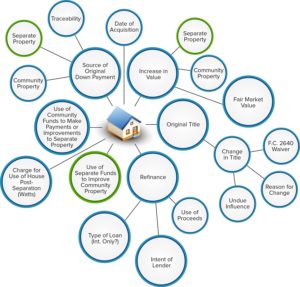
Can the Community Acquire in the Real Property of One Party During the Marriage?
California family law dictates that the community may acquire an interest in real property if community funds are used to make principal payments on a mortgage secured by a residence owned solely by one spouse. (IRMO Moore / IRMO Marsden) The interest is a combination of the amount of the principal pay down on the loan and a pro-tanto interest in the increase in the value of the residence.

Community Money Used For Separate House
How is Tracing Used in Family Law?
Tracing may be used to characterize bank or brokerage accounts. It may also be used to trace separate funds used to purchase an asset that is titled in joint names. Tracing is also used relative to certain reimbursements to the separate property of one spouse or to the community.
There are three ways that tracing can be accomplished:
- Direct Tracing (Mechanic)
- Family Expense, Recapitulation
- Other Non-Speculative Methods
Additionally, tracing may be used to trace personal injury proceeds deposited in joint accounts and this tracing may have more relaxed tracing requirements for equitable reasons.
See our Characterization and Division of Complex Assets Practice Area Page
How Are Businesses Handled in a Divorce?
One of the most complex areas in family law is the valuation of a business interest and the determination and calculation of any equitable apportionment or right to reimbursement relative to any increase in value of a business that was owned by one party before the date of marriage.
The court may award the business to either party and, although rare, it may order it sold or award it to the parties jointly. The valuation of a business generally requires the services of a valuation expert.
In a Divorce, May the Community Have a Right to Reimbursement for a Portion of the Increase in Value of a Separate Property Business?
If the owner-operator was paid adequate and reasonable compensation during the marriage, there will be no reimbursement to the community under the Van Camp approach. If the owner-operator was under-compensated but the business distributions used for community expenses exceeded the amount of the under-compensation, the community will likewise not be entitled to any reimbursement.
Using the Pereira approach, the owner-operator of the separate property business receives an investment rate of return on the value of his or her business as it existed on the date of marriage, and the remaining portion of the increase in value is reimbursed to the community.
If the Community is to be Compensated Relative to an Increase in Value of a Separate Property Business is it a Right to Reimbursement or a Right of Ownership?
The community may be reimbursed for a portion of the increase in value of one party’s separate property business using the Pereira approach, the Van Camp approach, or another equitable approach. Any benefit to the community will be a reimbursement, not a right of ownership.
Why Do Family Law Courts Make Attorney's Fee Awards?
In an effort to level the litigation playing field, a family law court may order one party to pay all or a portion of the other party’s attorney’s fees, expert fees, and costs. One key focus is determining whether the fees incurred were reasonably necessary in the handling of the case. In order to make a fee award, a court must find that one party has a need, the other party has an ability to contribute, and that there is a source from which the fees may be paid.
The conduct of each lawyer and each party is relevant to the fee issue. Courts take into consideration each party’s level of cooperation and related issues in fashioning a fee award. Bad faith and uncooperative conduct may impact the amount of a fee award and it may even result in a financial sanction award against a party.
Can Family Law Courts Order One Party to Pay the Other Party's Attorney's Fees?
A party may be sanctioned pursuant to Family Code section 271 or Family Code section 2032(b) [soft sanctions] for bad faith conduct, breach of fiduciary duties, lying, misrepresentations, excessive settlement demands, frivolous conduct, failure to comply with local rules, conduct that increases the cost of litigation, unprofessional or uncivil behavior, harassment, failure to cooperate or obstreperous conduct may result in a sanction order.
Sanctions may be granted pursuant to Code of Civil Procedure sections 128.7 and 128.5 against an attorney or a self-represented party if:
- The pleadings submitted to the family law court are for an improper purpose, such as to harass, cause unnecessary delay, or to needlessly increase the cost of litigation
- The claims or defenses are not warranted by existing law
- The allegations do not have and are not likely to have evidentiary support
- The denials of factual contentions are unwarranted
Is Tax Relevant in a Divorce?
Tax Issues
Tax issues may impact the true value of many assets and they may impact decisions relative to the desirability of an asset. Tax issues related to these issues and assets should be analyzed early in the case and cannot be ignored.

Tax issues cannot be ignored. Often tax issues are not identified until it is too late to avoid the consequences, manage them, or structure around them. Tax is yet another area of sophistication that must be addressed in family law matters. Tax plays a role in many, if not most, family law cases. Family law involves income and assets that frequently have tax related issues.
Are Evidentiary Objections and Privileges Relevant in a Divorce Trial?
Family law trials, like civil litigation and business litigation are controlled by the Code of Civil Procedure and the Evidence Code. The parties, witnesses and frequently expert witnesses are called to testify.
Like in all types of litigation, lawyers must have a strong command of the rules of evidence, presumptions, and privileges in order to present their case to the court.
What Role Do Experts Play in a Family Law Matter?

The Potential Family Law Team
In family law matters, the attorney establishes the strategy and executes the plan, but experts often play a critical role in the success of the case. As with lawyers, all experts are not created equal which makes it critical to retain the right expert. An incompetent or unqualified expert can destroy a case.
What Type of Experts Are Utilized in Family Law Matters?
Divorcing parties can agree to divide assets, resolve issues, and settle their differences on almost any basis they choose. However, if they do not settle their conflicts, they may end up in a courtroom. Litigation may involve the testimony of experts. In family law, an expert is an individual who has special knowledge, skill, expertise, training, or education that makes the expert’s opinions helpful to a family law court on a contested issue. Experts are almost mandatory in certain situations. The qualifications and credibility of an expert can be critical to the weight given to the expert’s opinions by the divorce court. The early retention of an expert may be of significant value in trial preparation and may significantly enhance the chances of a favorable settlement.
Courts may not allow experts to testify using case specific hearsay as the foundation for their opinions. This rule may prevent experts from testifying to matters that previously were common place. For example, if an expert attempts to render an opinion based on financial records when the issuing institution has not retained the specific records being relied upon, the expert will likely be prevented from testifying about the contents of the records. This problem is not solved simply because the party has possession of the original bank statement, canceled check, or other document in that those documents would be hearsay. The documents must be subpoenaed from the institution directly into court in order for the expert to testify to their contents. This problem could be fatal to an issue and the case.